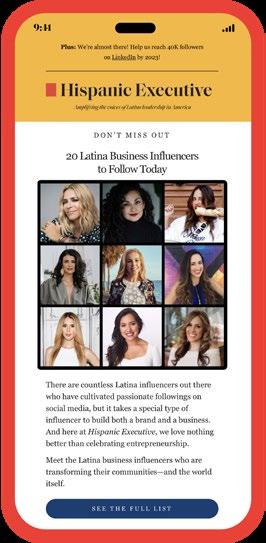With a global spotlight on her every case and step, famed Attorney Camille Vasquez focuses on supporting her clients and her work as partner at Brown Rudnick

ALL EYES ON







With a global spotlight on her every case and step, famed Attorney Camille Vasquez focuses on supporting her clients and her work as partner at Brown Rudnick

ALL EYES ON











If there is one thing Latinos agree on, it is the importance of education. These executives take us beyond academics and degrees to shed light on new frontiers of learning for all.


Mara Giorgio has been adapting to change all her life, making her more than ready to take on the fast-paced world of Airbnb
Galderma’s Silvina Nordenstohl is focused on cultivating a healthy culture and collaboration at the company’s new Texas HQ
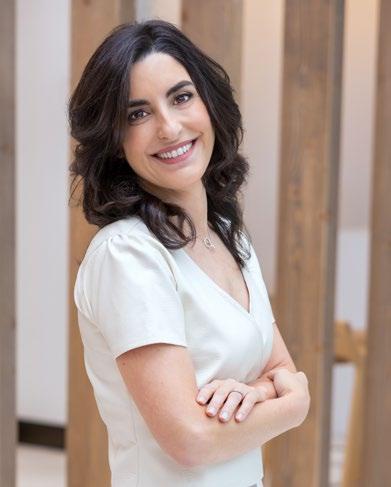
Manuel Padilla is a risk management pro at MacAndrews & Forbes and he wants more Latinos to enter his profession

Alex Quevedo shows that a commitment to helping provides opportunity to evolve and grow as a leader at ADP
Lorena Peñaloza turns her legal expertise into a cornerstone for better communities at UC Riverside
Joe Mella has learned many lessons over his nearly four-decade tenure with Goldman Sachs. The biggest? Courage, commitment, and an adventurous spirit brings results.
“EDUCATION IS THE ONE THING THEY CAN’T TAKE AWAY,” say many of the wise Latinos who still carry the wounds of economic breakdown and authoritarianism. As hundreds of thousands of Americans are laid off from their jobs and my LinkedIn feed fills with “open to work” posts, I can just hear our tios and abuelitas telling us, “at least you have a college degree.”
Much of my own education as a Latina was about the degrees, the awards, and “catching up” to my peers. I’ve worn my education as a protective armor and proof that I earned my seat at the table. But this fear-based approach downplays the risks of putting all of our eggs in the basket of traditional education: the crippling student loan debt, the opportunity cost of not working, the sunk costs of careers changes, and the technological advances making more and more careers less profitable or altogether obsolete.
This is not to diminish the role of education in Latino prosperity, or to advise against pursuing an education. It is simply a reminder that education is not fool-proof. That it is not the degrees that keep us safe, but rather our ability learn new things, constantly.
Michele Cantos Garcia Managing Editor of Hispanic ExecutiveIn the Lifelong Learning issue, we invite you to reflect with us on the true value of an education and to reimagine its future. Matthew Whitworth-Howe (p.128) from L’Oréal USA Professional shines a light on the first collegiate degree program for beauty professionals and challenges the stigma that beauty is a less noble vocation. After finding himself with an overwhelming $100,000 dollars in student loan debt, Chipper Founder and CEO Tony Aguilar (p.135) launched a loan management application to help graduates manage and “chip away” at their debt. And, as chief legal counsel at UC Riverside Lorena Peñaloza (p.122) reminds us that

universities are microcosms of America and that advocating for policies that opens doors for more Latino and Chicano students and administrators at these institutions can have ripple effects on society at large.

And this brings me to our cover star: Brown Rudnick Partner Camille Vasquez (p.106), one of the most recognizable Latina attorneys as of late. While she touches on her unexpected fame after her impressive litigation in the viral Depp v. Heard trial, Vasquez also opens up about moving back home with her parents after college and the financial constraints that marked the early days of her career. Yes, she is comfortable in the global spotlight today, but she is not the Harvard or Yale graduate the media comes to expect when they meet an outstanding Latina. In her own words, she tells us, “I was able to accomplish something on a national stage when people might have not thought of me as the first choice for the job.”
Her ability and willingness to learn new things is most evident in her being a “student of style and communication” who studies and emulates others and which, no doubt, helped her land her latest gig (at the time of this writing in early 2023) as legal analyst for NBC News. And her ascent is an excellent case study in how our education may get us the job, but it’s up to us to seize the opportunity and spin it into gold. It’s why I’m personally excited to see the world, not just America, embrace a Latina in all her glory. For who she is on and off the courtroom. For being not just educated but also interesting.
So, I propose an update to the old adage, one for the modern era that we can pass down in our own families: they one thing they can’t take away is your ability to learn something new.
Aptly set in a Los Angeles studio, Senior Photographer
Cass Davis prepared a sophisticated, bright, and polished set to photograph
Attorney Camille Vasquez.

Working alongside Makeup
Artist Mel Mestas, Hair Stylist Sophia Porter, and Photo Assistant Michael Arellano, the team was able to capture the glamour of Hollywood and the sophistication of Vasquez's law practice. Designer Arturo Magallanes paired the photograph with an elegant, refined wide serif. Thin whisks of scribbles mirror the photo’s joie de vivre and movement while also emphasizing the notorious research and note-taking of the legal profession.
Masthead
Editorial Director
Frannie Sprouls
Managing Editor
Michele Cantos Garcia
Senior Editors
Melaina K. de la Cruz
Brittany Farb Gruber
Editors
Julia Thiel
Kathy Tun
Staff Writers
Noah Johnson
Billy Yost
Contributors
Zach Baliva
Zachary Brown
Marcos Chisholm
Frank DiMaria
Peter Fabris
Will Grant
Frederick Jerant
Natalie Kochanov
Rebecca Rakowitz
Claire Redden
Connor Shiosita Pickett
Designer, Hispanic Executive
Arturo Magallanes
Senior Designer
CEO & Publisher
Pedro A. Guerrero
President, Group Publisher
Kyle Evangelista
Chief of Staff
Jaclyn Gaughan
Senior Directors, Sales
Justin Davidson
Hannah Tanchon
Director, Sales
Kemp G. Pile
Enterprise Sales Executive
Stuart Ziarnik
Lead Recruiter, Guerrero Search
James Ainscough
Senior Director, Corporate Partnerships & DEI Solutions
Krista Horbenko
Head of Digital
Aleksander Tomalski
Director, Talent Acquisition & Engagement
Haylee Himel
Talent Acquisition Managers
Hispanic Executive® is a registered trademark of Guerrero, LLC
Vince Cerasani
Designers
Anastasia Andronachi
Rebecca Kang
Senior Photo Editor & Photographer
Sheila Barabad Sarmiento
©2023 Guerrero, LLC. guerrero.co
1500 W. Carroll Ave., Suite 200 Chicago, IL 60607
Photo Editor & Staff Photographers
Cass Davis
Steven LeFlore
Contributing Photo Editor
Sarah Joyce
Facebook: @hispanicexecutive

LinkedIn: @hispanic-executive
Twitter: @HispanicExecMag
Instagram: @hispanicexecmag
YouTube: bit.ly/youtubehemag
VP, Hispanic Division and Head of Audience & Engagement
Vianni Lubus
Director, Events
Jill Ortiz
Events & Marketing Manager
Ashley Parish
Communications & Engagement Manager
Cristina Merrill
Reprints
Reprinting of articles is prohibited without permission of Guerrero, LLC. Printed in China. For reprint information, contact Reprints & Circulation Director
Stacy Liedl at stacy@guerreromedia.com.
Social Media Manager
Suleidys Tellez
Josie Amidei
Jordyn Gauger
Sales Trainer
Shannon Borner
Content & Advertising Managers
Allison Kolosick
Roman Magallanes
Max Martinez
Annie Peterson
Alejandro Vences
VP, Finance
David Martinez
Director, Circulation
Stacy Liedl
Staff Accountant
Natallia Kamenev
Senior Director, Client Operations
Cheyenne Eiswald
Account Manager
Abigail Stern
Senior Manager, Client Services
Rebekah Pappas
Manager, Client Services
Brooke Rigert
Office & Operations Coordinator
Sydney Churchill
Industry Partners
Have you ever gotten frustrated at someone who doesn’t know the difference between “año” and “ano”? Have you gotten offended at a Hispanic colleague who showed up late to your party, or wondered what the heck is up with all the new Latinx/Latine variants?
If so (or if you’re simply looking for a bit of a laugh), check out Laura Martínez’s new Hisplaining column. She began writing the column in 2022 to help today’s leaders smoothly navigate the multicultural business world, and Hisplaining has quickly become a favorite of our readers. But be warned—this column is handled with a serious dose of humor.

“Let
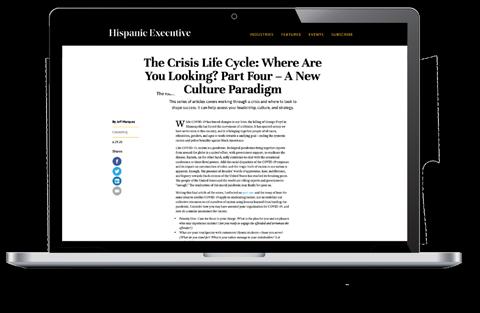
—Jeff Marquez, Publisher’s Circle Contributor, “The Crisis
Cycle: Part Four”
“We may be overwhelmed by the convergence of multiple crises, or unsure of exactly what to do, and that’s OK. What it means, though, is that you have to ask a lot of hard questions and not pretend to have the answers.”
—Javier Saade, Publisher’s Circle Contributor, “The Time Is Now. The Year Is 2020.”
No industry prides itself more on serving the customer than hospitality. These executives share their insights into the peoplecentric field and its future.
Thirty years ago, Efraín Pérez Agosto fell into an entry-level gaming job. Now he’s leading as CFO for MGM National Harbor, an important MGM Resorts International property near the nation’s capital.
By Zach Baliva
THE EIGHTEEN-YEAR-OLD WOULD WORK night shifts with his friends. They finished at 4:00 a.m., rode home together, grabbed food, put something on the TV, and dealt cards until daybreak. Efraín Pérez Agosto wasn’t part of some strange sunrise poker game or after-hours secret society—he was practicing his craft.
Today, Pérez Agosto is MGM National Harbor’s vice president and CFO. Back then, he was making his humble entry into the world of hospitality and gaming as a croupier in his native Puerto Rico.
It all happened, quite appropriately, by chance. Pérez Agosto didn’t set out to launch a career in a casino. He simply accompanied a friend who wanted to apply for a position in a new property. He decided to apply too. Pérez Agosto got a job; his friend did not.
At first, he was in dealer school. Before long, his entry-level colleagues weren’t just practicing shuffling and dealing at home.
They had a series of table games laid out in the apartment and spent countless hours memorizing lingo, calculating payouts, and learning how to handle chips.
It didn’t take long for Pérez Agosto to see his future in gaming. “What I thought would be a side job to help me pay for college slowly turned into a wonderful career,” he says. The realization led him to pause his formal studies and move to the US mainland to manage table games for Rising Star Casino Resort in Indiana.
Pérez Agosto stayed with the organization for more than sixteen years. During that time, he returned to the classroom to earn a bachelor’s degree in business and a master’s degree in finance. In 2017, after a four-year stint with Caesars Entertainment in Cincinnati, Ohio, Pérez Agosto joined MGM Resorts. It was the hospitality company’s reputation that first attracted him. “MGM Resorts is known to give employees the
opportunity to grow and develop, and it also cares about diversity,” he says. “I wanted to become a CFO, and I wanted to do it in a place that values me for who I am.”
Achieving the lofty goal of reaching a top finance spot wasn’t easy, especially for someone with a nontraditional background. Unlike his industry counterparts, Pérez Agosto isn’t an accountant and hasn't logged decades at one of the big three firms. He worked his way up through the cages, count rooms, and credit rooms of casinos throughout the country.
While some people may have seen this as an obstacle, Pérez Agosto turned it into an asset. “My background in casino operations helps me really understand the challenges people face in this industry and how I can help partner with the business to guide them in certain strategic ways,” he says.
After improving controls, reducing cash holdings by 30 percent, and stacking up
other wins, Pérez Agosto reached his goal of becoming CFO of the MGM National Harbor luxury resort and casino in April of 2022. Now, he manages financial teams that oversee the casino, hotel, restaurants, theater, retail stores and more. He also covers financial planning and analysis, casino finance, labor management, procurement and inventory control, technology, compliance, and risk management.
A diverse team driven by MGM Resorts International’s overall commitment to diversity, equity, and inclusion (DEI) helps the leader thrive and make a difference. More than 30 percent of the company’s US workforce is Hispanic, and a partnership with Blue Wave International Supplier Development Platform helped leaders create an eight-month curriculum for minority-owned businesses and Hispanic Business Enterprises (HBEs) in gaming. MGM Resorts has graduated six cohorts and aims to put a total
MGM National Harbor
OPENING DATE
December 2016
TOTAL COST
$1.4 billion
GAMING
160,000 square feet
TABLE GAMES
150+
POKER TABLES
45 SLOT MACHINES
2,200+
HOTEL
24 stories, 308 guest rooms
THEATER CAPACITY
Nearly 4,000
PAST HEADLINERS
“
What
of 150 companies through the program by the end of 2025.
Pérez Agosto uses the same approach as he leads the finance department. “I’m building an intentionally diverse team because diverse perspectives help you succeed in a high-pressure space like hospitality and gaming,” he says. “We have a culture where I don’t always have to be right. People will challenge me, and we can all keep a willingness to collaborate, learn, and try hard together.”
In recent years, MGM Resorts increased DEI initiatives across their thirty-three domestic and international properties and built more robust employee resource groups. That’s given Pérez Agosto a greater opportunity to increase his personal involvement.

He is now part of a “Courageous Conversations” program built to help MGM Resorts find new ways to promote internal and external inclusion. Pérez Agosto and other leaders, including MGM Resorts President and CEO Bill Hornbuckle, work with their corporate social responsibility committees to share their views and experiences in dialogue with colleagues. It’s just one of many ways Pérez Agosto is giving back to his community. He also volunteers to help students create budgets, plan for emergencies, and increase their financial literacy.
After more than three decades in the industry, Pérez Agosto is ready for more. The property has only been open since 2016, and the veteran leader is betting that its best days are in the future.
FOR ALL MGM Resorts is committed to fostering a Diverse and Inclusive workplace and community.
Mara Giorgio, has been adapting to change all her life, making her more than ready to take on the fast-paced world of Airbnb
By Natalie KochanovWHEN MARA GIORGIO ARRIVED ON campus at Trinity College, she had to adjust to not just a new school, but a new country. She had moved to the US for college, after spending the first eight years of her life in Argentina and the next ten in Mexico.

“Having to move from one place to another, reinvent myself, and adapt to all of those changes growing up, it made me crave and thrive on change,” Giorgio says. “Every time I applied to a new job, I made it clear that I could adapt quickly and think through things from different angles and different viewpoints because of my upbringing.”
Giorgio certainly needs to think on her feet in her current role, as associate general counsel at short-term rental platform Airbnb. From her seat in the organization’s legal risk and regulatory team, she advises on issues both local and global with her policy expertise, international experience, and passion for travel to guide her.
Giorgio’s initial focus at Trinity was premed, but she soon reconsidered her career direction. “I took a prelaw constitutional law class about women’s rights, and I found it fascinating,” the lawyer says. “I got really into looking at arguments and uncovering every rock to figure out how to guide our society in applying the laws that are in place.”
With her constitutional law professor’s encouragement, Giorgio went straight from college to law school. She joined Squire Patton Boggs as a summer associate and discovered policy work during her first full year at the firm. “I like building consensus,” she says. “So the idea of talking to people in Congress and the federal agencies and trying to iterate and arrive at a place of mutual agreement was right up my alley.”
While at Squire Patton Boggs, Giorgio leveraged her Spanish fluency to broaden the scope of her work, including into international matters. She further expanded her portfo-
lio at Steptoe & Johnson, where she focused on the lobbying and policy issue within the financial services industry.
Her jump to Steptoe also brought her to a professional crossroads. “I ended up taking a six-month trip around the world with my husband,” she explains. “It was a lot of fun. We stayed at a ton of Airbnb listings, and of course that piqued my interest in the travel industry.”
By the time she returned from her trip, Giorgio had started to envision a path that would allow her to connect her joint interests in travel, law, and policy. An opening at Airbnb proved to be the perfect fit. “Obviously my day-to-day work at Airbnb is not travel, but it’s nice to work in an industry where what you’re passionate about is what you’re helping forward,” she says.
In her five years at the company, Giorgio has helped Airbnb navigate, and strategize in response to, emerging regulatory issues,
Mara Giorgio Associate General Counsel Airbnbfrom consumer, content moderation, and privacy laws to those specifically targeting the short-term rental space. “Short-term rental laws are fairly new, which makes my job really exciting. I’m there in the trenches trying to figure out what makes sense from a multiple-stakeholder perspective,” she elaborates.
Sometimes, that means narrowing in on a particular city where short-term rental regulations are under discussion. Other times, Giorgio needs to collaborate with colleagues around the world to monitor and analyze laws applicable to broader regions, as in the case of a recent short-term rental proposal by the European Union.
What’s more, Giorgio has assisted in bringing actual regulators into the conversation through the launch of Airbnb’s City Portal, a platform that
honor! As Airbnb’s political law counsel, we provide the company with our expertise and insights on campaign finance, lobby disclosure, government ethics, and election law matters nationwide.
To subscribe to weekly updates on political law news, visit nmgovlaw.com/ee.

www.nmgovlaw.com
Buckner + Miles is a Miami-based trial law firm with a national practice and a record of successfully and zealously representing our clients. In the last decade we recovered more than $1 billion in verdicts and settlements for them.
2020 Salzedo Street Suite 302
Coral Gabies, FL 33134
T 305.964.8003
F 786.523.0485
www.bucknermiles.com
As she prepared for, took, and returned from maternity leave, Mara Giorgio gained a newfound respect for her mother’s difficult decision to stop working after the birth of her third child. “She really put us first, and what a sacrifice,” says Giorgio, who has learned to stop chasing perfection amid the challenges of balancing work and parenthood. “I will never be as good as my mom. But I will keep trying.”
facilitates collaboration between the company and the communities in which it operates.
“I advised on what the City Portal was going to look like, what shape it was going to take, and how we were going to communicate about it,” she says. “That was a pretty exciting project because it was the first time a company like ours created a portal for the regulators and the tourism organizations themselves.”
Even now that she has settled into her role, Giorgio remembers the anxieties she felt before coming onboard at Airbnb. She worried that she didn’t have the right kind of experience until it occurred to her that her
skills were just as relevant in-house as at a law firm. She urges other attorneys looking to break into the tech sector to reflect on their own transferrable skills.
“Most of the things happening in the tech industry are new for everyone,” she says. “If you can show a willingness to think creatively and adapt to change in the work you’ve done in the past, you’ll be well positioned for a job in tech.”
From there, it becomes a matter of believing in yourself and taking Giorgio’s second piece of advice. “Just go for it,” she says. “It’s definitely worth it.”
WilmerHale celebrates our friend and client, Mara Giorgio, who we admire for her legal acumen, collegiality, and unwavering commitment to creating and fostering a workplace that embraces each individual’s background, experience, and perspective. It’s great to work with you, Mara. Congratulations!“Every time I applied to a new job, I made it clear that I could adapt quickly and think through things from different angles and different viewpoints because of my upbringing.”
Treasurer Lourdes Suarez helped Carnival Corporation navigate through the COVID-19 pandemic while keeping her team motivated and connected
By Natalie KochanovLOURDES SUAREZ WAS FIRST introduced to finance as a part-time employee in the accounting department of a small R&D firm while still in college. Little did she know that she was soon to become the very first Latina to hold a management position at that firm.
“The manager at the time moved away,” Suarez explains. “I literally started my career, straight out of college, as an accounting manager with a team.”
With no prior experience as a people leader, Suarez had to learn how to manage her team on the fly—a position not unlike the one in which she found herself at the start of the COVID-19 pandemic. By then, Suarez was working in the cruise industry for Carnival Corporation, where she currently serves as treasurer. She once again had to learn in real time how to adapt to unexpected circumstances, but this time on a global scale.
Before coming on board at Carnival Corporation in 2005, Suarez held a variety of roles across different areas of accounting at Cunard, a luxury cruise line, and the Carnival Corporation brand. Still, when Corporate CFO David Bernstein invited her to join him in treasury at Carnival Corporation, Suarez admits she had her hesitations. “I literally had to ask him what treasury even did because I had no idea,” she says. “He told me not to worry because he was going to explain it to me and I was going to do great.”
Bernstein’s prediction was spot on. Suarez climbed the ranks within Carnival Corporation, while also broadening the scope of her work. “I started off as a manager and worked my way up through director, assistant treasurer, VP, and now treasurer,” she confirms. “I also led our financial technology team for four years before coming back to treasury.”
Suarez has made critical upgrades to treasury throughout her tenure at Carnival Corporation. For instance, she converted the company’s invoicing system from paper to electronic, and back in 2007, she implemented a new way for the company to pay bills across two-thirds of its brands. “We actually eliminated checks in North America, which, in 2007, was unheard of,” she says. “We’ve been at 97 percent electronic payments for over fifteen years.”

Today, Suarez focuses on financing strategy. “I spend a lot of time speaking to banks, understanding our cash flows, ensuring we’re investing our cash wisely, and working with the teams when we need to do financing,” she says. “In a nutshell, I make sure everybody has money to pay the bills. And whatever money we’re not using to pay the bills, I invest it.”
Another top priority for Suarez is setting up her team members to reach their full


potential. “I want to see people excel and grow with the organization, or grow outside the organization if that’s their career path,” she emphasizes. “I love seeing my past team members get promoted to director, even if it’s on another team or at another company.”
Suarez’s leadership style draws on the guiding principles of doing your job and doing it well, competing with yourself rather than with others, and being honest—principles that COVID-19 put to the test. “I found a challenge in keeping people motivated because the pandemic was taking a real toll on people. It added to our stress as humans, and that wove into our everyday lives and our everyday work lives,” the treasurer says.
As she and her team adapted to working from home, Suarez began to seek out ways to inject some much-needed levity into her weekly staff meetings. From experimenting with themed Zoom backgrounds to having

We help businesses grow faster and hassle free We provide complete solution for all your cloud services, let us manage all your ERP Services and you concentrate on business growth.
“In a nutshell, I make sure everybody has money to pay the bills. And whatever money we’re not using to pay the bills, I invest it.”
the industry shutdown. She helped negotiate deals to see Carnival Corporation through the early days of the pandemic— and the long months that followed.

“Over time, the world has gotten back to a semblance of normalcy,” says Suarez. “The cruise industry has had to work its way through a lot of CDC [and other] requirements, but now that those restrictions are being responsibly relaxed, it provides a better opportunity for us to resume our operations and return our service to what it used to be.”
Carnival Corporation is nothing if not resilient, and Suarez feels confident as she looks to the future. “It’s about getting back to where we were and picking up things from there,” she says. “There’s a lot of work we need to do, and I want to play my part in it.”
a part of the prestigious Tata Group of industries (India’s beloved brand) is recognized as the #1 Top Employer in the United States, Europe and Asia Pacific and #2 in LatinHow Jose L. Garcia transformed Commerce Casino’s antiquated HR approach into a well-organized and compliant group
By Frederick JerantJOSE L. GARCIA, VICE PRESIDENT AND chief human resources officer (CHRO) for Commerce Casino and Hotel, the largest card room in the world with over 240 tables onsite, has a reputation as a business dynamo. It’s well-deserved. One of his first major projects at the casino was a top to bottom revamp of its human resources department.
“Commerce Casino started as a kind of a mom-and-pop operation, and it grew much faster than anticipated,” he says. “It was into its third decade of operation when I joined in 2011, and they were still operating what was essentially a personnel department, not a true human resources function.”
Despite Commerce Casino’s offer to foot the bill for the staff’s Professional in Human Resources (PHR) and Senior Professional in Human Resources (SPHR) certifications, the majority declined and eventually found other jobs. “I had actually anticipated that situation and started recruiting among my
former HR colleagues at CareMore Medical Enterprises,” he explains.
Garcia faced other challenges, too.
A handful of employees were brazenly cavalier about flouting internal policies and management was reluctant to hold them accountable—even for basic things such as showing up on time.
“When the casino opened, its in-house counsel handled many policies and procedures, and each department had its own individual set of rules for discipline and rewards,” he says.

Garcia replaced that mishmash with standardized company-wide attendance rules, a leave of absence policy to curb the abuse of protected leaves, and a substance use policy.
The procedural side of the business underwent significant changes, as well. Commerce Casino still relied on manual systems and had no active recruiting program. Garcia introduced digital recruiting and applicant tracking systems, as well as a complete human
resources information system. “I automated as much of the routine HR work as possible,” he says, “and I’m still looking at ways to make the department more efficient.”
As an example, he offered Commerce Casino’s company-wide texting software that enables “broad instantaneous messaging.” Commerce Casino went from 2,500 employees to the handful needed for routine operations. “As the shutdown continued, we communicated with all of our furloughed employees, and were able to recall them at once when we reopened,” he says. The system is also part of the company’s recruiting efforts.
Over time, he introduced several other forward-thinking ideas to the workplace, including 24/7 HR availability. “Because Commerce Casino is open around-theclock, HR issues can arise at any time. We’re prepared to deal with those issues as they occur, rather than delaying action for hours or days,” he says.
Small businesses—the backbone of the American economy—have HR issues, too. But they usually don’t have the budget for on-site HR professionals. Enter the Garcia Consulting Group.
To help mitigate attendance problems, especially among single parents, Commerce Casino considered solutions including 24-hour childcare service. This solution was impracticable but eventually led to a partnership with Medcor that provided casino employees with onsite medical care and this proved to be the right fit.
“Together, we opened our employee care center, an on-site medical clinic for our employees regardless of their benefit status,” Garcia says. “It was originally offered during a single shift, but it worked so well, we expanded it to all three.”
The clinic is staffed by registered nurses and physician’s assistant, and under-the-weather employees can easily pop in during breaks and be evaluated for colds, flu, or other conditions. It proved to be a crucial service during the height of the COVID-19 pandemic. “It’s an expensive undertaking,” Garcia says,
“The idea came about when the owner of a local bakery asked my advice during our sons’ little league game in 2001,” Jose L. Garcia says. “Today, I focus on minority-owned businesses, but I’m available to anyone seeking help. I can offer advice, recommendations, and suggestions for process improvements.” That can include how to transition from being a cash-based business to a formal payroll system.
“I don’t do any advertising, and it certainly isn’t a moneymaker for me,” he adds, “but it’s rewarding to offer my years of HR experience to the small-business community.”
“
I’m open to pushback, even from entry-level staff, because that can lead to interesting conversations that could change my mind. ”
“but, overall, it’s an asset for everyone working here.”
He also introduced mandatory town hall meetings, where senior executive staff had a forum to share critical information with the entire employee base and where they could also raise their own questions. “It avoided filtered messaging, or ‘telephone game’ distortions,” the VP adds. And they take place in a festive atmosphere, with music, food, raffles, and other activities. “COVID stopped them for a while, but I hope to restart them soon.”
Such sweeping changes often are accompanied by a “my way or the highway” management style, but Garcia’s approach is decidedly different.
Straightforward communication is a hallmark. “I don’t want yes-men because they don’t offer me anything. I’m open to pushback, even from entry-level
staff, because that can lead to interesting conversations that could change my mind,” he said.
And he sees those conversations as evidence that his staff is thinking and growing into their jobs. “I often state an objective, and then we ‘build the road backwards’ with everyone’s input. And good ideas can lead to even better ideas,” Garcia explains.
His insistence on open communications lines carries over to Commerce Casino’s board. “Before I joined Commerce Casino, HR had no direct representation at the executive level; everything was handled by in-house counsel. I insisted on having a seat at that table, because I don’t want anyone speaking for me, especially if major changes are pending. Now I talk directly with the other board members,” he says.

When one’s work makes an impact in the community, it transcends employment and becomes a calling. These executives have answered their call.
30. Silvina Nordenstohl, Galderma 38. Juan Taveras, DEI Pro Finder 42. David de Leon, Alliant Energy 48. Gionanna Genard, PRA Group 52. Antonio Argibay, Meridian Design Associates Architects P.C. 60. Eliecer Viamontes, Entergy Texas 64. Gladys Arzola, Oscar HealthGalderma’s Head of US Silvina Nordenstohl is focused on cultivating a healthy culture and collaboration at the company’s new office in Dallas

IN HER FIFTEEN YEARS AT GALDERMA, Silvina Nordenstohl’s journey has taken her to three different countries, beginning in Argentina, where she first connected with the organization’s mission to advance dermatology for every skin story. She then moved to Brazil, eventually becoming the head of Latin America. Now, in the United States, she serves as Galderma’s head of US.
But, when asked about the cultural differences she’s experienced since making her way from Brazil to the US in 2022, Nordenstohl found herself positively surprised. “I’ve realized that, while you might be moving to different countries, people and how they embrace you is what truly makes the difference. I made great friends in Brazil, and after twelve years of living there, I could say that my heart is Brazilian, and soon I'll be able to say the same about America."
That isn’t to say that Nordenstohl leaves her heritage behind. In fact, it’s quite the opposite. “Our culture and values are a part of us. They’re embedded in you; they’re what

got you to where you are, and they’ll come with you wherever you go. So, I’d never want to lose or change that, but we can adapt,” the executive explains.
Nordenstohl notes that as a leader, if one wants to be impactful while transitioning across different countries and cultures, you can’t solely rely on what may have come naturally to you when working within the comfort of your home country or language. “You need to pay close attention to the details and put energy into understanding, respecting, and adapting. It may not be your culture, but it can be if you embrace it.”
To do that, Nordenstohl emphasizes the human element in her work. “At the end of the day, you’ll find that people are people. So, if you want to create a connection, if you want to create an impact, if you want to build something, it starts with the same essential things: respect, transparency, openness, and the willingness to listen,” she says. Non-coincidentally, those are the same values Nordenstohl is fostering in Galderma’s new office.

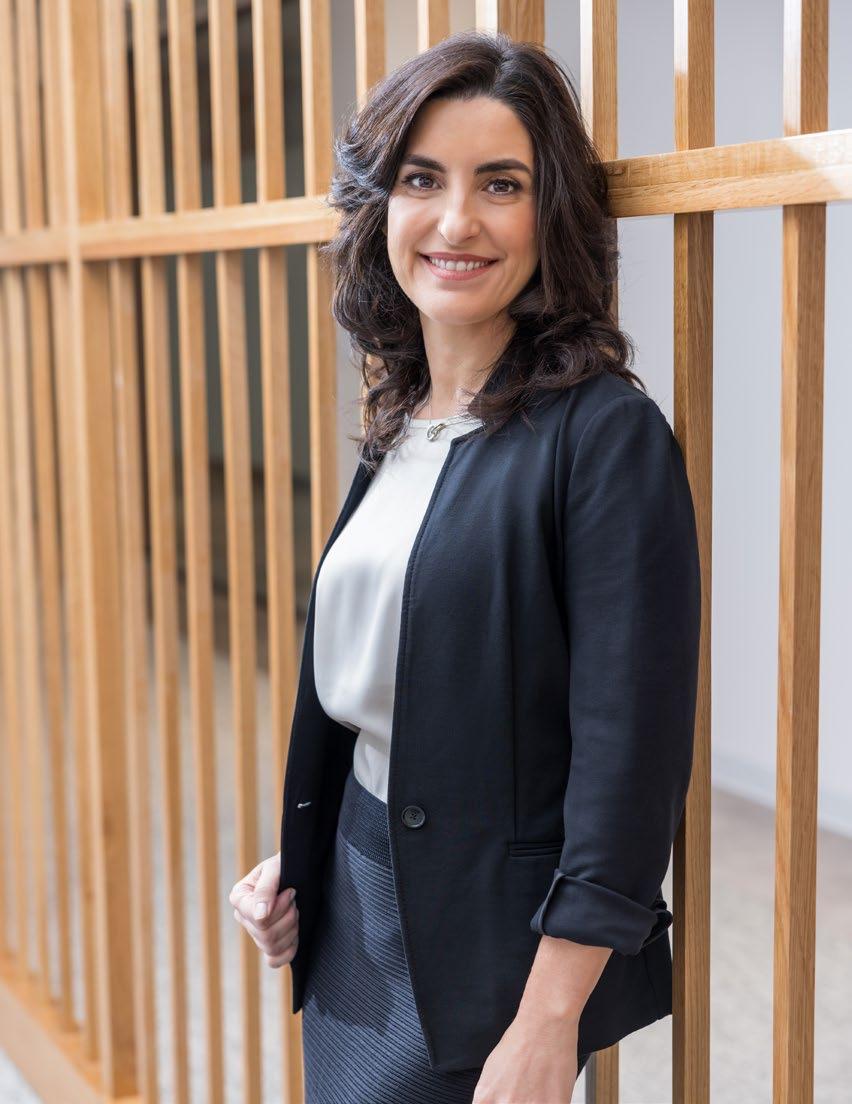
Nordenstohl’s move from abroad wasn’t just a personal one for her and her family, it also coincided with a remarkable shift for the company—one that moved Galderma’s head office from Fort Worth to Dallas, Texas. “As an organization, the move to Dallas isn’t just a change of location. It has to do with what Galderma stands for. It’s a step towards our future. We've built a space for us to embrace collaboration and thrive as a company and as a team.”
As employees are transitioning into hybrid work models in the aftermath of the COVID-19 pandemic, it’s a special moment to be at Galderma, and for Nordenstohl, especially. She believes her positive outlook comes naturally. “I always believe that what’s good can be great, and I work every day to make that happen. I want to make a difference by impacting people in the best possible way.” That optimism rubs off on everyone she meets and is an intentional element of the
company’s new office, which she sees as an opportunity for positive change.
“I believe people go to a place because of how they feel there and for what happens there. So, we are creating a culture within this new space that connects with our future and our purpose as an organization, where people want to get together, collaborate, and build something bigger than themselves,” she says. To create that environment, she's focused on enabling happiness which, for Nordenstohl, encompasses a few different things.
“Happiness has to do a lot with gratitude. So, I reinforce gratitude by acknowledging the value of each individual and letting them know they are recognized and respected. I also encourage transparency by being open to conversations, welcoming feedback, and listening to different ideas. With gratitude, respect, openness, and transparency, everyone can be themselves.
And when people can be themselves, they add the absolute most to an organization,” Nordenstohl explains.
Nordenstohl also places a significant emphasis on collaboration within Galderma’s new space. “When you join an organization, it’s because you want to be part of something bigger than yourself. Things aren’t always easy, but if we do things together, we can find the strength we would never have found if we were alone.”
At Galderma, however, collaboration contributes to much more than being the pure play dermatology category leader. From newborn skin to maturing skin, and healthy skin to those with skin conditions, Galderma embraces differences to offer an innovative portfolio of premium flagship brands and services for every skin type and color. Their company purpose to advance dermatology for every skin story comes to life by providing science-based products to meet people’s
“Our culture and values are a part of us. They’re embedded in you; they’re what got you to where you are, and they’ll come with you wherever you go. So, I’d never want to lose or change that, but we can adapt.
individual needs, taking into consideration cultural sensitivities, and using treatment best practices to serve diverse communities.
For more than ten years, Galderma also has supported the Children’s Skin Disease Foundation (CSDF), a nonprofit impacting the lives of children suffering from life-altering and, in some cases, life-threatening skin diseases. Every year, the foundation hosts a medically staffed summer camp called Camp Wonder, where many Galderma team members volunteer. For one week, kids with chronic skin diseases from around the country take a break from being patients at Camp Wonder.
“Children with serious diseases can go there for a week, interact, and be themselves. Then you can hear them saying words like, ‘I feel happy,’ and ‘I feel free.’ CSDF is an amazing foundation, and being part of Galderma, an organization that collaborates with it, makes me proud,” Nordenstohl says. Galderma has given more than $1.7 million to the foundation, allowing more kids to
attend Camp Wonder, and providing them with their Cetaphil brand products, but it doesn’t stop there.
Recently, Galderma hosted its 8th annual Wonder Run. This time, in the heart of downtown Dallas, its new home. To support the CSDF, Galderma donates 100 percent of race registration fees and all incremental donations directly to the foundation and Camp Wonder, resulting in more than one hundred thousand raised over this year’s race weekend.
But Nordenstohl isn’t just the Head of US at Galderma; she’s also a wife and a mother to a five-year-old daughter. Each of these roles is very important to Nordenstohl, so she has had to find ways to balance each, day by day. “My days always start with my daughter. Packing her backpack, making snacks, lunch. I take care of all that, because I believe it’s part of preparing her to go to school in the best possible way and also for me to be a part of that process.”
“
With gratitude, respect, openness, and transparency, everyone can be themselves. And when people can be themselves, they add the absolute most to an organization.”
Nordenstohl also recognizes that each day isn’t as easy as the next. “At one point in my life, I decided it’s about quality and not quantity. So, when I am with my family, I’m fully present. I believe that we’re always creating memories, so I make the most of our time together to create special moments,” she says. But then, when work does come up, Nordenstohl is very intentional about how she communicates with her daughter.
“As work is always present in my life, I try to create a positive idea and a good connection towards work with my daughter. So, I’ve never referred to work as if I ‘need’ to go or as if it’s something negative or hard. Instead, I decide to explain work as a place where I do something I enjoy with people who I want to be around. Then, I’ll come back, and we'll be together again. So, it’s more about showing her that by doing something that I like and enjoy, at the end of the day, I’m a happier person, and I can be a better mom,” she explains.
With all these variables, Nordenstohl admits that it can be tough to find time for herself. But that’s where she stresses the support she gets from her partner. “I have a great husband, and we’re a great team, so not only do I get to spend time with him, but he’s also why I can make time for myself,” she says. Even so, it’s something she must be intentional about to find the right balance.
“It’s not always about the amount of time; it’s more about making the most of your time. It also helps that I’m doing something that I enjoy and love and for that, I’m lucky,” Nordenstohl says. So, when faced with the question that plagues successful executives of her stature, the inevitable, “How do you do it?” Nordenstohl believes that she’s doing it the same way as anyone else.
“We’re all just trying to organize ourselves and our lives in the best possible way, so that we can be as happy as we can within the twenty-four hours each of us get, one day at a time.”
JUAN TAVERAS HAS A BUSY HOUSE. HE AND HIS wife Lauren have just launched a first of its kind DEI platform and are raising three daughters under seven. Aurelia is six, Salomé is three, and Lucero is just six months old. Then, there are Fiona, Fluffy, and Lulu—a terrier and two guinea pigs.
Taveras expects to field questions about the range of his HR and DEI experience and what inspired him and his wife to launch DEI Pro Finder, an online DEI resource and connection hub. He sat with Hispanic Executive in late 2023 to talk about what it means to be an effective and outspoken leader.

You’ve recently left your last company to launch your own project. Tell us more.
Lauren and I are currently working on DEI Pro Finder (deiprofinder.com) an online resource and connection hub. DEI Pro Finder will house the largest public directory of DEI practitioners as well as curated tools and resources that leaders can use to develop a DEI strategy. In addition, we will be able to provide one-on-one support to businesses that need an additional level of guidance and direction.
We noticed a need in our industry that no one was addressing so we took it upon ourselves to create a solution. We decided to create DEI Pro Finder after realizing how hard it is to get information about DEI practitioners. Since a directory like DEI Pro Finder did not exist, business leaders, like me, resort to Google and LinkedIn searches. Trying to connect with practitioners, learn more about them, and get information
about their fees can feel like a wild goose chase. It is a difficult and time-consuming process. DEI Pro Finder takes the pain out of implementing a DEI strategy. Getting started is often the top barrier to this work, and it shouldn’t be because it is so important.
As a seasoned DEI leader, what do you believe is the role of a DEI leader like those featured in DEI Pro Finder?
To do it well, you must be willing and ready to raise concerns. Being outspoken in an effective way (about DEI work) isn’t about calling people out. We practice calling people in. If I see concerning behavior, I’m not here to point a finger, but instead I want to assume the best, ask questions, and genuinely engage. Being a DEI leader also means leading by example, you have to practice what you preach. That’s not to say I always get it right, but I do my best and am honest and transparent about the mistakes I make. It requires a level of vulnerability that can be uncomfortable. It is a life-long commitment to learning and growing.
Let’s talk about your previous experience.
I can only guess that working in the HR and DEI space at dynamic organizations like PetSmart Charities and NYC Outward Bound Schools must been meaningful and fun. What did you love about it?
My favorite aspects of that work was that I had the opportunity to create welcoming and inclusive workplaces and to take care of people. I started my career in hospitality and found the
nonprofit world about 12 years ago, but I have never forgotten the importance of the guest experience and customer service. A mindset that I bring to my HR and DEI practice. I have also enjoyed my varied roles in HR as it relates to building culture. At PetSmart Charities, for example, there was the fun of having fourlegged co-workers in the office and chairing the Culture Crew, a group of staff volunteers that planned team building events. At NYC Outward Bound Schools, it was completing the ropes courses during field training or climbing the rock wall in the office.
I transitioned to the nonprofit sector because I’m drawn to mission-driven work where we are doing something together that is about more than the bottom line. Most recently at PetSmart Charities, I worked with great leaders including the organization’s President Aimee Gilbreath who brought a clear and innovative vision. Thanks to our donors, we got to spread love and joy by supporting organizations in the animal welfare space.
Helping our partners to ensure pets in shelters find homes, or, helping a pet parent find their new best furry friends, or helping to ensure pets can remain with their families— it was all positive and exciting work. Working in the nonprofit sector is also a way for me to give back and pay it forward because, as an immigrant and first-generation college student, I benefited from the support and services of many nonprofit organizations.
I was born in the Dominican Republic and came to New York City in the 1980s. It defined who I am because I grew up in this big, diverse city full of life and culture. I was also totally parentified, meaning my immigrant parents relied on me to read letters in English and sign them up for food stamps and navigate other government benefits. I think that gave me a strong work ethic, a love of problem solving and helping people, and a passion for using my talents to make life and systems better.
“Being outspoken in an effective way (about DEI work) isn’t about calling people out. We practice calling people in.”
And that seems to make you a natural fit for the nonprofit space. Right. It is typical for people in the nonprofit sector to wear many hats. You can be developing budgets one day and fixing a printer the next. It’s an all hands-on-deck work environment to which my skill set lends nicely.
What do you believe is necessary to create healthy and productive work cultures?
Having organizational values that everyone, including leadership, is expected to uphold as well as a clearly defined vision and direction that strategy and goals can flow from. Prioritizing diversity, equity, and inclusion work is also important, especially as the workforce and the way we work continues to evolve. The most successful organizations understand the direct correlation between diverse teams and inclusive workplaces. People want to work where they feel valued, appreciated, and where they can be their authentic selves. Inclusive work environments foster creativity, innovation, and engagement which leads to more productiv-
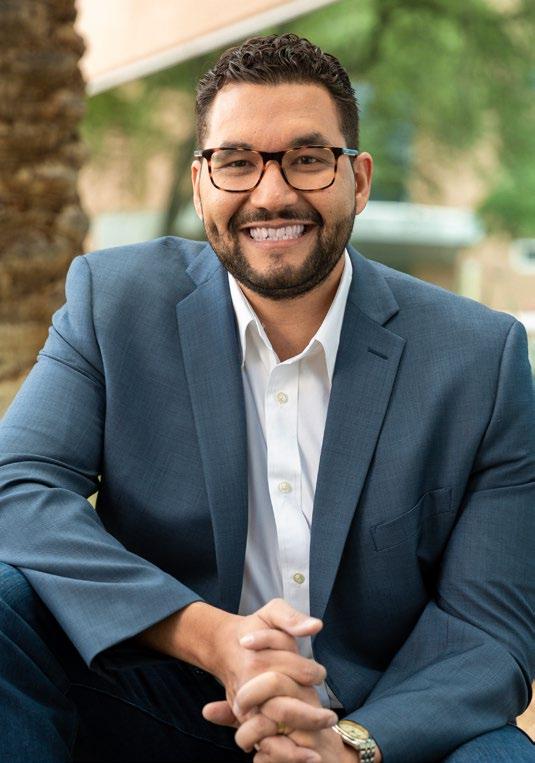
ity and better results. Creating this requires intentionality and participation from everyone at all levels of the organization.
Coming back to your heritage. How do you keep your Dominican culture alive with your daughters?
Lauren and I are very proud of our Dominican culture and it’s important to us that our daughters know and appreciate their heritage. We speak Spanish at home, so our daughters are bilingual, and we read books from Latino authors. We listen to music at dinner, and we love to dance. During the
holidays, we cook traditional Dominican food. I hope we can take the girls to see family in the DR soon.
What’s next in 2023 and beyond?
We are focused on growing DEI Pro Finder and expect to have a thriving marketplace that adds value to businesses and DEI practitioners alike.
On the personal side, we will be celebrating our 10-year wedding anniversary in 2023 and we want to do something special and memorable. We also want to travel more as a family and explore other countries.
President David de Leon is an example to all at Alliant Energy and the broader Wisconsin community
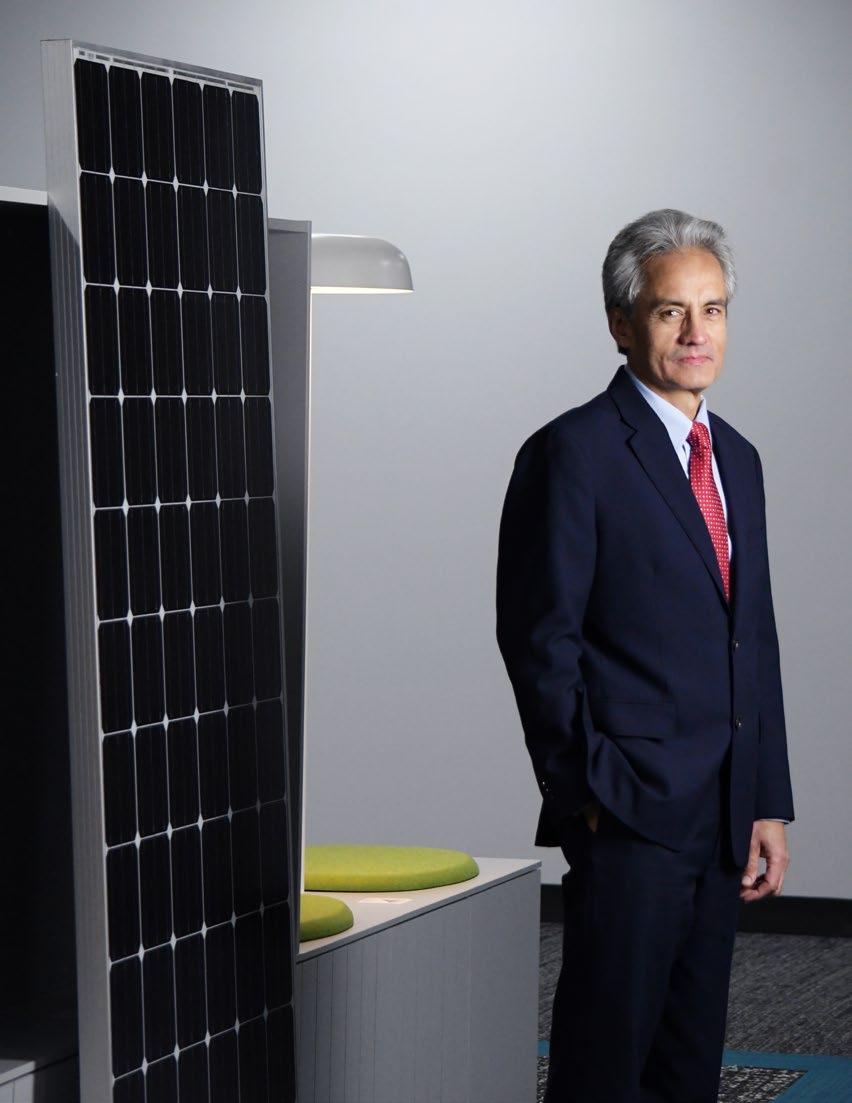


The senior vice president of operations and president of Alliant Energy Wisconsin has been part of the organization since 1987 and has accrued double-digit titles from engineering to management to director roles. He had just one request: to continue living in Madison, Wisconsin.
“I raised my hand for almost anything,” the president says. “Every time there was an opportunity, it seemed like it worked out. The opportunities allowed my wife and I to stay in a community we love. It also provided my wife the chance to continue her career opportunities here while staying close to family. I love it here and I love our community.”
The future leader, one of eight children, grew up in Guatemala. He divided his time between Guatemala City, where he attended school, and the family farm, to which his travel could take hours or days, depending
on road conditions. He sometimes stayed at the farm for months to help his father.
During college in Guatemala City, the enterprising de Leon also started a business picking up milk from small local farms and delivering it to a cheese factory. His days started at four in the morning, seven days a week, but gave him the flexibility to attend evening classes. The business also provided him with an income to help support himself and his family.
“We were better off than so many,” de Leon says humbly. “We had a house, we had a vehicle to get around. And my parents wanted us to get a good education. I knew, however, I would have to leave Guatemala if I wanted to build a career.”
That journey would eventually bring de Leon first to Platteville, Wisconsin (population: 11,836) and then Madison, neither of which he had known before. Along with a
long and distinguished career track at Alliant, de Leon has found great satisfaction in helping to develop the company’s internship program by mentoring new employees and working closely with novice engineers. It’s something he wishes he’d had access to as a young and curious engineer.
“We have built a really successful program that has paid off for us and our interns several times over,” the president explains. “Whether I have interns reporting directly to me or more informally, it’s a way to help provide some guidance for students early in their careers. They get experience working and delivering results in an organization, which is such a valuable opportunity to have.”
De Leon also takes great satisfaction in the many ways he’s been able to help connect with the Latino community outside of work. The president has partnered with the
In his quest to become an excellent leader, David de Leon has been willing to constantly learn and evolve, supporting initiatives that allowed him to grow while also helping Alliant Energy succeed in delivering reliable and affordable energy.
United Way to work with Latino immigrants, to translate, and to help them find support and opportunity. De Leon is also a board member of the Madison Region Economic Partnership, an organization that works to retain and attract businesses to the area, mainly in rural Wisconsin.
The SVP also serves as a board member at Second Harvest Foodbank of Southern Wisconsin, yet another opportunity to help those who need it most not just by securing basic necessities but by helping promote understanding of how sustainable wages, permanent housing, and access to food create a better world for everyone.
As the Latino population of Madison has grown, so has the need for empathy, understanding, and support for those looking to build better lives for themselves, and de Leon says he’s grateful to be in a community and company where he can help support those efforts.
“It might be technological literacy, it might be making sure that resources are available, or it might just be communicating with someone in a language they’re familiar with,” de Leon explains. “From the very beginning, my wife and I just wanted to volunteer and help people, especially Latinos living in or moving into the area.”
When he’s on the clock, de Leon is committed to serving customers, delivering on projects that improve the reliability of the grid while keeping rates affordable, and working with the company’s three thousand-plus employees across Iowa and Wisconsin. Always the engineer, the SVP says the organization is consistently looking for new ways to deliver safe, clean, and reliable power that is cost-effective to customers.
“Doing so is a team effort and involves our great employees as well as our partner contractors, suppliers, consulting and engineering firms, union labor and many
From the very beginning, my wife and I just wanted to volunteer and help people, especially Latinos living in or moving into the area.”
others,” adds de Leon. “Working collaboratively allows us to serve our customers efficiently while building stronger communities.”
If he’s not at work or working in the community, you’ll likely catch de Leon on the soccer field, the golf course, or just enjoying time outdoors. Given his location, that’s only a handful of months during the year, but it’s time well spent, nonetheless.
De Leon has achieved great things at Alliant, but his example outside it is arguably far greater. The Guatemalan transplant has found a home that he is committed to making better any way that he can. One would be hard-pressed to find a better example to follow.
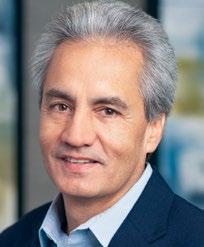
We’re proud to be the EPC contractor building 880 MW of solar for Alliant Energy’s Clean Energy Blueprint.


burnsmcd.com
Congratulations David de Leon!
Thank you for what you do – at work and through your leadership and involvement in the community.
THE ELDEST OF EIGHT DAUGHTERS, Giovanna Genard has led by example from childhood. In middle school, the current VP of external affairs and marketing at PRA Group often traveled from her home in Puerto Rico to Haiti and Venezuela on mission trips to help others. She volunteered at a summer camp for children on the autism spectrum.
In high school, she spent her weekends volunteering at a nursing home for residents with memory and cognitive issues. Before she was even in college, Genard would wind up in front of the Puerto Rico Senate, arguing for funding on behalf of her school and for arts education in general.
Why, after two decades of working in the higher education space, would Genard elect to come to a public company? One of the most compelling selling points for the VP was PRA Group’s fierce commitment to
philanthropy and expanding its storytelling to the rest of the world.
“Employees here receive hours each year to devote to volunteering in their communities,” Genard explains. “PRA Group has given millions of dollars to more than one hundred nonprofits across the globe, from health and human services to arts and education, from civic organizations and environmental sustainability causes to military veterans and first responders. You’re surrounded by people here that want to make a difference all over the world. That really spoke to me.”
Though only with PRA Group since July of 2022, Genard is already seen the amazing work being done on behalf of those who need it most. PRA Group donated $100,000 to the recently completed Children’s Hospital of the King’s Daughters in Virginia to build a pediatric mental health hospital and outpatient center.
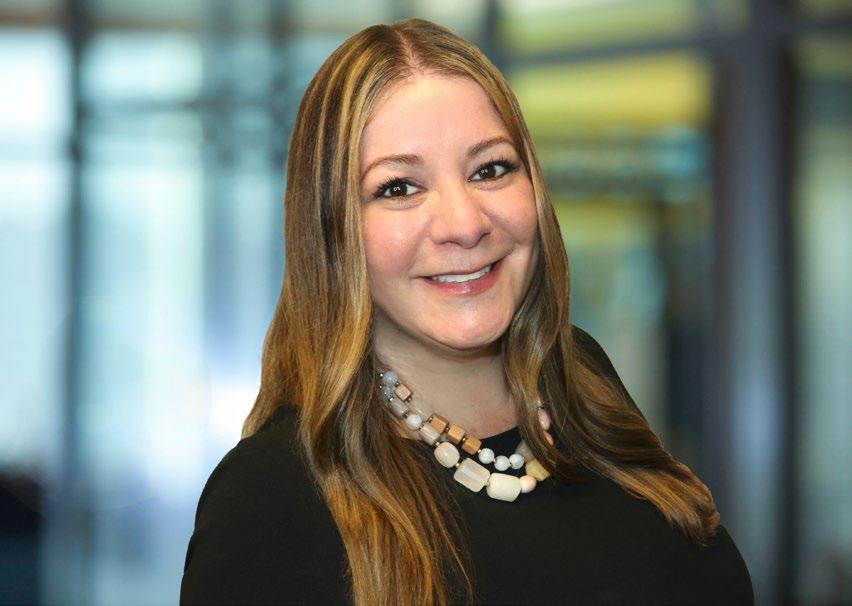
The fourteen-story structure is “designed with every consideration for the emotional and physical comfort of the youths it will serve,” according to the company. And it will strive to “promote the arts, physical activity, play, education, and recovery as a family.”
PRA Group also sponsors numerous STEAM learning opportunities, including collaborations with the Virginia Living Museum and the Virginia Aquarium. Working with local charity ForKids, Genard and her colleagues prepared backpacks for children in need. “It was a chance for us to ensure that underserved students could start their school year with the essentials,” Genard says.
Before delving even further into Genard’s life of giving back, it’s important to point out the business case for bringing her talents to PRA Group. The executive’s award-winning marketing and communications work shone at prestigious public doctoral research
universities like Penn State and Old Dominion University where Genard had a chance to collaborate on a White House pilot project addressing resiliency issues for coastal communities across the world.
Genard also joined the CIVIC Leadership Institute, collaborating with executives across the Hampton Roads region of Virginia to solve problems, build networks, and work toward a common good.
The eldest of eight says her calling card is not backing down from a challenge. Being offered the chance to tell the story of PRA Group’s giving activities on a global scale was just too great of an opportunity to pass up. But Genard urges those earlier in their careers to consider that she didn’t seek out leadership roles or feel naturally comfortable speaking up. In short, she built up the courage to lead out of a desire to give back or when there was a need for someone to step up and take action.
“In some ways, I had to find my voice early, because there were so many competing voices in my house. I needed to be able to lead by example and pave the way for my siblings,” the VP explains. “But in other ways, I have struggled to find my voice. Early in my career, I was terrified of public speaking, but I didn’t see anyone else standing up to speak about the importance of arts education or funding a research university that is doing such incredible work. You just have to find courage to say yes and accept the responsibility of helping to create positive change.”
Regardless of her comfort with the spotlight, Genard is the cocreator of an organization that has single-handedly found a way to change the lives of thousands of young people.
REYES: Remote Experience for Young Engineers and Scientists is a virtual STEM and Health Sciences learning program aimed at increasing science literacy, inspiring and
training the next generation of engineers and scientists and diversifying science fields for statistically underrepresented students.
Genard hoped the small program could attract one hundred budding future scientists.
“We ended up with 11,000 registrants from 135 countries,” Genard says with a tiny glint of pride showing through. “There are so many aspiring scientists that may have been told that science wasn’t for them or that they weren’t smart enough to pursue that as a career. This free program makes science accessible for everyone.”
REYES has worked with NASA astronauts and other incredible innovators in science and technology to inspire its participants. This writer believes they need look no further than the program’s cocreator. Sometimes it seems like there are as few Genards in the world as astronauts, but the people she has inspired already number thousands, and may someday reach millions.
“
There are so many aspiring scientists that may have been told that science wasn’t for them or that they weren’t smart enough to pursue that as a career. This free program makes science accessible for everyone


Both in his work at Meridian Design Associates Architects and in his efforts to help open the National Museum of the American Latino, Antonio Argibay works tirelessly on behalf of Latinos
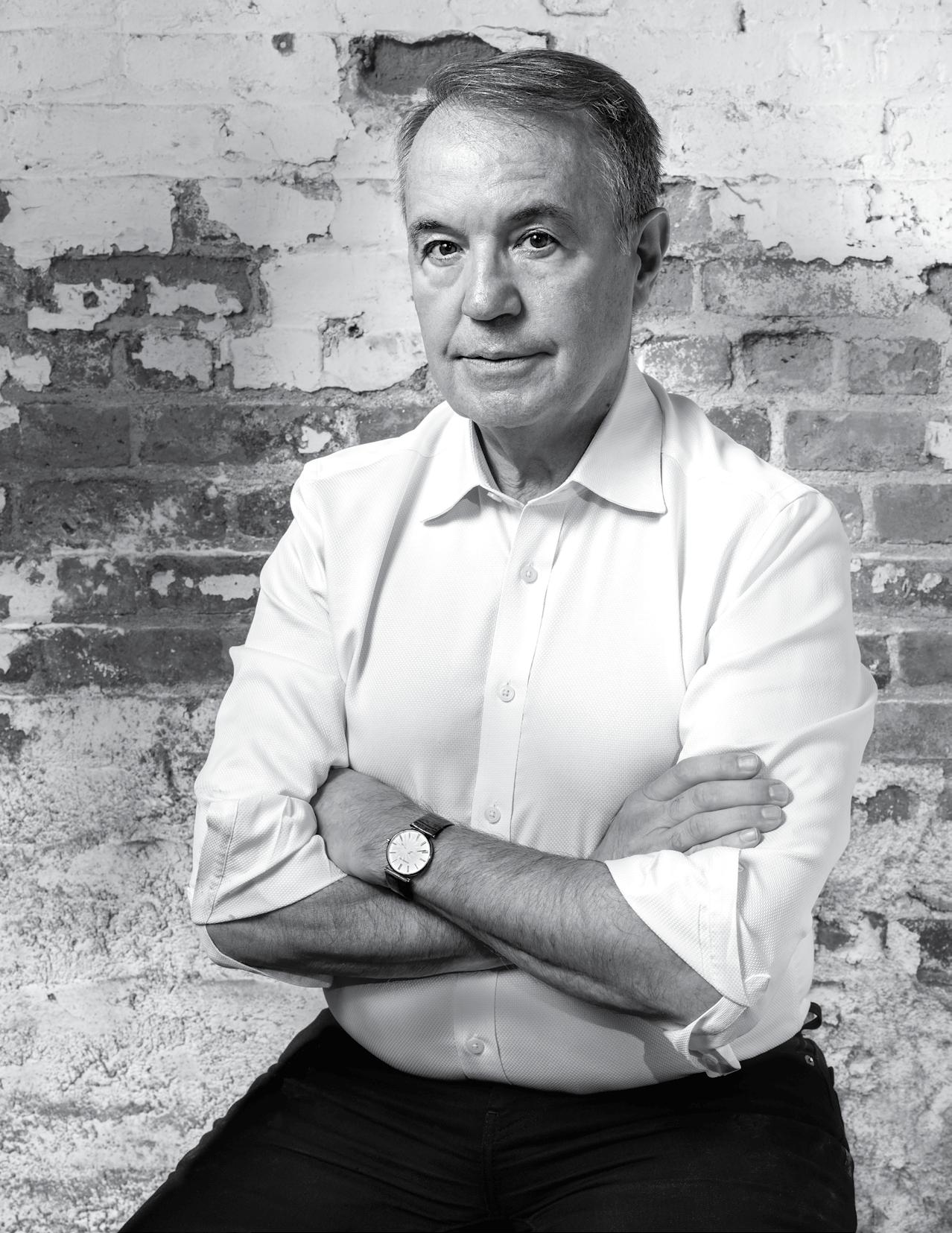
Antonio Argibay, AIA, LEED AP, sure knows how to begin an interview. The managing principal at Meridian Design Associates Architects PC believes excellence needs to be just that. He’s proud that Meridian has incredible representation of underrepresented groups. He’s proud that his organization has consistently walked the talk in supporting its immigrant employees and the issues that matter most to them. He’s proud that Meridian looks and feels like a melting pot of culture, background, and personality.
“We want to go in the front door just like anyone else,” Argibay explains. “We want to make it in a competitive environment with no stigma attached in any way.”
But there is still something incredible about that fact that with fourteen of the nation’s largest and most prestigious architectural firms in
the running, Meridian won the bid to build the new headquarters for Warner Bros. Discovery Global Headquarters as the company transformed the former home of the American Lithographic Company in New York City, a storied nineteenth-century media factory, into an icon of twenty-first-century media.
While Meridian has long broken barriers for Hispanic architects with its impressive track record of prestige projects, its appointment of a Hispanic woman, Argentine-American Luciana Machado, as the project lead is still unique for the field as a whole and is evidence of Meridian’s success as an employer and industry leader.
Argibay’s #PeopleFirst approach and business values significantly contribute to Meridian’s success. The firm has earned global distinctions including one of the world’s most prestigious architecture and design awards, the 2022 World Design Award by the Architecture Community,
awarded for their design of the aforementioned Warner Bros. Discovery project in three categories. The world-class jury sought out “outstanding ideas that redefine architecture design through the implementation of novel technologies, materials, programs, aesthetics, and spatial organizations along with studies on globalization, flexibility, adaptability, and the digital revolution.”
And it is no surprise that Meridian receives these accolades. The Warner Bros. Discovery space is a cutting-edge office environment that intentionally exemplifies a modern vision for the post-COVID-19 workplace, with design elements that successfully incentivized virtually all of the company’s remote workers to return to the office. This includes biophilic design concepts, a fully equipped wellness center, and two full floors of communal indoor and outdoor amenity spaces that offer moods that range from soothing and relaxing to the kind of high-intensity, high-precision environments that newsrooms are well-known for. There are also personal workspaces, which go above and beyond by featuring individually adjusted lighting and desks with attention to natural light, privacy, and acoustics—a complete 180-degree turn from the open floor layouts of the tech-startup-driven early aughts.
“We are not a minority firm. We are a majority firm.”
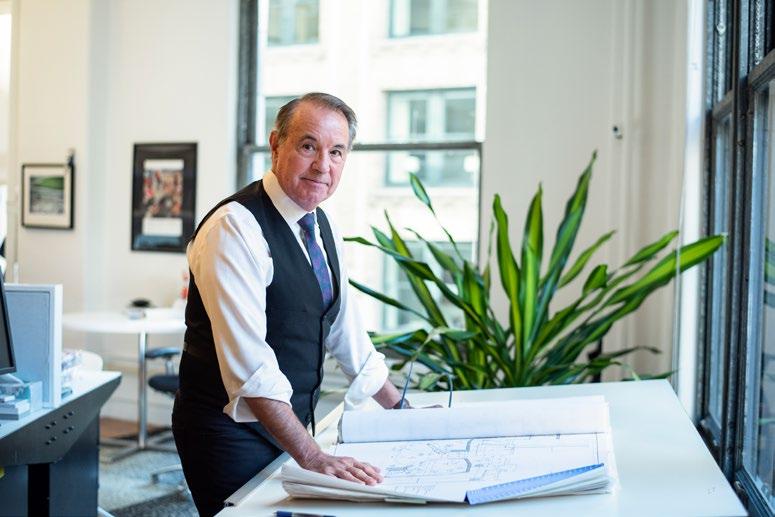
Argibay is especially proud of this project because of its successful completion in the middle of the COVID-19 pandemic.
“While we had every intention of completing this project, which incorporates Agile management methodology and hybrid work, before the pandemic, it truly was the correct choice for us and for our client with COVID happening all around us. We didn’t have to make any design changes as a result of the pandemic, and it was an incredibly prescient project that began back in 2018.”
The project is notable for a variety of reasons, but its building standards should be near the top of the list. The project was built
in accordance with science-backed WELL Achieving Platinum certifications used to measure, certify, and monitor “features of the built environment that impact human health and well-being, through air, water, nourishment, light, fitness, comfort, and mind,” according to the International WELL Building Institute. This certification is no small feat, as it means that the organization has met the highest pinnacle of health achievement in the industry.
“Adhering to these standards means we’re providing benefits to employees that are just too numerous to mention, but I’m so proud to have been part of this project,” Argibay says.
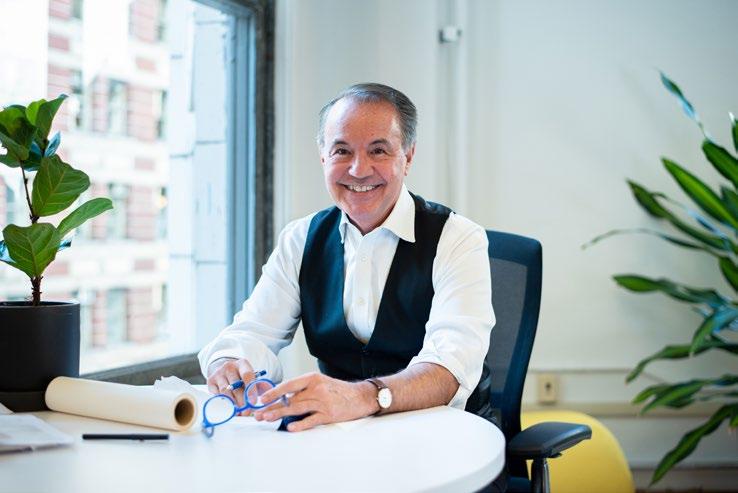
Just as Argibay wants his firm to be judged by the same standards as any other, he believes the contributions of American Latinos to US history should finally make their way into the broader national consciousness. That’s why he serves on the board of the Friends of the National Museum of the American Latino, an organization that has dedicated itself to advocating for the creation of the namesake museum since 2004.
The story of the museum is fraught with delays, politics, and consensus-building over thirty years to make Latino contributions to the fabric of the United States a reality.
“Maybe it’s because in my heart I’m a twelve-year-old, but I love the story of the West,” Argibay explains. “That story shouldn’t start in 1850 with frustrated miners making their way East from Califor-
nia after some failed in the nineteenth-century Gold Rush. It should start three hundred years earlier, with the introduction of the horse, the mixing of the Spanish with American indigenous peoples. It’s a story we never hear, and one that Hollywood has largely overlooked.”
The museum was officially established in the Consolidated Appropriations Act of 2021, with half of the funding of the museum’s construction provided. But it may take a decade or more to become reality, due to continued congressional deadlock and little sense of urgency on a national scale.
For Argibay, the creation of a museum is just as much about architecture as it is about better understanding our national identity. “Museums, in many ways, have taken the place of cathedrals,” Argibay says. “You used to find these paintings and history in storied palaces or holy sanctuaries. Museums are now where you can be taken back in history. The buildings where these objects are kept tell just as much of the story as what’s inside. They’re more than just warehouses.”
“Museums, in many ways, have taken the place of cathedrals.”
Since 2010, Reidy Contracting Group has collaborated with some of New York’s leading companies. Working in partnership with our clients, we strive to maximize e ciency to ensure all of our clients goals are achieved. Our projects include renovation, new construction, construction infrastructure, and existing refurbishments. With skilled and highly qualified sta , along with our experienced subcontractors, we consistently exceed expectations.




The National Museum of the American Latino is a way to showcase the countless contributions of an overlooked population that is on its way to becoming the majority. It’s a way to honor the legacy of millions of Latinos who have helped create the world around us. Argibay knows that the structure that houses those contributions will make the first statement to anyone entering the premises. But Argibay also knows that design cannot do all the heavy lifting. There need to be more Latino leaders reflecting the true new landscape of the United States experience, and that includes in the business world.
“I’m not saying there should be a quota of Latino CEOs, but from 2013 to 2022, the S&P 500 went from eight Hispanic CEOs to twenty, and [to Latinos holding] just four percent of
board seats,” Argibay explains. “That is not at all in line with just how much Hispanics and Latinos are contributing to the economic growth of this country. We start up more businesses than any other group, but you just don’t see it reflected in leadership.”
Argibay believes the pace of change is monumentally slow compared to the rapid increase of Latino representation in the US census. Creating more opportunities for Latino CEOs isn’t just a good idea, he says, “it’s a long overdue necessity if we wish the US to reflect the reality of the people that make our country great. It’s not about quotas or awards or recognition. It’s deeper than that. It’s about understanding what connects us, celebrating our shared history, and continuing to find a way to grow together.”
With over 15 years of trusted experience, JRM has quickly grown to become one of the top General Contracting & Construction Mgmt firms across the US.


Headquartered in New York City with offices in New Jersey, Florida & California, JRM delivers the highest quality products & services to clients that include Fortune 500 corporations, respected property owners & developers, major law firms, media & tech firms, leading luxury retailers, renowned hospitality groups, life sciences & healthcare organizations, & financial services firms.








In Houston and Hialeah, Eliecer Viamontes steers the future as CEO of Entergy Texas and as a partner to his alma mater in the construction of a new hub of Cuban culture

ELIECER VIAMONTES WAS JUST ELEVEN when his father died. While he and his mother, Ana, adjusted to life without him, they struggled to pay the bills. They turned to their friends and neighbors in Hialeah, Florida, for support when they needed it.
“Even though my mother did everything in her power to keep our household running, I remember there were situations like Thanksgiving where we received a turkey and all the goods from friends, our church, and local organizations to have a meal on Thanksgiving,” Viamontes recalls.
Sure enough, Viamontes discovered that where there is humility, there is wisdom. Born in Miami with Cuban and Colombian origins, he leaned on his Latino community, and in return, it inspired him to live with grace and lead by example for years to come. Whether he was at the office or away from it, he pledged to embrace this ethos.
While Viamontes spent over a decade as a manager and director at Florida Power & Light Co, he championed an empathetic approach to leadership that the industry lacked. Viamontes would see his compassion pay off, not just in

For years Eliecer Viamontes asked people to call him “Eli” to avoid their discomfort when they couldn’t pronounce his full first name. Although he invites friends and colleagues to continue to call him “Eli,” in more formal settings the executive shares how he is taking back his name, especially to honor his father (the original Eliecer) who passed away when Viamontes was eleven years old.
his personal life but in his career. He joined Entergy as its vice president of utility distribution operations in 2020, and by 2021 became the president and CEO of Entergy Texas.
Viamontes leads the Greater Houston-based electric utility provider, which serves over five hundred thousand customers. He drives success across its customer service, public affairs, resource planning, finance, operations, and resource planning teams. Plus, he ensures it offers safe, affordable, reliable, and sustainable service.
“It’s not just about me being a leader externally,” the CEO says, “but focusing internally to recognize the commitment of our employees, motivate them, thank them, and make sure that we’re doing everything we can as a leadership team to ensure they’re working safely and [are] able to go back home to their families the same way they came in.”
Of course, Viamontes knows the buck stops with him. He oversees projects with national and global implications and with changes in market demand, he also wants to foster grid resiliency and sustainability throughout Southeast Texas.
“The other side of what we’re working on is a pretty big wave,” Viamontes says. “There’s an energy transition happening where a lot of companies, many of them our customers, have sustainability goals and are looking to electrify their processes. We as the energy provider play such an important role in helping our customers, the industrial sector, [and] the nation decarbonize [our] society. We are passionate about how much we impact the energy transition.”
Viamontes is trying to meet those same business and sustainability objectives by making the push to construct the Orange County Advanced Power Station—a combined cycle plant near Bridge City, Texas—that
230,000 homes. The Public Utility Commission of Texas recently approved Entergy Texas’ proposal to build the plant which will serve as the foundation to power and enable growth in Southeast Texas. The decision also preserves the opportunity for Entergy Texas to unlock the plant’s ability to cofire hydrogen soon which supports the plant’s long-term viability and benefits customers.
Despite being far removed from his Hialeah days, Viamontes gives back to a place that hits home. He is partnering with his alma mater, Florida International University (FIU), to launch CasaCuba, a think tank and cultural hub for Cuban affairs and culture.

CasaCuba will be live in an iconic 57,000 square-foot state-of-the-art facility (under construction at the time of this interview) with galleries for exhibitions, an event and performance venue, classrooms for courses related to Cuba, seminar rooms for executive roundtables and policy forums, and other places to gather with family and friends.
“My wife and I are interested in shining a spotlight on the CasaCuba project [with] our alma mater because it helps make it an official center of the heritage of

Cuba [for] public affairs, policy, business, and everything related to it in the US,” Viamontes says. “We’re excited about how we can contribute.”
Meanwhile, Viamontes spends Thanksgiving differently these days by volunteering with his family at the Salvation Army. “My wife and my girls, we did Thanksgiving meal preps that morning to help those that are going to come line up or sit down and have a meal that [they] couldn’t [otherwise],” he says. Leave it to Viamontes to offer us food for thought.
“It’s a big lesson for my children,” Viamontes notes, “so they can appreciate what they have and appreciate the gift of giving. But something that we try to do as a family is find those opportunities to give back in Texas, and [to remind ourselves of] who we are and what we represent.”
Eliecer Viamontes ’05 and his wife, FIU alumna
Carol
A place for the celebration and preservation of Cuban culture and the study of Cuban a airs, FIU CasaCuba recognizes the impactful accomplishments of the Cuban American community throughout the United States and beyond. casacuba.fiu.edu
 CasaCuba at Florida International University is bringing together scholars, policymakers, business leaders, artists, students, and the community to build a Cuban cultural center and think tank that facilitates the discussion and study of Cuban affairs—history, policy, business—and the celebration of Cuban heritage. Learn more at CasaCuba.FIU.edu.
CasaCuba at Florida International University is bringing together scholars, policymakers, business leaders, artists, students, and the community to build a Cuban cultural center and think tank that facilitates the discussion and study of Cuban affairs—history, policy, business—and the celebration of Cuban heritage. Learn more at CasaCuba.FIU.edu.
Hernández ’08, as well as other prominent Hispanic business leaders, for their achievements and contributions to the advancement of Hispanic culture.
she spotted as a student at City University of New York. It invited students of color to apply for an internship program through Inroads, a nonprofit, teaching the fundamentals of business and office culture, including how to write a resume, what to wear to a job interview, and what questions to ask when you get there.
“If I had not seen that flyer on the wall, I would never have gotten into the business world,” she reflects. “All of this experience, all my success would never have happened because nobody would have taught me.”
Her mother was a trained accountant in the Dominican Republic, but never had the chance to apply her skills in their new home in the Bronx. Both parents reminded Arzola and her two brothers that education was the key that would unlock the American dream. Knowing she would need to piece together scholarships to afford a university education,
she followed up on that flyer. The internship program set her up for a demanding, high-leverage career in the corporate world.
Fifteen years into her professional life, Arzola serves as head of financial reporting and accounting policy at Oscar Health, a healthcare and technology company that offers affordable insurance plans and medical care through its online platform and mobile app. The organization went public in 2021; Arzola’s mission was to guide the company through the transition from startup to public firm.
“They needed someone who had the technical accounting expertise in public companies,” she explains. “They were embarking on a very exciting, complex project, so I enjoy that there’s a growth mindset across the company, a collaborative culture. We’re all centered around a common goal.”
Her path has offered a variety of opportunities to experience change and grow her
expertise. She began her career at PricewaterhouseCoopers, where she had the chance to learn the work in a massive, highly-optimized firm. Later, she transitioned to Assurant, where she practiced looking out for potential process improvements in reporting. And after that, she landed at Tradeweb as director of financial reporting and accounting policy. Arzola took those experiences to start building processes from scratch and her inquisitive nature helped her to build a thorough understanding of the business and its practices.
Healthy change management has been a crucial skill, especially at Assurant and Oscar Health. Arzola notes that people often assume accounting is exclusively about number crunching. Instead, discussion and collaboration are critical to success. When implementing new processes, she says, “You can’t just say: ‘Here’s the answer.’ It’s important to get everyone’s perspectives to see if your

proposal works; it’s a matter of working with everyone, reaching a compromise while still meeting the accounting guidelines.”
Along the way, Arzola has also recognized the importance of helping others like her who have the desire and potential to contribute to corporate America, but historically receive fewer opportunities. She mentors at the same program she joined as a student to train young interns on the same practices that helped her breakthrough. “I know it’s important to pay it forward, so I always go back to that program and volunteer to conduct those trainings,” she says. “I go out of my way to help young people in corporate America. If they come to me with questions, I try to take from my experience to give them tips and tools.”
Meanwhile, at Oscar Health, she participates in Black and Latino employee resource groups. At a recent company event, participants discussed cultural differences in relation to mental health norms. Arzola explains it’s important to be sensitive to those subtleties to advance a healthy discourse. Many first-generation college students and children of immigrants face those stressors alone, but it doesn’t have to be that way.
“Immigrants and first-generation Americans deal with the pressures of doing well in school and making sure their parents’ sacrifice wasn’t for naught,” she
At Equity Methods, we partner with leaders at the world’s most innovative companies to bring best-in-class modeling, valuation, reporting, and analytics to their equity compensation programs.
Leverage your background in public accounting, consulting, or quantitative finance to drive positive outcomes for newly public companies, Fortune 100 multinationals, and everything in between.


Nearly 50 million pets lack veterinary care. Let’s change that.

To donate, visit
says. “Once we start seeing that this is a common issue, we can open up lines of communication and address it in a much more productive way.”
More broadly, Arzola remembers how challenging it could be for the people in her community to get health care. She was lucky because her family had a car; they could cross the city to reach a doctor. For others, finding treatment presented a challenging series of logistical and financial obstacles.
“My first job out of college, my parents were unconcerned with the work that I would be doing,” she recalls. “Their first question was, ‘Will you have good health insurance?’ It shouldn't be that way; every American deserves quality healthcare.”
Now, she’s thankful to have landed at Oscar Health, where she can contribute directly to the mission of delivering access to affordable health care across the country. Her family feels the same way. “They’re rooting for Oscar,” she says. “My father proudly sports his Oscar T-shirts because this is really personal to us.”
Learn more at www.equitymethods.com/careers.

480-428-1200 careers@equitymethods.com
Equity Methods is the nation’s number one-rated provider of equity compensation modeling, valuation and reporting. We have assisted over forty Fortune 100 companies and over one thousand clients with their most challenging equity compensation valuation and reporting needs. We bring deep technical knowledge and end-to-end support to all our client engagements.

We celebrate mentors like Gladys who inspire excellence.
What is your secret to successful leadership?
The impressive executives featured here share theirs, and they are strategies that engage both the mind and the heart.
68. Manuel Padilla, MacAndrews & Forbes 77. Ricardo A. Bedoya, Medtronic 80. Brianna Hinojosa-Smith, Yum! Brands 84. Alex Quevedo, ADP 90. Léo Murgel, Salesforce 94. Marcos Torres, RBC Capital Markets 100. Viktor Alvarado, BrenntagManuel Padilla is a high-profile executive in the risk management space, and he wants more Latinos to find their way into this profession
MANUEL
when it collided with a Russian submarine at the height of the Cold War. It would be a singular storytelling event for anyone else. But Padilla isn’t anyone else.
“If you tell me you’re worried about a catastrophe, well, I deal with those every single day,” the VP of risk management and insurance at MacAndrews & Forbes says matter-of-factly. “But if there’s a calamity, well, there’s something we need to identify and take a look at.”
Padilla is equal parts tough-talking realist and inspirational figure. The secondgeneration Puerto Rican rose above his community’s life and career expectations to become something of a titan in the risk management business. For over thirty years, Padilla has encountered fires, earthquakes, floods, hurricanes, terrorism, and ransoms.
But Padilla says his success isn’t just about him, it’s about the community of stakeholders throughout the world tasked with always preparing for the worst and ensuring that, if the worst does happen, survival doesn’t have to be a roll-of-the-dice proposition.
“My interactions with a slew of different risk professionals, including key insurance brokers, commercial underwriters, and executives at Lloyds of London have had a material impact on my success,” the VP says.

“[I commend them all because] everything I know about my profession I received from key mentors who believed in me, as a person, and did not hesitate to share their knowledge and feedback. Some of my relationships have been in place for thirty years.” Now, Padilla wants to make the insurance space more accessible for Latinos because he was one of so few for so many years.
But, before he could create change for others, Padilla had to break the cycle of expectations for Puerto Ricans like him from the Williamsburg neighborhood of Brooklyn, New York.
Growing up, Padilla was incredibly aware of the limitations when it came to job prospects for those from his tight-knit Puerto Rican community.
“There was always the feeling that you needed to stay in your lane, culturally,” he remembers. “We were expected to be
Manuel Padilla helps MacAndrews & Forbes keep their portfolio ready for anything. But he’s also helping build the future of risk management. The VP serves on the global board of directors for the Risk & Insurance Management Society (RIMS), is a founding member and cochair of the Lloyds Counsel of Risk Owners, executive council member for the Maurice Greenberg School of Risk Management at St. Johns University, and has served regularly on RIMS committees. In his spare time, he is a member of the US Coast Guard Auxiliary, and formerly a commander of a division in Brooklyn.
laborers, or maybe open up a bodega. One of my uncles was able to own a couple of laundromats that were very community-focused, but that was really all you could hope for.”
“I recall one of my uncles telling his brothers he was going to apply for a post office job,” Padilla recalls. “I was very young and it always struck me as odd since that should not have been such a reach.” He learned later on that it was a novel opportunity for people in his community, and did seem out of reach to many there.
Padilla vividly recalls the one Puerto Rican police officer, a towering six-footthree man who acted as a sort of spokesperson for his community, but he was more an anomaly than an aspirational goal. Padilla’s community was discouraged from the idea of pursuing civil service or law enforcement jobs, implicitly or otherwise.
But Padilla caught some breaks. His family moved out of Brooklyn for a few years to New Jersey. A student at the time, he was able to meet people from other walks of life and get a different perspective on
his future. It didn’t hurt that he had some street smarts and wasn’t afraid to learn. He was eventually accepted into an accelerated program back in Brooklyn. He skipped the eighth grade entirely and completed a machine design/pre-engineering program at a vocational high school. He was also a talented musician; that earned him a spot on the New York All City High School Band, which performed at Carnegie Hall.
But to truly find a way out, Padilla decided to enlist in the US Navy. “I graduated on a Saturday, and I was at the recruiting depot shipping out to San Diego on Monday. I had signed up six months in advance,” Padilla remembers. “I had been part of the Navy Yard Boys Club Sea Cadets program at Fort Greene. It was run by an individual who mentored us and took us on trips and got us interested in the military. It was all out of his own pocket, and it was an incredible experience for someone my age.” This new mentor introduced Padilla and the sea cadets to military academics, the mayor, the UN General, and senators and congressmen.
“
If you don’t see the opportunity, it’s because you’re not looking in the right places.”
“I wasn’t going to be a porter or work in a factory. That is good, honest work but I wanted something very different. The experience of being shown that perceived hurdles should not limit my dreams I learned here.”
In the Navy, Padilla would crisscross the country multiple times, from San Diego to Charleston, South Carolina. Aboard the USS Kitty Hawk and the USS Carl Vinson, Padilla would tour the Western Pacific: the Philippines, Korea, Australia, and Kenya.
Padilla was at Naval Station Miramar while a little movie called Top Gun was being filmed. He met Tom Cruise and was present during the filming of the famous “Buzz the Tower” scene as it was being filmed. “There wasn’t actually a sonic boom that day. They must have added it in later,” he says.
Aboard the USS Kitty Hawk, a Russian submarine was playing an unsuccessful game of cat and mouse with the ship. They were about as subtle as an earthquake. Padilla remembers the sound and vibration of metal on metal. The sub had accidentally run into the aircraft carrier and one of its propeller blades was ripped off and lodged into the bow of the ship below the water line.
It’s hard for anyone who wasn’t alive then to remember the panic of the Cold War era. Any small event could have tripped off World War III. Fortunately, cooler heads prevailed.
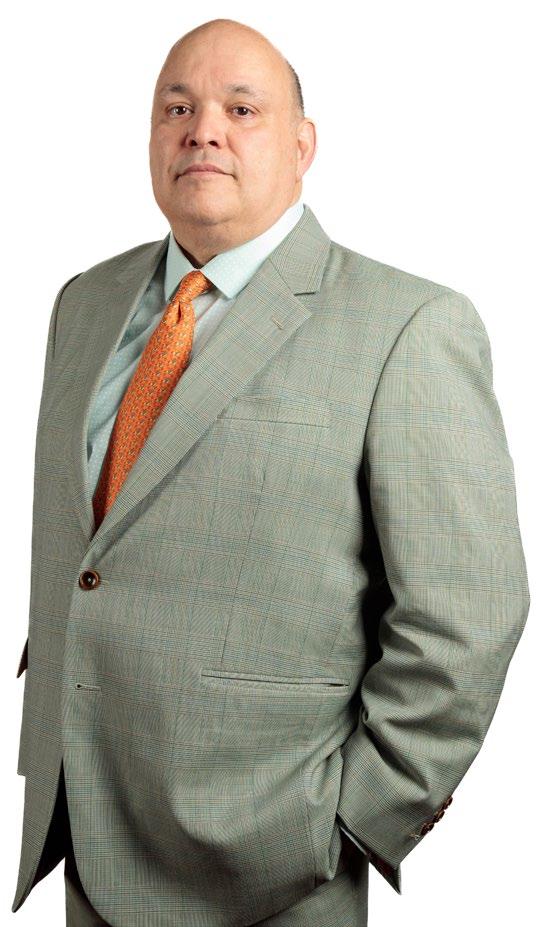
We’re purely focused on complex risk, so if you prefer your (re)insurance undiluted, talk to McGill and Partners
McGill Global Risk Solutions LLC is the US licensed entity of McGill and Partners
mcgillpartners.com
Meanwhile, Padilla was finding out that a life in the military wasn’t something he wanted to continue. “Why didn’t I stay in the Navy? That’s very simple. They woke me up at 2:30 in the morning,” Padilla says.
After an eighteen-hour day, Padilla was raised from sleep and called back to work. He jokingly asked his chief petty officer if it ever got any easier.
The officer smiled and said no.
“From that moment on, whenever I got done with my job, I was up in the ship’s library reading through college textbooks and figuring out where I was going to go,” the self-proclaimed king of calamity says. “My initial goal was to go to the Navy to secure the college benefits under the G.I. Bill. This forced me out of my comfort zone and back to the plan.”
Barron’s Profiles of American Colleges would ultimately send Padilla on his way. He flipped from A to B to C when the College of Insurance caught his eye.
“It was a school that offered you the chance to get a scholarship and one that gave you real-life training while you were
going to school,” Padilla reflects. “I don’t know what this insurance thing was going to be exactly, but I knew this was for me.”
Padilla would eventually graduate in three years at the top of the multiple lines underwriting focus area along with actual work experience.
Prior to graduation, Padilla was introduced to the Risk Management Insurance Society. He was selected as a student involvement program candidate for their introductory program and was flown to New Orleans to learn about the industry. The program was then run by an unforgettable figure to Padilla, Anita Benedetti, whom the program is now named after. About ten thousand professionals from across the risk management world were all in one place, and Padilla was hooked. He decided to move from insurance underwriting to risk management.
Now at MacAndrews & Forbes, Padilla helps the privately-owned company mitigate exposures across its worldwide


Manuel’s commitment to the risk management profession and his outstanding leadership at MacAndrews & Forbes Incorporated is unparalleled in the industry. Together, we know we can drive positive client outcomes and advise clients to make better decisions. Manuel, your leadership and passion inspire us, and we congratulate you on this well-deserved award.
aon.com
portfolio. It gives Padilla a chance to combine his engineering skills and his insurance knowledge to protect the assets of the enterprise on a global basis.




“I’m one of a few risk managers who can analyze a company from a global perspective and actually get my feet on the ground in international markets,” the VP explains. “I travel everywhere, because I know I need to get the real story from the key decision-makers. The company has allowed me this tool and it has been a key factor for success. The insurance side of these transactions is very important [but] the relationships more so. I can’t count how many times an interaction in London or elsewhere helped us to solve a unique risk that we were looking to solve.”
His partners at Alliant Insurance Services Inc. concur, with Executive Vice President and Managing Director Sandy Crystal noting, “we have worked together for twenty years on a number of extremely complex, challenging and time sensitive matters and I have never once seen Manny get flustered or stressed. He stays calm and works to solve the problem which










AS AN INSURTECH COMPANY THAT BRINGS INNOVATIVE SOLUTIONS TO THE INSURANCE INDUSTRY, WE CELEBRATE OUR CLIENTS' ACHIEVEMENTS AND LEADERSHIP AS AN INSPIRATION TO OUR MISSION.

means everyone around him follows his lead and doesn’t panic.” And with the same enthusiasm, Anthony DeFelice, Chairman National Casualty and CEO of Aon Construction & Infrastructure says, “I have had the privilege of working with Manny for the last thirty years. Together we faced many challenges both on placement as well as claims. Manny always handled these situations with acumen and professionalism. He has mentored many and is well known within the industry.”
As astute as Padilla can be on any given issue, he can’t be everywhere at once. The VP says he’s tasked with creating and leading global teams—teams he’s clearly proud of.
“My mantra is that I would always rather be one step ahead and have addressed a number of issues before the hurricane topples a building over,” he says. “There are so many things we need to do before an event. After the event, it’s always too late. We are there to clean up the mess and work on the recovery.”
Padilla and his team must also see every potential issue stemming from a situation. A massive flood in Thailand in
CONGRATULATIONS TO MANUEL PADILLA WITH MAC ANDREWS AND FORBES FOR HIS OUTSTANDING VISION AND DEEP EXPERTISE IN RISK MANAGEMENT.
MAPTYCS® is a geospatial solution for property risk exposure management, climate risk assessment and real-time weather events monitoring.



We couldn’t resist asking a risk management expert about some of his most precarious moments in the industry. Manuel Padilla didn’t want to get into specifics but recalls being very confused when reviewing a situation where it appeared that a regulatory committee may have failed to realize that a nuclear power plant had, essentially, been built with some material engineering issues.
“This was an issue we discovered while doing due diligence,” Padilla recalls. “They had spent five years and many hundreds of millions of dollars assembling this thing and only then did they realize they had a major problem. There were many experts looking at the designs regularly; still, [there was] an issue. Truly scary stuff: it shows that even with the most meticulous of analysis, things can still happen. Catastrophes happen every day. It’s a calamity I worry about the most.”
2011 had ramifications for the rest of the world. As the world’s largest hard disk drive manufacturers were twenty feet underwater, there was a possibility of sales dropping 30 percent for a piece of technology that was needed virtually everywhere.
“This was a truly unique scenario for us, not only because of the flood, but because of the market impact to our business unit,” Padilla explains. “We were able to get our people into the marketplace quickly to buy enough hard drives so that we could meet demand before that demand became too severe. Part of this was because we worked on identifying critical manufacturers well in advance of the event.”
Padilla has dozens of these stories. Flying in generators to get facilities back online. Helping a Brazilian plant manager understand that with a few tweaks, their plant wouldn’t go out of business if some unforeseen event occurred. For Padilla, preparing in advance mitigates, if not altogether eliminates, the impact of loss. Insurance is there to protect the balance sheet after a loss, but proactive loss prevention
keeps the business running and generating revenue uninterrupted.
When it comes to encouraging more Latinos to join the insurance industry, Padilla hopes that more will choose to be bold. “I think our cultural bias is that we don’t want to speak up if we are not confident or don’t know the answers; we might not want to take a risk out of fear of ridicule,” the VP explains. “I think that’s something we need to recognize and combat. Sometimes, you just have to close your eyes and walk through the door.”
Padilla says there is significant opportunity throughout the insurance industry for Latinos, but that it needs to be sought out. It requires individuals to make themselves visible, to reach out for opportunities or information, and to commit firmly. “Do not be shy or reserved, this is a field where fortune favors the bold.”
“If you don’t see the opportunity, it’s because you’re not looking in the right places,” the VP says. “To be blunt, sometimes you just need to do some more homework. And sometimes you have to be willing to take the risk of sounding a little dumb in order to figure out where you want to be.”
SOMETIMES A SMALL EVENT CAN trigger a major change. Take Sir Isaac Newton, for example. According to legend, an apple fell from a tree, bopped him on the head, and set him on the path to formulating Newton’s Laws of Motion.
For Ricardo “Ricky” A. Bedoya, chief legal counsel for Ear, Nose & Throat (ENT) at Medtronic, a single graduate school class changed his career trajectory.
“I have always loved science and finding out how the world works. I majored in microbiology and cell science at the University of Florida. However, I didn’t have the spirit to be a scientist,” Bedoya says. After graduation, he earned a master’s degree in public health at the Boston University School of Public Health. “I had visions during graduate school of one day perhaps becoming a physician or epidemiologist and traveling the world fighting infectious diseases.”
During his graduate studies, Bedoya was required to take a class in health law simply as a way of filling an elective slot. But for him, it was Newton’s apple.
“I became fascinated by the intersection of law and science,” Bedoya explains. “After that class, I took another health law class and came
to the realization that my calling was to go to law school so I could apply both disciplines.”
After earning his JD at Vanderbilt University Law School, Bedoya joined Locke, Liddell, and Sapp (now Locke Lorde LLP) in Dallas, Texas. “Starting my career in Dallas at Locke was a great fit for me. I made lifelong friends and was able to work early on in pharmaceutical and general litigation at a top-notch firm with incredible mentors,” Bedoya says.
In 2007, married and expecting their first child, Bedoya and his wife moved to Jacksonville, Florida, to be closer to family. He joined the international law firm of Holland and Knight, becoming a partner in 2012. He focused on commercial litigation (including healthcare cases) and served on the firm’s Latin American investigations, healthcare and life sciences, and Latin American business teams.
But he still itched to get deeper into the healthcare field, and took a major leap of faith in 2016 when he joined Medtronic. “It was one of the best moves of my professional life. When I was in private practice, I was ‘the product.’ But in-house, I work at an incredible mission-driven company with a world-class team dedicated to bringing products to market that ‘alleviate pain,
restore health, and extend life’ for patients across the world,” Bedoya says.
Bedoya’s current responsibilities include overseeing all legal activities of the ENT operating unit, an established global leader in instruments used for sinus, head and neck, and skull base surgery. “Each of Medtronic’s operating units has its own leadership team, which includes a chief legal officer,” Bedoya says, “and the chief legal officers function like primary care physicians. If something falls outside our field of expertise, I will consult with our company’s subject matter legal experts, as well as outside counsel when needed.”
He’s also active in various Medtronic initiatives, most recently serving on the team promoting the well-being of Medtronic’s legal professionals. “This is important because the legal profession, in general, has high burnout rates. The stress and long hours can lead to depression, anxiety, or addiction problems, and the well-being initiative is meant to proactively address these concerns head-on and provide a support structure for the Medtronic legal team,” the chief legal counsel says.
A key factor in Bedoya’s success— professionally and personally—has been
adaptability. “Growing up, I was one of the only Hispanic kids in my school, and so I had to learn to adapt to other cultures and people. Fortunately, I grew up in a wonderful small town in North Florida that I love and always loved me and my family back.
“My mom and dad had to adapt as well,” the executive continues. “As immigrant physicians from Colombia, their original plan was to do their medical residencies in the US before returning to Colombia. However, the communist guerilla terrorism and narco wars plaguing the country at that time convinced them to make their lifelong home in this great country that they love and are deeply indebted to for the opportunities they were afforded.
“I carried that approach through college and into my professional life,” Bedoya adds. “In the business world, you constantly need to adapt to the people you work with, to new responsibilities, or to learning new skills. You’ll always be searching for the perfect situation. However, you’re unlikely to find it. So you learn to adapt and work with what’s possible.”
Bedoya is also a champion of education. “My paternal grandfather only had a fifthgrade education, and he left home to start
“You’ll always be searching for the perfect situation. However, you’re unlikely to find it. So you learn to adapt and work with what’s possible.”
working at the age of twelve. He really sacrificed a lot to be sure my father went further,” Bedoya says. “Dad was the first in his family to receive higher education, and he became a successful physician.








“My maternal grandmother, who lost her dad when she was young and was raised by a single mom, chose to push ahead with her education and eventually became the first woman to achieve a high school diploma in Colombia and, later, the first woman dentist of the country,” he adds.
Bedoya maintains that education changed his family’s trajectory, and that it can do the same for any child. “Educating our current generation will dramatically increase the chances for success of future generations,” he says.
Although he’s recently scaled back his community service activities because of professional demands, Bedoya has served on (among others) the Jacksonville Board of Catholic Charities, the Diocesan Board of Directors for Catholic Charities, the Jacksonville Public Education Fund Board, and the Board of City Year Jacksonville.
His work with Catholic Charities was extremely gratifying. “Our mission was to help people, regardless of their station in life. The only criteria to receive assistance was need,” Bedoya says. “One of my most amazing experiences was helping to settle Cuban and Burmese refugee families, who came to the US fleeing dreadful situations with nothing but the clothes on their back. It made me reflect on my own many blessings, first of which was having the good fortune of being born into a wonderful, supportive, and loving family who made great sacrifices to give me the opportunity to grow up in this great country.”
Greenberg Traurig congratulates Ricky A. Bedoya, Chief Counsel for Ear, Nose & Throat at Medtronic, for this well-deserved recognition honoring his many achievements and extraordinary career. Greenberg Traurig is proud of our long-time collaboration with Medtronic and supports its mission to transform global healthcare technology.How the world’s largest restaurant company is harnessing the power of diversity and inclusion to power its digital transformation
ASK THE AVERAGE CONSUMER TO LIST companies using technology to drive their business, and they’re likely to rattle off names like Google, Amazon, Microsoft, and Meta. But one other company belongs on that list: Yum! Brands.
The world’s largest restaurant company—which operates brands that include KFC, Taco Bell, Pizza Hut, and the Habit Burger Grill—is leveraging distinctive technologies to improve employee and customer experiences alike. And Brianna Hinojosa-Smith, chief legal officer of digital & technology, is charged with protecting the ideas that are powering the company’s digital transformation.
Hinojosa-Smith started out as an electrical engineer, went to law school, and launched her legal career as an associate at Dallas firms before going in-house at major

telecommunications and tech companies like Uniden, Nortel, and Blackberry.
She was supporting the intricate technologies inside HoloLens augmented reality headsets, XBOX consoles, Surface Pro laptops, and other Microsoft products as an IP attorney when the Yum! Brands opportunity hit her radar.
The veteran leader almost dismissed the idea of making a transition but was intrigued by the opportunity to embark on a career within a digital and technology (D&T) “start-up” at a big company. Yum! Brands was focusing on technology and specifically, building and developing it internally for its full portfolio.
“I had spent twenty years in tech, but had no experience in the restaurant industry,” Hinojosa-Smith says. “But I recognized I had the chance to leverage my expertise as part of their digital and technology transformation and thus, do things that potentially had never been done before.”
She joined the organization at the height of COVID-19, which forced Yum! to temporarily close the dining rooms of its physical
company-owned locations. Like many other brands, Yum! pivoted to meet customer needs online and curbside. Hinojosa-Smith and her D&T colleagues had to move quickly.
In close collaboration with teams across the system, they introduced contactless carryout and delivery, joined a global innovation platform, acquired an AI business, bought a marketing technology company, and doubled down on data-driven e-commerce. By the end of 2020, digital sales had soared nearly 50 percent to $17 billion—an all-time high.
Yum! now has an innovation team that tests emerging technologies from smart automation to computer vision for order fulfillment. Each day, employees across the company’s 53,000-plus restaurants process tens of millions of transactions. A dedicated digital and technology team helps make it all happen whether those orders come in at the counter, via kiosk, from the drivethrough, online, or somewhere in between. The key is to unlock distinctive technologies that can be scaled at restaurants across all of its restaurant brands.
Hinojosa-Smith plays a major role in creating a center of excellence for protecting the intellectual property behind these advancements by filing patents, but she’s not doing it alone. She credits forward-thinking corporate leadership; collaboration with tech and legal colleagues across the brands; and a strong, diverse D&T team with making it all happen.
“We are making every effort to be purposeful and intentional about unlocking opportunities for people of different backgrounds, genders, ethnicities, races, and any other characteristics that make them who they are and making sure this continues to be integrated into our culture,” she says.
The approach reflects Yum!’s company-wide commitment to elevate diversity, equity, and inclusion (DEI) principles. The company operates with more than 1,500
franchisees in over 155 countries. “Diversity is our organization,” Hinojosa-Smith says. Yum! is aiming to achieve global gender parity by 2030 while increasing the number of underrepresented people it employs.

Since Hinojosa-Smith knows firsthand that women are underrepresented in technology fields, she and her colleagues are working to hire and retain female engineers. This led to the creation of Women in Technology, an employee resource group designed to provide women opportunities in mentoring, career development, and community engagement.
Yum! is also partnering with other organizations to launch an apprenticeship pilot that will bring in technology talent from underrepresented groups.
Hinojosa-Smith and her legal group work with their partners to ensure they, too,
are moving the needle. “We ask outside law firms to be purposeful and intentional about providing opportunities for the diverse attorneys in their firms,” she says.
These efforts keep Yum! relevant in the global marketplace and help the digital and tech team attract high-performing employees that will drive its critical digital transformation forward. And the strategies are working. One of the brands that didn’t have a website when Hinojosa-Smith started in 2020, saw digital sales rise by 70 percent in 2021. The digital sales total for the entire company topped $22 billion.
Each of Yum! Brands’ four divisions continue to open new restaurants. The company is growing thanks to two very special secret ingredients: a sophisticated digital and technology plan and an investment in diverse, world-class talent.
Alex Quevedo shows that a commitment to helping others provides opportunity to evolve and grow as a leader at ADP

Quevedo has called one of the most wellknown names in HR management software and services home. Starting as a sales associate straight out of college, the now president of ADP’s HR outsourcing and PEO businesses has steadily risen through the organization.
That journey includes three different areas of the business—a move from his home state of Florida to New Jersey, and, eventually, a welcome return to his home city of Miami, where the son of two Cuban immigrants was born and raised.
Quevedo’s commitment to ADP is in part due to the trust the organization has placed in him, whether it be the next big opportunity, a stretch assignment, or a mentorship opportunity.
Currently, Quevedo is leading two ADP businesses and helping to find new ways to serve its clients and their employees, while
also finding time to give back to his community and tend to his most treasured role as a “proud girl dad” to his two daughters.
There was perhaps no bigger proving ground for Quevedo than his move from Florida to New Jersey in 2011. The SVP role Quevedo was taking on was a world apart from his time in sales. It had a national reporting responsibility with much more exposure.
“The move was, for so many reasons, a pivotal moment in my life,” Quevedo explains. “But it paved the way for me not just to take larger roles at ADP but, oddly enough, moving to New Jersey would help me get back to Miami after fifteen years of moving around for various opportunities within the company.”
Fortunately, culture shock wasn’t a worry for Quevedo’s New Jersey adventure as it wasn’t his first time moving. He’d already
experienced big change going from Miami to a small town in Tennessee to attend university. Those new surroundings didn’t faze Quevedo and he was the first student to be awarded the Algernon Sydney Sullivan Award for ardent public service.
“Any time I thought about hardship, I would just think of my grandparents and the fortitude it must have taken to move to a new country with children, the sacrifice they made to create a better life for themselves and their children,” Quevedo says. “It makes any big moments I’ve faced seem minor in comparison.”
Since returning to Miami in 2018, and assuming his current role in 2021, Quevedo’s purview has widely grown. He leads two of ADP’s high growth businesses: ADP TotalSource, which is the largest professional employer organization (PEO) in the

country, and ADP Comprehensive Services, a leading outsourcing solution for payroll, benefits, and HR.
“We’re always focused on growth,” Quevedo says. “ADP has a long track record of success with a tremendous brand reputation for providing services that enable businesses to do what they do best. Our goal is to provide world-class services that keep our clients flourishing.”
As for so many other industries, the pandemic provided some incredible changes for Quevedo and his teams to work through. Pre-pandemic, we typically saw about five percent of our clients that were hiring those employees in a new location. But as the pandemic sent everyone home, moving about the country and seeking out new ways of working, suddenly that number shot up to 91 percent.
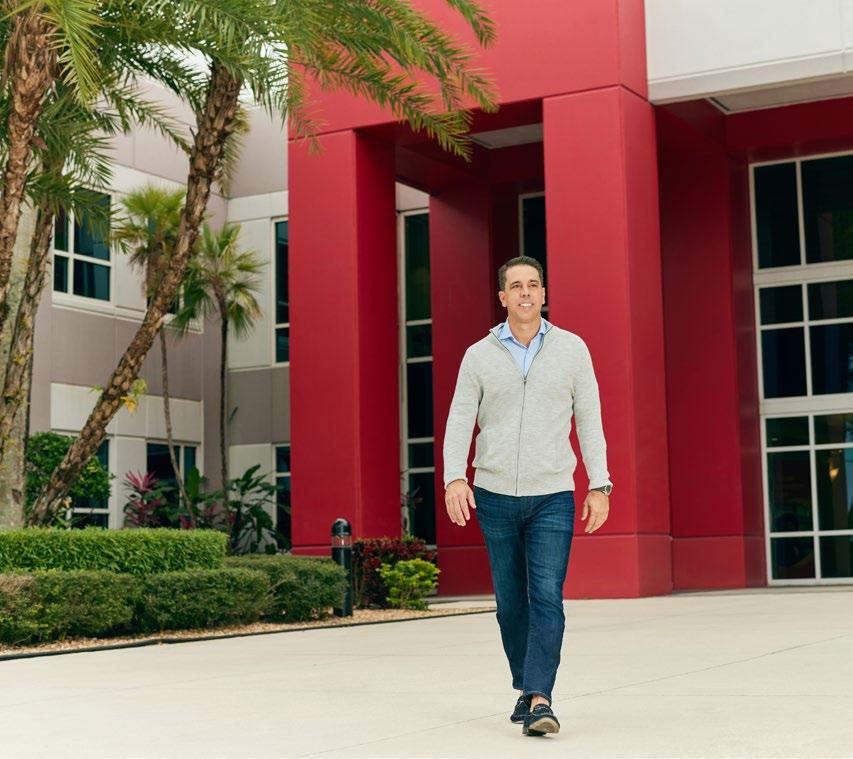
The rapid change to hybrid and remote work, however, turned out to be a significant business driver for ADP.
“Challenges brought on by the pandemic and afterward, like the tight labor market, are areas where we’ve really been able to help our clients not just survive but grow,” Quevedo says. “We’re able to help clients mitigate risk, institute new safety protocols to protect workers, manage compliance obligations in
their new locations, and provide competitive and affordable benefits for their employees who are now spread across the United States.
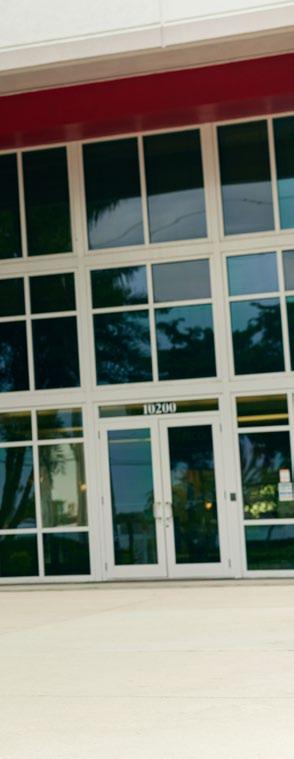
Internally, Quevedo has been looking for ways that automation can provide his teams with more meaningful and less repetitive work. As those efforts have progressed internally, Quevedo’s teams have looked to build in some of those efficiencies for ADP’s clients. It’s a win-win.
Encouraged by the mentorship he’s received over the years at ADP, Quevedo is intent on finding a way to inspire the next generation of leaders. He serves as the executive sponsor of Adelante, ADP’s Hispanic business resource group: one of numerous business resource groups at the company that brings recognition and focus on diversity, talent development, and workplace impact.
“As long as I can remember, ADP has had a strong diversity, equity, and inclusion focus,” Quevedo says. “Along with leveraging our data to benchmark and track our progress, we want to help our clients do the same to help build a more equitable workforce.”
One way ADP is delivering on its longheld commitment to creating a better world of work is through a diversity, equity, and inclusion dashboard for its clients to better address their own needs. But Quevedo’s business doesn’t stop there. His team also
advises its clients on how they can start and manage their own diversity, equity, and inclusion program.
Quevedo actively participates in ADP community outreach projects with Big Brothers and Big Sisters, Habitat for Humanity, and the United Way. And he has a special affinity toward the SebastianStrong Foundation, an organization focused on funding research for childhood cancer treatments and providing financial support for families working through cancer treatment.
Above his impressive title and position as a community leader are Quevedo’s two daughters. Whether it’s acting as an assistant coach for their athletics, or just making sure he gets a chance to drive them to school, it’s clear Quevedo’s priorities haven’t changed, even as he’s continued to rise through ADP. It doesn’t matter his title or the state he lives in, Quevedo just wants to be there for his people.
“Any time I thought about hardship, I would just think of my grandparents and the fortitude it must have taken to move to a new country with children.”
Léo Murgel has always embraced change; at Salesforce he leans into a start-up mentality while leading the company’s legal teams

EVERYTHING WAS GOING ACCORDING to plan for Léo Murgel. The brasileiro had wrapped up his secondary education in his hometown of São Paulo, where his family was engaged in public service. He enrolled at the Escola de Engenharia Mauá to study engineering just a few minutes away from their house. And he expected to spend the rest of his life in Brazil.
But when Murgel learned his parents were assigned to serve as diplomats in the US, he was faced with an unexpected decision: Would he stay home or try something?
“It was really a chance to go for something new, a potential learning opportunity like no other,” Murgel says. “I think that same theme carried over from other moments of my career, where nontraditional opportunities presented [themselves] in what turned out to be a fairly nonlinear professional journey.”
Little did Murgel know that pivoting would become a central theme in his journey; he’s been reinventing himself throughout his career. After moving to the US, he earned his BA in Food Engineering from
the University of California at Davis. He lived in San Francisco during the early 2000s dot-com boom and made the switch to technology. Since then, he has overcome challenges by embracing change, whether as a food engineer, technology project manager, or operations leader.
Murgel has spent the last decade at global CRM leader Salesforce. As the company’s senior vice president and COO for legal and corporate affairs, Murgel is charged with elevating operational efficiency for its legal department, making it easier for in-house lawyers to be more productive while staying within budget. It’s a role that requires him to wear a lot of hats, including developing new ways of working, overseeing multiple internal systems, and driving its right-sourcing efforts.
“Right-sourcing in legal, in my mind, is a similar journey to what the health system went through over the past half-century. We are implementing automated processes that allocate specific portions of the work to the talent with the most relevant skills to execute,” the SVP and COO says.
Murgel empowers his teams to achieve business transformation by implementing highly scalable processes, reminding them that the “destination is worth the journey.” They fully leverage the power of the Salesforce platform, Salesforce partners, and legal operations industry experts— like HBR Consulting and the Corporate Legal Operations Consortium (CLOC) — to drive change.
“That journey starts by painting an effective vision of where we’re going, and then cements itself by demonstrating the strategy in small incremental steps,” Murgel says. “And that’s where I think a lot of transformations tend to fail, because people need to be able to see themselves executing successfully in that to-be state along the way. Good transformation is never easy. There will always be bumps in the road.” Murgel has applied agile software development principles to shape
going to find some [talent], but you’re the rest of the world,” Murgel says.


Marcos Torres is an investment banker bringing hustle and heart to RBC Capital Markets


IN AN ERA FAR TOO OFTEN DOMINATED by superficial conversations about diversity, equity, and inclusion (DEI), Marcos Torres brings a breath of fresh air to the diversity, equity, and inclusion dialogue in corporate America.
“In the investment banking industry, being a Latino managing director who is also a group head is akin to being a dinosaur,” says Torres, the managing director of the communications, media, and entertainment group at RBC Capital Markets.
As a Boricua who was raised in New York City’s Spanish Harlem, Torres refuses to euro step past the empty promises that too many executives fail to keep. His parents moved from Puerto Rico to the mainland US in pursuit of el Sueño Americano, and they counted on him to overcome many obstacles, including systemic racism, poverty, and homelessness. The no-nonsense Nuyorican always cuts to the chase, no matter how uncomfortable the topic gets.
“My dad died when I was twelve and my mom died when I was fifteen. As a young Latino kid growing up in Spanish Harlem with no parents in poverty and homelessness, growing up was really uncomfortable,” Torres says. “It just really brought my perspective to an entirely different level, because I wasn’t doing it for me.”
While Torres embarked on an investment banking career just a few blocks south of el barrio, he chalks up his success to being grounded and having perspective. Despite being the only one of his six siblings to get a college education, he uses this as motivation to pay it forward.
“I kind of felt like I was doing it for my community, for my parents, for my siblings, for Latinos. For Latino kids who currently sit in my mindset (as a child) with such despair, sadness, and depression,” Torres says. “I felt like I was going to represent all of those people. Like I was chosen for a greater purpose.”
Even in his role at RBC Capital Markets, Torres does more than just advise or raise capital for Fortune 500 companies. He passionately fights the good fight and expands how RBC’s investment bank approaches DEI. Whether it is cochairing the firm’s Diversity Leadership Council, supporting new recruiting initiatives, or advocating for external DEI partnerships, he challenges the status quo in a traditionally conservative financial services industry.
“Look, it’s constant education,” the executive admits. “It’s educating your colleagues, which means your colleagues need to listen to you, which means they have to respect you. Naturally, you have to excel at your job in order to gain your colleagues’ respect and attention. Once they truly listen, only then can you educate.”
Fortunately, RBC Capital Markets has a corporate culture based on mutual respect and where DEI is more than just a talking point. According to Torres, this is in large part what
has kept him at RBC Capital Markets for more than ten years.
As part of its ongoing focus on hiring talented under-represented minorities, RBC Capital Markets has made meaningful investments in its proprietary summer internship programs. These programs include the Women’s Advisory Program, the Pathways Scholarship Program, and the LGBTQ+ Summer Insights Program.
Torres remembers what it was like to be overlooked by recruiters as a college student at Fordham University, so he forges strong partnerships with external organizations that tout diverse talent networks as a way to leverage RBC’s various summer

programs and get candidates through the door earlier in their careers.
“If we’re getting more diverse talent, that diverse talent over time will get higher paying front office jobs,” Torres says. “They will create more wealth and, in theory, that wealth will at least partially trickle back into Latino communities, Black communities, and LGBTQ+ communities. Ultimately, we will address the ‘E’ in DEI.”
Torres sits on the board of the Hispanic Federation, the nation’s premier Latino nonprofit organization focused all on things Latino. As an executive committee member and the organization’s treasurer, Torres has been particularly involved in Crear Futuros
(which translates to “Create Futures”), an initiative focused on helping at-risk Latinos complete college by providing peer mentorships, student support services, work-study opportunities, and leadership training. Crear Futuro college students ultimately have opportunities to apply and participate in RBC’s summer internship programs.
“The students get to know us,” Torres says. “We get to know them, and then we make them an offer, and they can join RBC Capital Markets better prepared and feel more included.”
Torres is also a board member at the Ballet Hispánico and the Latino Donor Collaborative. Ballet Hispánico brings communities together to celebrate and explore Latino cultures through innovative dance productions, transformative dance training, and community engagement. Latino Donor Collaborative is dedicated to reshaping the perception of Latinos as part of the American social mainstream.
When push comes to shove, you cannot put Torres in a box. Whether he navigates barrios or boardrooms, he earns respect from others with his hustle and heart. He reaffirms that Latinos have always belonged and are truly a part of the fabric of the American mainstream, across social, arts and culture, and business, and that
rbccm.com
Capital Markets is a registered trademark of Royal Bank of Canada.RBC Capital Markets is the global brand name for the capital markets business of Royal Bank of Canada and its affi liates, including RBC Capital Markets, LLC (member FINRA, NYSE, and SIPC). ® Registered trademark of Royal Bank of Canada.
Latinos have helped shaped the America we all experience it today.
And his colleagues and partners agree. “Marcos has demonstrated tremendous financial acumen and leadership as well as a true commitment to the nationwide Hispanic community,” says Albert Rodriguez, president of the Spanish Broadcasting System. “His expertise and commitment was critical to the successful refinancing of our debt and helping to position SBS for sustainable long-term growth. His partnership has been invaluable, and we are thrilled to recognize his accomplishments and passion for the Hispanic community.”
He shares his advice for executives that are slow to embrace DEI: “Get off your butt!” Torres says. “Time is limited! You don’t wait until you reach some magical point in your career to help others. The future is not guaranteed. We all live on borrowed time, so go help people now!”

IN 2020, THE CENTURY-OLD CHEMICALS and ingredients distribution company Brenntag embarked on a major global reorganization and transformation. A successful organization previously structured geographically, Brenntag launched a major restructure by type of business and industry to further unlock its true potential. The German-based company introduced two divisions: Essentials, commodity-type chemical products sensitive to logistics, and Specialties, ingredients tailored to meet the specific formulation needs of customers.
“This was a seismic change,” says Viktor Alvarado, vice president of controlling for Brenntag Specialties Americas. The company had many decades of operating via distinct regional units and dismantling the long-established business structure in favor of the new operating model would take considerable time and effort. It also was likely to provoke some resistance among the ranks.
Alvarado felt up for the challenge. Having grown up in Venezuela, where he started with Brenntag twenty-one years ago, Alvarado says

 BY PETER FABRIS
BY PETER FABRIS
he was accustomed to a volatile government and changing business environments that require managers to cope with sharp changes in policies and operational conditions.
“When you come from a place like Latin America that has smaller and fluctuating economies with frequent dynamic changes, it forces you to be very adaptable,” he says. “If a customer’s plant shuts down, for example, you have to adjust, because you can’t expect another one to quickly fill the gap.” This forces managers to endure adversity and find creative solutions to difficult problems.
The transformation came with a role change for Alvarado. He would move from vice president of finance for the US Pacific Region to the role he holds today, a position he describes as “a finance and strategy copilot of Americas Specialties.” This meant he would be dealing with many more Brenntag managers and teams from differ-

ent areas, who would be coping with drastic operational changes.
Alvarado was under no illusion that it would be easy, but he understood why corporate leaders were heading for an organizational upheaval. “The strategic reason was fairly simple,” the VP says. “The specialties business is more profitable than commodities, and less volatile.” The commodities business though, was much larger, and tended to overshadow specialties when it came to some key decision-making. Having specialties operate more independently and distinct, the thinking went, would allow it to spread its wings and grow faster.
One challenge that quickly became evident was how to divvy up accounts and structure commission incentives, critical aspects to commercial success. Previously, sales were divided by geographical region. The new divisional structure meant that salespeople would
own accounts crossing old regional boundaries. They would lose some customers and gain others. In addition, different regions had different commission schemes. “We had to align them and make sure that they promoted what we at Specialties wanted to emphasize,” Alvarado says. Once the changes were implemented, it remained critical to monitor their impact to ensure they supported, and not hindered, the strategic goals.
As the reorganization and transformation was unfolding in 2021, Brenntag made a large acquisition, J.M. Swank, a major food ingredients distributor with annual revenue of about $600 million. This move immediately increased the Specialties business size by approximately 30 percent. Indeed, integrating Swank was a critical step for the specialties business, a first test of the decision to reorganize. “We had to do it right,” Alvarado says. “It could not fail.”
While integrating a big acquisition has plenty of challenges for any company, it also presented a unique opportunity for Brenntag to do this in the midst of global internal transformation. While Brenntag’s former regional organizational structure made for siloed functions, Swank had been organized nationally. Thus, the acquired company provided a template for the parent company to build upon. Rather than immediately absorb Swank into Brenntag’s existing framework, Viktor and the executive team decided that the acquisition should be left as a standalone unit with key leaders remaining in place. This minimized additional impact on the business as the company scaled up its internal nutrition business.
Brenntag formed a steering committee comprising leaders from both Specialties and Essentials to guide the Swank integration. After about six months, top Swank leaders
“
When you come from a place like Latin America that has smaller and fluctuating economies with frequent dynamic changes, it forces you to be very adaptable.”
left the company. The transition has gone well, as evidenced by the accomplishment of most of the initiatives set out in its business plan, and set the new specialties unit on a course for robust growth.

The integration process created some friction. “Some people wanted this part of the business or that part of the business,” Alvarado says. His previous experience, which includ-
ed taking over key management roles within Brenntag as an outsider, helped him negotiate contentious issues diplomatically. For instance, he remembers a point soon after taking over as Pacific region controller from a similar post in the Latin American region. Some managers resisted his decisions to correct financial control shortcomings. “Who is he to tell us what to do?” seemed to be their mindset.
As some changes took place, a more collaborative culture helped set a more supportive tone, Alvarado says. For his part, he strived to foster honesty and transparency when explaining his decisions; and he asked his reports to do the same. “Always tell me the truth,” he says. “It doesn’t matter how ugly it looks.”
“That experience helped me develop a better understanding of how people are emotionally attached to their businesses,” Alvarado says. “It allowed me to gain more empathy.”

Alvarado applies this leadership approach to his new role guiding Specialties and the Swank integration, and it seems to be working.
“We already see the Swank business and Brenntag’s formerly regional specialties operations becoming more intertwined,” Alvarado says.
And his colleagues at Brenntag agree.
“I have worked with Viktor for a number of years in a variety of roles and value him as a strategic thought leader, who always leads with values and people,” says Donovan Mattole, VP HR Americas. “In his role as VP of Controlling Specialties Americas, Viktor has spearheaded the transformation of our specialties business in a way that places people first and aligns the right individuals with the right business.”
Overcoming the adversity and challenges of his early career, Alvarado notes, helped set him up for success in his current role. Those very skills became critical for the company during a time of massive transformation within the organization. Although some at first perceived Alvarado as an outsider, having spent most of his time within Latin America, the supportive network and open culture at Brenntag allowed for smooth transition into his new regional role over all of the Americas.
Alvarado believes that this perception is an obstacle that executives with Latin American roots must sometimes face when taking on North American responsibilities, but it’s a challenge that shouldn’t dissuade any Latino executive from joining the right US organization. And it is important they lean into the challenge and realize that their experience in Latin America can be leveraged to truly transform North American businesses.
“There always will be some narrow-minded people,” he says. “But for every one of those there will be ten that will be positive and want you to succeed, and Brenntag is a great example of this.”




TWO HOURS AFTER HER INTERVIEW with Hispanic Executive, Camille Vasquez, along with the rest of the world, discovered that streaming service Tubi planned to release Hot Take: The Depp/Heard Trial, a recounting of the most-followed legal case across the world since OJ Simpson’s murder trial.
The creators wrote, produced, and filmed the movie in only three months following the June 1, 2022, judgment determining that actor Amber Heard had defamed Johnny Depp by alleging domestic violence in an op-ed in the Washington Post. While claiming no accompanying Oscar nominations, the film’s production became one of many forthcoming instances that would, once again, launch Vasquez back into the spotlight.

The Brown Rudnick partner, whose outfits and personal life have been made the stuff of every gossip page across the world since taking on Depp’s case, didn’t ask for any of this. Imagine if tomorrow, you found
out that someone from an ABC firefighter drama was going to play you doing your job.
This isn’t the kind of thing that excites Vasquez, and maybe that’s part of why she got the job representing Depp. “Happiness, to me, is just to be able to do a good job for my clients, people who often become my friends and people that I care about very deeply,” Vasquez explains. “That’s what inspires me. I want to be their voice and their advocate.”
Over an hour-long conversation, Vasquez speaks confidently but kindly. She doesn’t name drop any of the A-list celebrities, music industry executives, athletes, and billionaires she has represented. And she’s a little embarrassed to talk about how well she can sing The Little Mermaid’s classic song, “Part of Your World” (more on that later). If there is one thing this writer walked away with, it’s the belief that Vasquez never imagined she’d be the subject of millions of TikToks, fan sites,


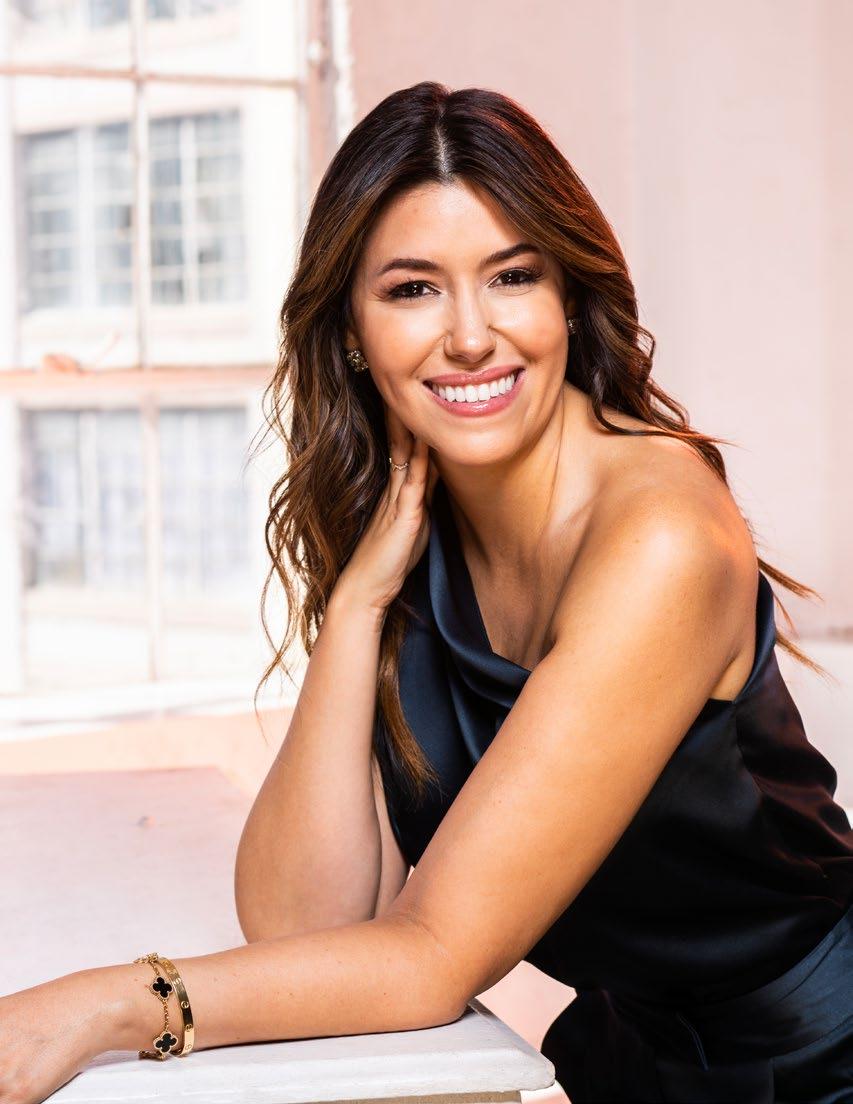

and fashion guides. It’s not something with which she’s all that comfortable, let alone something she set out to do. This is where she is now, however, and she will use her newfound celebrity to inspire women (especially Latinas) to pursue their dreams.
There are some parts of Vasquez’s early life that would make for good television, however. Vasquez and her sister Shari are the daughters of immigrants. Their father came from Colombia, and their mother was a passenger on the “Freedom Flights” from Cuba in the sixties. Vasquez’s parents met while learning to speak English together in Los Angeles.
Vasquez’s father began his career working the night shift at a local Los Angeles Hilton Hotel front desk. He eventually earned his way up to overseeing all of the Hiltons in Central and South America.
“Our father traveled an incredible amount,” the attorney remembers. “We used to joke that his commute was to and from LAX. But both he and my mother instilled a sense of hard work. We both did well in school, which was a significant point of pride for them, because they were able to provide an education in the United States for their daughters.”
While Vasquez’s mother stayed at home to raise her children, she didn’t seek the same for her two girls. They were both encouraged, heavily, to become professionals in their own right, with Vasquez becoming a lawyer and her younger sister serving as a pediatric physician.
“My mother always said, ‘We may not be leaving you with a lot, but we’re going to leave you with an education,’” the lawyer says.
There is one detail of Vasquez’s upbringing that is unrelatable. Because their father
worked so often, the family routinely lived in the Anaheim Hilton and Towers at least a week or two out of the month.
“We didn’t realize how lucky we were, just two girls running around a hotel,” Vasquez says. “But we also had to grow up quickly, because this was our father’s place of employment, and we learned that how you present yourself isn’t just a reflection of you but of your entire family. We had to grow up very fast in that way.”
But that didn’t keep Vasquez from finding her voice. The future attorney to the stars would get up at the Hilton’s on-site restaurant with in-house musicians Victoria and Jerry to sing “Part of Your World,” likely melting everyone’s hearts and foreshadowing her own time in the spotlight.
After graduating from law school, Vasquez had a choice to make. Would she return to her family’s home in Orange County or venture into LA proper?
“My first job was not going to pay that much, so I made the responsible decision to come back home to Orange County,” Vasquez says. “It turned out to be a wonderful decision, because it was a fantastic place to learn. I really got thrown in the deep end: I did my first deposition in my first year of practice. I got to do my first trial at that job. I’m not sure I would have had those opportunities had I gone straight to one of the big, white-shoe firms.”
Despite her experience and expanding practice, Vasquez had intense reservations
about the track her life was taking. The intense hours, the incredibly hard work, and still not being able to afford to move out of her family’s home was taking its toll on the young lawyer. But she stayed the path. In 2018, she joined the firm Brown Rudnick, and the rest is highly publicized history.
Vasquez had just arrived at Brown Rudnick when senior partners asked her to work on a new case going to trial in three months’ time in document and trial team prep. The partners invited her to meet their client, Johnny Depp, in Los Angeles. “I think the reason we hit it off so well was that I wasn’t really familiar with his work,” Vasquez says. “I still haven’t seen, probably, most of

I WAS ABLE TO ACCOMPLISH SOMETHING ON A NATIONAL STAGE WHEN PEOPLE MIGHT HAVE NOT THOUGHT OF ME AS THE FIRST CHOICE FOR THE JOB.




his films. Not that I’m not a fan, but I just wasn’t a super fan.”
The lawyer handled all of Depp’s litigation from then on. She got to know his business, and more importantly, his life. The defamation case was a chance for her to act on behalf of someone who had truly become a friend. That was never more apparent than in her viral cross-examination of Amber Heard during the trial.
“This goes back to being an advocate and being a friend,” Vasquez explains. “I had the opportunity to confront someone that had committed so many wrongs toward my client, and I was able to be his voice in that moment. It was a chance to demonstrate all the inconsistencies in [Heard’s] testimony and reveal who the real bad actor was. It was something I will never forget, and I thank Johnny for trusting me to do it.”
Vasquez says engaging in a trial this personal for Depp raised the stakes. Given
her successful trial outcome and full dance card of high-profile clients, she says working with Depp has taught her a very valuable experience about those who live under the spotlight of fame.
“This sounds cliché, but you do have to understand that these are still real people with problems,” the attorney explains. “Some of them might seem bigger or more expensive, but they are still problems that affect a person, the human being, the same way that they affect you. For me, it’s important to understand what’s really bothering them about these problems. I still use the same criteria when vetting my clients. It’s important for me to get to know the person I’m representing, so that I can do my job well and make their voice heard.”
to the stars, but even she had to experience her first trial at some point. She winces when asked.
“My first trial . . . I lost that trial, actually,” Vasquez remembers, smiling. “But it taught me so much about what’s important to a jury. I was able to voir dire the jury and help select who was going to be on the panel. It really taught me about trusting my gut. I think I have a good sense about people, and that first trial taught me to trust it. It was a turning point for me.”

When asked about formative lessons learned from her Cuban mother and Colombian father, Camille Vasquez is very reflective.
“While my mother stayed home and my father very much acted as the head of the family, they didn’t encourage us to live those gender roles,” Vasquez says. “My parents, especially my mother, encouraged us to lead whatever kind of life we wanted. I don’t think there’s anything harder than staying home to raise children, and I think she wanted us to have the opportunity to do something different if we chose.”
THE BEST PERSON FOR THE JOB
Vasquez says that whatever path her career took, her goals remained the same: inspire her community, especially young women. She hopes that her big moment in the spotlight can inspire Latinas to believe that they don’t have to have a certain kind of last name to become successful. Their hair doesn’t have to look a certain way.

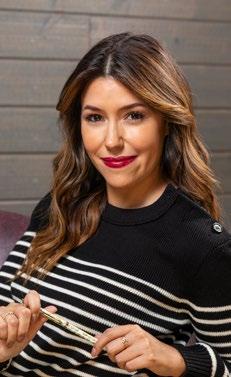


“I was able to accomplish something on a national stage when people might have not thought of me as the first choice for the job,” Vasquez says. “I was given the opportunity, because I was the best person for the job. I was the hardest working, and I was the most prepared. I hope what translates here is that if you work hard and find some opportunities, you can rise to the occasion.”
The lawyer recognizes that being of Hispanic descent means, at least statisti-












cally, that there will be more challenges thrown her way. She knew it required her to overprepare and overdeliver, but that preparation also gave her the confidence to forge forward.
Vasquez says she regularly seeks out inspiring people and studies them; she’s a student of style and communication. Whenever she finds something that makes sense for her, she adopts it as her own. The lawyer hopes younger women may be able to take a thing or two from her approach and apply it to their lives.
And while her phone won’t stop ringing, Vasquez says the same things remain her north stars: her family, her friends, and her job.
“I’m so grateful to still have my parents and to be able to go to them for advice,”
Vasquez says. “I can ask my mom what I should wear to an event or ask my dad for career advice. They’re on my own board of directors. Everyone should have a board, and I’m so lucky I can count my family on mine.”
That leads to the last question: What advice would Vasquez like to give a younger version of herself? The one struggling in the job, unsure if the law was the right choice?
“The first is that everything is going to be all right,” Vasquez says, laughing. “That’s a big one. And as simple as this may sound, I would just tell myself to keep going. Keep doing what you’re doing. Keep working hard, because that work will pay off. And finally, stick to your convictions. In all things, stick to your convictions.”

hope in our community, but the best leaders don’t just collect degrees, they embark on a lifelong journey of learning about themselves and those around them.
 Lauren Lopez National Women’s Soccer League
Lorena Peñaloza University of California at Riverside 8.
Lauren Lopez National Women’s Soccer League
Lorena Peñaloza University of California at Riverside 8.

 By Marcos Chrisholm
By Marcos Chrisholm
Lorena Peñaloza turns her legal expertise into a cornerstone for better communities as the chief campus counsel for UC Riverside
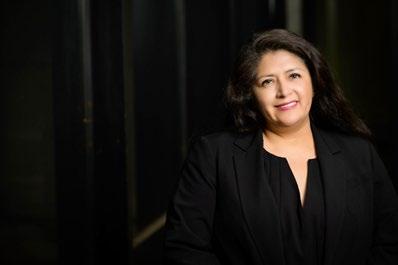




She launched her career at the Social Security Administration’s Office of the General Counsel in Maryland through the prestigious Presidential Management Fellowship. She spent years rising up the legal ranks of the two largest public university systems in California. And she served as the chief campus counsel at University of California, Santa Cruz before transferring to University of California, Riverside in January 2023.
The executive is wired to always think about how she can leverage her position to serve the public, and that includes how she saw her role at UC Santa Cruz in 2022 (at time of this interview).
“I describe this role as sort of being a city attorney for a mini-city with some added layers,” Peñaloza says.
On the surface, that sounds like a bold take. Yet, Peñaloza was also a former assistant city attorney for the City of Santa Ana, California. With over eighteen thousand students enrolled at UC Santa Cruz, a population greater than a lot of small American towns, Peñaloza’s role advising students, adminis-
trators, and faculty on their legal matters is no small feat. “Most of the attorneys [at UC Santa Cruz] provide advice and counsel on a wide range of issues,” she says. “On top of that, we have academics here, students, and people who live on the campus.”
Of course, Peñaloza was not alone in her journey. She led her own team of lawyers and support staff paralegals that delivered full-service capabilities despite a lean headcount. By hiring diverse talent that practiced more than one area of law and had a knack for problem-solving, she positioned her office to do more with less while collab orating at-scale.
“This philosophy is not unique. It’s modeled by the general counsel [Charles Robinson] for the UC system,” she explains. “[It] is very much about being in a collabo rative legal office, and it’s one of the reasons that when the position opened up, it felt like such a great fit.”
Peñaloza knows she’s not the first leader to build a collaborative and cross functional team. However, unlike executives who credit


Lorena Peñaloza has dedicated her legal career to public service.
their ability to say no as a key to their success, she centers her management style around finding “a path to yes” for her clients. “My goal is not to tell them no unless it’s truly unlawful or unethical or something like that,” Peñaloza says. “My goal is to figure out how can we get them to where they want to be with the most acceptable amount of legal risk. Ultimately, they get to make the call.”
Meanwhile, Peñaloza did more than just let her clients call their own shots: She remained dedicated to UC Santa Cruz’s commitment to diversity, equity, and inclusion (DEI) efforts. She lent her voice to boost diverse representation on internal committee. She also helped implement DEI best-hiring practices that she leverages in her own candidate searches. In fact, many of those practices are now being adopted more widely across the university.
“That understanding and perspective informs how we see and deal with diversity issues through DEI best practices . . . that best serve not just the campus, but it

“Sometimes, especially as we’re starting out in a career, we’re more timid about voicing our thoughts on issues that hit close to home, [but] it’s really important for us to have the courage to do that.”
As the eldest of four siblings, Lorena Peñaloza set the tone for how they could each serve the community through their professions. Today, her brother, Luis, is an electrical engineer at the California Department of Transportation; her sister Marisol is a nurse at Tufts University, and her sister Bianca, the youngest, is an assistant US attorney for the Southern District of California.
“We all tried to stay on top of politics or try to continue to have that influence, at least locally, in our family,” she says. “We all have different grades of involvement externally. But I think that in public service, we [saw] the value of it growing up in part because we also just [saw] people who look like us. Public service impacts the Latino community greatly.”
best serves our clients and our community,” Peñaloza says. “If those issues are important to us, as they should be, then it's an important contribution that we [can] provide.”
Additionally, Peñaloza helped UC Santa Cruz, with a quarter of its student population as Chicano or Latino, perform its due diligence on initiatives to pave the way for more Latino students to enroll and graduate. “Particularly in higher education, we’re working really hard in terms of growing the number of Latinos represented in higher education,” she says. “What that really means [is that] it’s not just recruiting, but also retaining our students, and trying to recruit and retain faculty and staff that reflect those numbers.”
Despite the fact there are more Hispanic and Latino college students than
ever, less than nineteen thousand managers at US colleges and universities identify as such. Peñaloza offers her advice on what Latinos should keep in mind when pursuing a career or degree in higher education. “Sometimes, especially as we’re starting out in a career, we’re more timid about voicing our thoughts on issues that hit close to home, [but] it’s really important for us to have the courage to do that,” she reflects.
“Because we are in the room.”
Peñaloza’s message reminds this writer of the age-old adage: Ponte las pilas.
“Whether we like to think about it or not, we are seen as representatives of our community, even if we don’t want to take on that responsibility,” she says. “So, it’s important to keep those issues that impact our community in the forefront of our thoughts.”











Matthew Whitworth-Howe helps L’Oréal, the world’s largest beauty company, change cosmetology by creating a path to higher education for beauty professionals everywhere



MATTHEW WHITWORTH-HOWE thought he might study acting but changed his mind as college approached. Instead, he combined interests in American history and European fine arts to graduate with a degree from the Gallatin School of Individualized Studies at New York University. It’s not surprising that an executive who crafted his own major would later have an innovative vision and strategy to bring new educational opportunities to underserved communities.
As assistant vice president at L’Oréal, Whitworth-Howe partnered with ROLFS Global Institute to launch the very first collegiate degree program for beauty professionals. Originally founded as a hair color business by Eugène Schueller in 1909, L’Oréal has grown to include 90,000 employees and 34.3 billion dollars in annual sales to support its growing international presence. Its brands and subsidiaries include Garnier, Maybelline, CeraVe, Redken, and the Body Shop.
The status of L’Oréal as an undisputed industry leader means that it can make a real difference. Whitworth-Howe, who came to the organization in 2008, is helping the company do just that as it invests in the future

and trains highly specialized stylists to thrive in a complex and evolving landscape.
The nation’s 1.2 million hairdressers were previously capped by a cosmetology school license, with few possessing a two- or fouryear degree. Leaders at L’Oréal Professional Products Division are changing that reality and challenging the stigma that beauty is a less noble vocation that requires little skill. “We’re taking beauty from a trade to a profession. Beauty professionals do so much more than just cut or color hair,” Whitworth-Howe says.
In recent years, Whitworth-Howe and his colleagues at L’Oréal Professional Products Division have worked behind the scenes in partnership with ROLFS, Mesa Community

College, and Arizona State University to create the LEAD program. LEAD students can complete their training and receive an associate’s degree in two semesters or a bachelor’s degree in four.
Those who enroll receive more than just online classroom instruction—they also interact with industry professionals, connect with advisors, and get personal professional development training. The curriculum includes courses such as Salon of the Future, Evolution of the Beauty Profession, and Transformational Leadership Development.
Whitworth-Howe knows just how needed and valuable this type of knowledge is. He spent portions of his career in the field
After holding various marketing roles, Whitworth-Howe asked for an international assignment and spent more than a year launching the professional brand matrix, or HQ, in Mexico. The task required him to understand the cultural preferences, nuances, and factors in play while working with distributors and business owners.

He returned to the US in 2014 and later trained sales teams to work with customers as true business partners. Instead of pushing one product or line, his teams dedicated themselves to offering creative and holistic business solutions. L’Oréal Professional Products Division signed a contract with Summit Salon Business Center in 2016 to offer a full array of services and to implement
the necessary systems and processes to make salon companies more profitable.
Today, Whitworth-Howe manages the partnership with Summit and L’Oréal’s Salon Emotion program, which teaches salons how to offer the best guest experience possible. “We’re dedicated to educating beauty professionals to help them succeed. Cosmetologists often stop their education when they earn their license and then work behind a chair and try to build a client list, but they don’t always know how to run a business. That’s where these programs come in,” Whitworth-Howe explains.
After nearly fifteen years with L’Oréal, the veteran leader still finds new challenges to tackle and new ways to develop in his career. The large company has maintained an entrepreneurial spirit that empowers him to do so.
“I’ve learned that a career doesn’t always need to be one that goes straight up the ladder,” he says. “You can and should take different paths, because that helps you get various valuable
experiences. You can still get to the top, and you’ll be more well-rounded when you do.”
Founder Eugène Schueller had a saying in French that loosely translates in English to “Do, undo, do better.” Whitworth-Howe has used the saying as his personal motto at L’Oréal as he tried new things, learned from missteps, and aimed to make valuable contributions. “Risk taking is encouraged here. That’s how you innovate,” the assistant VP explains.
Whitworth-Howe says L’Oréal Professional Products Division has big things planned. The company has already enrolled more than two thousand students in its LEAD program and will continue to expand its offerings and grow internationally. After all, it is seeing how it impacts the lives of those who participate. “I’ve seen salons and stylists grow and develop in new ways through this program,” Whitworth-Howe says, “And it’s great to know that I’ve had a role in helping them fulfill their dreams.”
We’re taking beauty from a trade to a profession. Beauty professionals do so much more than just cut or color hair.”
 By Zachary Brown
By Zachary Brown
didn’t have many guides on her early professional journey, so she’s made it her mission to open doors and share her story with underrepresented and first-generation talent


LAUREN LOPEZ THOUGHT SHE WOULD go into nursing. She attended a high school that specialized in health and human services, and nursing offered a path that not only served people but also provided stable work that her family would be proud of. Career conversations in immigrant and minority households often center around steady pay and not making a lot of waves.
But when it came to registering for her nursing practical, Lopez was advised that trying to work while studying would be impossible. “I was living on my own and paying for my education,” she explains. “There wasn’t an option to not work, so I had to find an alternative path.”
A pivot into human resources—a recommendation from her college advisor—led Lopez to her purpose. “My advisor explained that human resources was responsible for serving people in the world of work, ensuring that they had what they needed to be successful and thrive,” she says. “I found this very compelling and jumped in feet first.”
In the seventeen years since, Lopez has held various roles across the HR function for major organizations such as Bloomberg, NBCUniversal, Condé Nast, the NBA, and

the New York Times. As the Times’ first senior vice president of talent management, Lopez and her team led efforts around employee performance, professional development, and diversity, equity, and inclusion (DEI).
Despite working for well-known companies, Lopez remembers what it was like to feel “less than” along her professional journey in corporate America.
“Walking into the corporate world with little to no guidance is hard for anyone but specifically underrepresented and firstgeneration talent,” Lopez says. “We often feel and carry our differences more heavily than others. Perceived deficits in the socioeconomic, cultural, educational, and professional realms may stoke insecurities that undermine potential and in turn impact performance. What was key for me was understanding how my differences set me apart or prepared me for the road ahead.
Helping others find their way became my own personal mission.”
Her first corporate role was at Bloomberg developing campus recruitment programs. It was an incredible opportunity to support and elevate early career talent from all walks of life. While loving what she did, Lopez struggled with feelings of inadequacy as she compared herself to her colleagues. She didn’t go to an Ivy League school, intern, or study abroad, nor did she have a network to propel her in the early days of her career.
But she did have a willingness to work hard, learn, and execute. With time and key mentors, Lopez reframed her thinking. “My experience wasn’t less than, it was different,” she says. “I was beginning to acknowledge my own worth.”
She began sharing what she was learning in real time with the candidates she was connecting with, including networking tips,
leadership table or giving an employee quality facetime with executives—that executives can offer support and increase pathways to growth.
communication styles, mock interviews, editing résumés, and travel tips. “It was important for me to make these individuals feel seen and supported to afford them a smoother experience than mine,” she says.
Lopez built a roster of incredible mentors that she still taps into today. Her mentors were leaders, peers, and in some cases direct reports who shared the ability to teach and model the skills she wanted in her own tool kit. Though her parents didn’t attend college or hold offices in large skyscrapers, they taught her the power of servant leadership, resilience, and the importance of bringing others along with her.
She’s brought her mission of helping and mentoring others throughout her career, most recently at the New York Times. Lopez had the opportunity to influence how one of the world’s most notable media brands onboards, trains, develops, and grows its
talent. She defines her work as “ensuring that every employee has equal access to the opportunities and tools that will help them thrive in their careers.”
The New York Times has stated its goal to increase the number of its Black and Latino leaders by 50 percent before the end of 2025. Doing so, Lopez notes, furthers the organization’s efforts to create a diverse and inclusive culture to better equip them to serve its wide-reaching audience.

Part of Lopez’s success lies in her willingness to make the time to get to know talent across an organization. “Leaders have to be intentional about forming relationships at all levels, so they can really understand needs and uncover how they can support others,” Lopez says.
Big steps like tapping someone for a leadership position matter. But it’s the more organic gestures—speaking someone’s name at a
This year, Lopez has brought her mission and culture-building expertise to the National Women’s Soccer League (NWSL), where she is the first chief culture officer and its first Latina C-suite leader. In this role, she identifies, develops, and implements HR strategies, initiatives, and best practices across the league and club ecosystem. It’s an opportunity to help the NWSL create “a community and culture where all feel safe, supported, and set up for success,” she said in a statement.
Her experiences balancing school, financial security, and living independently prepared her for this journey sooner than most—and it is core to the leader she has become, Lopez notes.
“I have had the unique opportunity to influence how some of the world’s most notable organizations onboard, train, develop, and grow their talent,” she says. “Ensuring that every employee has equal access to the opportunities and tools that will help them thrive in their career is critical and a responsibility I do not take lightly.”

As CEO and founder of Chipper, Tony Aguilar helps college graduates “chip away” at their student loan debt

HIS BUSINESS CARD READS “I WAS blessed with $100K in student loan debt.” Most would view that much debt as a burden. Not Tony Aguilar. “If it wasn’t for my experience in having to deal with that much debt, I wouldn’t be doing what I’m doing today,” says Aguilar, the CEO and founder of Chipper, an app that allows student loan borrowers to analyze, manage, and pay back their student loan debt. As its name implies, Chipper helps college graduates “chip away” at their debt.
Student debt is a massive problem, and Aguilar wants to be a catalyst for change. “The government is trying to solve it, but they’re essentially putting Band-Aids on the issue. Just kicking it down the road instead of trying to solve the epidemic,” he says.
In addition to being “blessed” with $100,000 in student loan debt, Aguilar was blessed with parents who insisted he go to college, though neither of them completed high school. “They understood that education is a gateway to living a better life and making a better income,” Aguilar says.
Since attending college was a forgone conclusion for him, he embraced his college
experience as an adventure. Born and raised in a small Texan town, he refused to apply to Texan schools. “I wanted to get away, as far as I could to see what was out there,” Aguilar says. He passed on the Ivy Leagues and instead chose the University of Indiana for its prestigious business school and size. “I really wanted to find myself and just experience people from all different cultures and be somewhere I can experience life at a bigger scale.”
With a degree in finance and economics, Aguilar came back to Texas and founded Chipper. Typical Chipper users can have a dozen loans, and up to eighteen if they attended graduate school. Chipper helps users find the 150-repayment forgiveness loan consolidation options out there in the market. Once users link their loans in the app, Chipper’s algorithm takes over, showing them the forgiveness programs for which they qualify. “It’s a very modern tool to help people understand their options and enable them to take action in just a couple clicks,” Aguilar says.
Chipper automatically enrolls users in the loan forgiveness program that they choose. “We handle all the paperwork after the

signatures and any other forms necessary to ensure they get into the plan,” Aguilar says. To date, Chipper users have qualified for over $250 million in loan forgiveness. “This is a life changing financial situation for so many people. Some of our members have had $50,000, $65,000, $100,000 forgiven,” he says.
The users who fail to qualify for any loan forgiveness programs can chip away at their college loans by linking the credit cards they use to make daily purchases in the Chipper app. Each time they make a purchase or enjoy a meal, the app rounds up their transaction to the nearest dollar and applies it to their student loans. “So every day they’re chipping away little by little,” Aguilar explains.
To get Chipper aloft, Aguilar turned to angel investors who shared his vision and believed in him. But as Chipper grew and required more financial runway, he was forced to turn to venture capitalists, some of which were reluctant to invest in a company started by a Latino. “Those conversations and the environment of those meetings changed dramatically,” says Aguilar,
comparing the pitches he made to VCs to the ones he made to his angel investors.
Fewer than 2 percent of all VC capital goes to Latino founders and just 2 percent of VCs are Latino. “That correlation is there . . . People end up investing in people they can relate to and people they connect with . . . Until we get more Latinos into seats on the other side of the table—into VC funds making decisions on where they inject the capital—we’re not going to see a shift in the dollars going to Latino founders,” the CEO says.
As a community, Latinos must be more proactive about helping other Latino entrepreneurs. When he’s not running Chipper, Aguilar expends considerable energy helping Latinos and other founders with backgrounds like his, living by the philosophy, “As I climb, I pull.” Wherever he can open a door and make an introduction for these founders, he does. “The hardest part is getting into the room with these VCs. Once you’re in the room you can showcase your skills and your passion,” Aguilar says.
“
If it wasn’t for my experience in having to deal with that much debt, I wouldn’t be doing what I’m doing today.”

 By Zach Baliva
By Zach Baliva
Marissa Solis is writing a new playbook for how to diversify the National Football League’s fan base, give back to communities, and transform in step with America’s changing demographics

 Marissa Solis
Marissa Solis
THERE WAS A TIME WHEN MARISSA
Solis thought she would become a US ambassador. The proud Mexican came with her family to the Rio Grande Valley at age ten and fell in love with the idea of studying at Georgetown University. She managed to get a full scholarship and studied foreign service, development economics, and international development. But when a dean encouraged a young Solis to consider the influence she could have in the corporate world, she changed paths and went on to lead marketing efforts at iconic organizations like Procter & Gamble, PepsiCo, and the National Football League (NFL). Her original dream didn’t die; it evolved. Instead of working as an ambassador for her country, she’s making a global impact as an ambassador for her community.
While moving from the halls of a top-ranked international relations school into the office of a leading consumer goods corporation might seem like a leap, Solis was a quick study. She had never studied
marketing and branding when she landed an entry-level job as an assistant brand manager for one of Procter & Gamble’s laundry and paper businesses. She soon found herself working in Puerto Rico as part of a LATAM division and had the opportunity to lead her first major marketing campaign.
That’s when Solis learned that she would have to navigate bias, defy expectations, and claim her place in corporate America. She remembers walking into a creative agency to present her plans for a brand only to find a room full of older white men. When a partner advised her to grab coffee with his admin while the men talked business, nobody, including her male boss, stood up for her. Solis had to stand up for herself. She did not leave, led the meeting, and won their business. “As a young Latina in the American business world, I had to open the door to opportunity myself,” Solis says. “I had to show that I am here to play.”
That moment set the tone for Solis’s entire career. She’s maintained a

mentors, colleagues, peers, and supporters. “My mission became branding myself, giving others a voice, and lifting up the Latino community,” the head of global brand and consumer marketing says, adding that she’s been able to leverage her network for those purposes over the course of many years.
By 2000, Solis, who has also worked on political campaigns and in numerous volunteer positions, had completed a master’s in public administration and public affairs at the University of Texas. In 2003, she started an eighteen-year stretch at PepsiCo. During that time, she created a Hispanic business unit and helped the organization sell to Hispanicowned stores and businesses while marketing to the Hispanic community.
During her tenure at PepsiCo, Solis was instrumental in forging a partnership with Bad Bunny, the Puerto Rican rapper, singer, and global sensation. Together, they created the Deja tu Huella campaign. Cheetos and Bad Bunny gave $25,000 grants to 20 individuals who make a positive contribution to
Hispanic communities in the US and Puerto Rico. Deja tu Huella was an evolution of the Cheetos Estudiante Fund, created with the singer’s Good Bunny Foundation the previous year.

Her ability to leverage powerhouse brands for good makes Solis proud. “I experienced the American dream thanks to the sacrifice of my parents, and I get to use my experience to not only sell products but help people give back. We’re using platforms to give others a voice they wouldn’t otherwise have,” she explains.
In late 2021, the NFL recruited Solis to lead its global brand and consumer marketing group. Although the veteran leader had
planned to perhaps retire with PepsiCo, the chance to influence four hundred million sports fans around the world was too tantalizing to pass up. Now, she’s leading marketing relationships with major broadcast partners, managing social media campaigns, helping the league give back to its communities, and working to make the NFL more diverse.
That last part is key. “I was hired to do many important things as the NFL transforms, and one of those things is to help future-proof the league,” the executive says. Today’s league is big and powerful. It enjoys rabid support from a massive audience—but 60 percent of that audience is both white and

over the age of thirty-five. The America of the future will be young and multicultural. Solis knows she has to help the league evolve to match the country’s changing demographics.
Solis isn’t thinking only about numbers; she’s also thinking about potential. “I don’t want to simply make the league cool and relevant; I want to think about how we can lift up underserved communities and do more good as we grow,” she says. Solis and her colleagues are rolling out a “helmets off” strategy to showcase NFL players in a more relatable way and help them engage fans through verticals like music, fashion, gaming, food, and culture. Today, the NFL has twenty-five million followers on Instagram and is rapidly growing its TikTok footprint in partnership with players and influencers.
The NFL has seen its share of public relations challenges in recent years, with everything from controversial calls to cheating allegations to high-profile injuries. Players have been charged with crimes and fans have debated national anthem protests. Solis knows that some of her efforts to promote
diversity and break new ground may be met with resistance. She plans to stand up to it like she always has. “Given the nature of our fan base, half will love and half will hate anything you do, but we have to follow the data that says our nation is getting younger and more passionate about social issues,” she says. “We can’t shy away from the issues that matter to the communities we serve.”
While NFL players do their battling on the gridiron, Solis battles off the field. She’s scraping and clawing for yardage just like they are. And like them, she makes any negative reaction into her own motivating bulletin board material. “The naysayers only fuel me and serve as affirmation that I’m in the right place. I belong here,” Solis says.
And her work does not go without recognition and respect from her colleagues.
“Marissa Solis is that rare leader who

effortlessly evokes both love and respect. It undoubtedly comes from her ability to inspire people, her contagious optimism, her big-picture thinking, and [her determination to] never settle for ‘good enough,’” says Rose Kaur, managing partner at Jester&Genius. “She exemplifies the best qualities of a coach, a champion, a teammate, and a fan who gives it her ALL, both on and off field.”
Solis watched the 2022 NFL draft with great interest. With the eleventh overall pick, the New Orleans Saints picked Ohio State wide receiver Chris Olave. Olave was the only Latino picked in the first round. Still, the entire draft produced the biggest class of Latinos the NFL has ever seen. Solis says that’s a step in the right direction and says football fans can expect to see more progress with her under center.
“
As a young Latina in the American business world, I had to open the door to opportunity myself.”
At Jester&Genius, we believe that there’s one thing that separates good brands from the truly great ones. And that is Story. By harnessing the power of story, we have created a revolutionary new approach, both intensely human and strategically actionable. One that speaks to the heart, convinces the mind and brings steady, heady growth for your business.

To learn more about our compelling results, drop us a note at hello@jesterandgenius.com www.jesterandgenius.com

George Pauta draws on the lessons learned early in his career to teach the next generation of lawyers and help Sweetgreen achieve its mission to build healthier communities by connecting people to real food

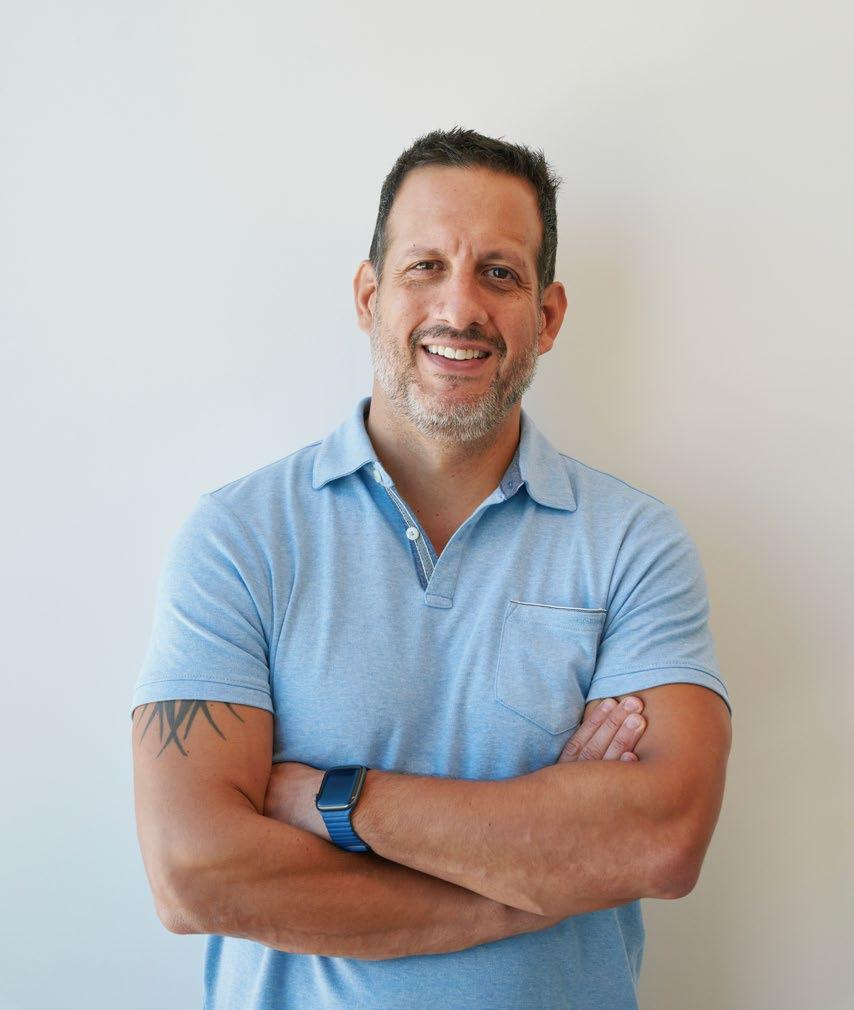


WHEN ASKED ABOUT HIS PHILOSOPHY, “the importance of failing and growing to love it,” George Pauta admits that he has failed many times early in his career and that growing to love it came much later.
One of Pauta’s failures, or at least that’s how he perceived it at the time, occurred when he graduated from law school. After maintaining high honors throughout college, graduating from a top twenty law school, and passing the New York State Bar Exam, Pauta couldn’t land a job.


“It reflected my upbringing and the lack of resources and professionals around me. Even though I was in law school already, I only knew how to succeed in academia, which was self-taught. I didn’t have the mentors to teach me how to be successful as an actual lawyer,” Pauta reflects.
As a first-generation American, Pauta grew up in a single-parent household in Long Island, New York, without many examples of success to look up to. So, for the early part of his life, Pauta set the bar
low and dreamt small, but his older brother changed all of that.
“He was the first person who believed in me. It’s so cliché, but the power of someone believing in you is transformative,” Pauta explains. “If he said I could do something, I would give him a million excuses for why I couldn’t. No matter what excuse I threw at him, he would always say, ‘So what? You’ll figure it out.’ I could never convince him that I couldn’t.”
After graduating from Western New England University where he played base ball, the support from his brother encouraged him to attend law school at Boston Universi ty. But then, when he graduated law school and found himself back at his summer job of moving furniture and doing some temp legal work, he again used his brother’s two words: “So what?” to deflect any of his self-doubts.
Seven months post-graduation, Pauta landed his first job at a private practice doing what he thought he’d spend his career doing. But, in 2016, he was recruited to his first
in-house role at a financial services firm, and in 2020, Pauta had the opportunity to go in-house at Sweetgreen, a not-so-typical fastfood chain that is headquartered in LA.
Already a fan of the company’s product, its mission, and its story, it made perfect sense. Not only for Pauta but his wife, a California native, and their growing family. Nevertheless, after making it down to the final two candidates, he didn’t get the job.
“The path of every successful person is checkered with failure. If you want to impress someone, you can tell stories that focus solely on your successes but that won’t resonate,” Pauta says. “If you want people to really connect to your story, you must also share your failures. And when I think of the younger generation trying to navigate their paths, they need to hear your whole story, especially the failures.”
It wasn’t the first, nor the last, time that Pauta fell short of his goals. “There are moments of doubt and questions of worthiness that accompany every failure. You have to push through those moments and instead, take stock in all that you have achieved that helped put you in the position to have an opportunity to fail in the first place,” the executive says.
So, despite the unfortunate news, Pauta sent an email to his would-be boss to express his gratitude. Then, he moved forward by focusing his attention on another goal he’d already set in motion to enhance his chances of moving to California: passing the California State Bar Exam, the lowest passing bar exam in the country and one which he’d failed once before.
As Sweetgreen reimagines American fast food from a convenient option into one that can also be healthy, fast, fresh, and friendly, the company is laser-focused on consistency and scaling across the seventeen markets in which it operates.

George Pauta is a critical part of the legal effort behind this goal. Since joining Sweetgreen, he has built the company’s employment law function from the ground up. In doing so, he’s placed a special focus on building out repeatable and sustainable processes for long-term growth to create a better experience for its teams.
His push to pivot the company’s compliance work from manual to automated by leveraging technology solutions fit for the dynamic food landscape is just one example. “This can be a tricky endeavor,” Pauta says, “but when you have great crossfunctional partners who all care about the company’s compliance measures (especially how these measures impact our team members), that makes my job quite impactful and satisfying.”
But, about two weeks into his studying, Pauta got a call from Sweetgreen. The other candidate had declined their offer, and now the job was his. “Many of my friends and colleagues were like, ‘Great. You don’t need to retake the California Bar.’ But I’m not one to quit halfway through a goal: I still took it.”
After everything, it all worked out. Pauta took the position as the associate general counsel of labor, employment, and litigation at Sweetgreen, where he gets to be a part of its work in reimagining “fast food” so customers can have real food made to order that is fast, friendly, and fresh.

Not long after that, Pauta got the news that he had passed the California State Bar Exam.
Now, Pauta seeks opportunities to mentor kids and first-generation law students from low-income environments, including through programs at Sweetgreen and Boston University. “It’s a big thing for me because I identify with many of them,” he says.
“The biggest impact mentors have had on me, starting with my brother and throughout my career, was that they saw more for me than I saw for myself,” he adds. So now, not only does Pauta get to be that person for his mentees, but he also gets to bring them all the knowledge he has learned through his mistakes, so they don’t
“If you want people to really connect to your story, you must also share your failures.”
The philosophies of innovative leaders have the power to inspire and spark change. Read on for the thought-provoking insights of these successful executives.
150. Julian Santos, Christianbook 155. Edgar Gonzalez, Cboe 157. Leandro Palencia, Wedbush Securities 161. Emilio Escobar, Datadog 164. Refugio Fernandez, Dropbox 168. Raoul Cantero, White & Case 173. Mario Cabrera, Boehringer Ingelheim Animal Health, USA 179. Manuel Vasquez, JLLHow a passion for knowledge led Julian Santos to bring operational efficiency to Christianbook as its vice president of operations

JULIAN SANTOS
LOT of long days in his life. As a young adult in Brazil, he attended two technical schools at once. During the day, he went to an agricultural school. After wrapping up, he would rush home, shower, and then jump on a bus to go to chemistry school in the next town over. His day, which had started at 7:00 a.m., would end as he rode the bus home at 11:00 p.m.
“I’ve always had a passion to learn the most that I can from anything in life,” he says.
And that was just the start. Armed with two technical degrees, he went on to college for agricultural engineering. His parents made it clear to him growing up that if he wanted to be successful, he needed to work hard for it. “Education was a big piece of that,” he says.
Santos’s disposition to soak up knowledge has extended well beyond his school days. He started his career in operations as a delivery driver for a major grocery store chain in the United States. As he worked his way up in the company, from driver to distribution center manager and “operator of the year,” Santos was always asking questions about each division and process.
“I knew that learning it all would pay dividends in the end,” he says.
He has certainly received those dividends and is now the vice president of operations at Christianbook, an online retailer for Christian Bibles, books, gifts, and more. He was excited by the opportunity to move to a direct-to-consumer environment and join a forty-five-year-old company that has been voted a Massachusetts Top Places to Work for eleven years and counting.
“I felt I was coming to a great place,” he says. “And that hopefully I could help it do even better.”
Along with his day-to-day tasks of managing shipments and overseeing the customer service team, Santos always works to make things more efficient.
“We are looking at, ‘How do we reduce delivery times? How do we streamline processes? And how do we think outside the box to find solutions that are vital to the operation?’” he says.
He does this not only for the sake of the business but also for the sake of his team. Along with several new projects and initiatives, he is now looking for ways to make their jobs less physically demanding. That includes installing a height-adjustable receiving line, as well as looking at how to optimize item slotting across the distribution center.
“I want to find that perfect zone for associates who are traveling back and forth and up and down,” he says.
The physical and mental state of the team has always been a priority for Santos. He makes sure they know their ideas are

“I’ve always had a passion to learn the most that I can from anything in life.”
valued, and he is not afraid to become the student again, learning from his employees. Growing up in Brazil, he says he realized at a young age the importance of operating collectively and getting the team headed toward the same goals. “I learned that collaboration takes things further,” he says.
It’s just one of many lessons he has taken from his heritage. Brazilian culture has also inspired him to challenge himself to always be better. “Some people say to dress for the job you want, not the job you have,” he says. “My philosophy has been to prepare yourself for the job you want, not the one you have.”
There was even a time during Santos’s twenty-plus-year career in operations when the job he considered was becoming an FBI special agent. He was looking at different
career paths and, on a bit of a whim, he used the knowledge he had picked up in technical school to take the test and was then admitted. It was an exciting opportunity that he ended up turning down when he learned he would have to give up his dual citizenship.
“I came from a country that I love, and I landed in a country I love,” he says. “So, it felt like it was not the right thing to do because I wouldn’t want to give up either country.”
And so the would-be special agent returned to a field he has thrived in, where he continues to honor his roots by promoting collaboration and being one step ahead. Santos says it’s all more than worked out.
“I’m really happy being at Christianbook,” he says. “We are one boat, one team together!”

“I learned that collaboration takes things further.”
fall in love with finance? For Cboe Global Market’s Edgar Gonzalez, it happened at the intersection of not one but two cash cows.
“When I was in high school, I worked part-time at McDonald’s inside [of] a Walmart,” says Gonzalez, now vice president of corporate strategy and mergers and acquisitions. “Walmart used to post their stock price for employees to see and updated it daily as the stock price moved. And I remember being fascinated by the concept of Walmart share price and what made it increase over time.”
In a sea of savings-obsessed Americans, teenage Gonzalez spotted the hottest commodity. It wasn’t the burgers he flipped, nor the fries that customers wanted with them. But the $WMT ticker represented an abundance of value and opportunity that inspired Gonzalez to live, breathe, and eat markets.
Gonzalez became the kind of highschooler who won their class’s stock trading competition. He graduated from Princeton University and started his career as an
investment banker with Merrill Lynch and Wells Fargo Securities. Then he carved out time to earn his MBA from the University of Chicago, which allowed him and his wife to be students together. While she got her PhD he got his foot in the door at Goldman Sachs. Before he knew it, he rose up in the ranks and got promoted to vice president.
He had finally arrived. However, as he evaluated a more senior path in investment banking, Gonzalez reconsidered his options and pivoted to a career in corporate M&A, where he felt his demeanor and skill set were a much better fit. He spent three years as a managing director at Nuveen, an asset manager owned by TIAA. Then he transferred to TIAA, the corporate parent, for another year, all focused on corporate development across the various business lines.
Once Gonzalez received a pitch of a lifetime to join Cboe as its senior director of corporate strategy and M&A, the rest was history. “It was an appealing pitch to me to join them because they were just finishing
up the integration and looking to be proactive strategically,” Gonzalez says. “And it just sounded like such a breath of fresh air to make a transition to a place that was growing, investing, and thinking strategically about its global footprint.”
Since Gonzalez entered Cboe in 2019, he has paved the way for the world’s largest options exchange to make deals that ensure its longevity. By solidifying himself as a sound leader and homing in on his strategic expertise, he navigated Cboe through acquisitions that added more asset classes to its product line and expanded the company globally into new markets.
Instead of offering false promises, the left-brained Gonzalez leads with a near-surgical logic. He nails down the details, and his affinity for reality keeps him down to earth while managing his staff. Because he brings a refreshing level of integrity to an industry and function that may have a different reputation, he grants more credibility to his team.
“I think that’s served me well throughout in a way, to lead by example,” Gonzalez says. “In that sense, we’re trying to do the right thing. We’re helping everyone make the right decision. We’re not here to ask for certain information because we’re trying to find a way to screw someone over there. Our history, our track record, and our demeanor all help reinforce that message.”
Gonzalez collaborates with Cboe teams across all the business lines and functional teams globally so often that they often consider him a member of each. Even if he moved to an in-house career just seven years ago, he shares his insights in a way that marks a grand departure from his days in investment banking.
“It’s been a great way to leverage that Cboe culture . . . my propensity to be a partner with different people to make it all

work,” Gonzalez says. “We’ve really been a collaborator with our functional teams and a partner with our business teams.”
Meanwhile, Gonzalez has delivered across almost ten deals during his tenure that have expanded Cboe into new geographies, new asset classes, and complementary capabilities.
The result? Cboe promoted Gonzalez to his current role as vice president of corporate strategy and M&A.
While Gonzalez forged his own path, he offers his two cents on boosting Latino representation in finance. “If there was just maybe more exposure earlier on in people’s career paths, I feel like there we can get more Latinos interested in pursuing careers in finance,” Gonzalez says. “That’s slowly changing. But it’s just knowing it’s an option. I think that would help a lot.”

“We’re helping everyone make the right decision . . . Our history, our track record, and our demeanor all help reinforce that message.”
Since announcing our Board Diversity Initiative in 2020, Goldman Sachs has helped facilitate the placement of more than 70 diverse board members. We believe that companies with diverse boards are better positioned for stronger financial performance.
Learn more about our Board Diversity Initiative.BY RUSS KLETTKE
Through a process of finding his own strengths and opportunities, Leandro Palencia built the career for him—and he encourages others to do the same

Palencia illustrates how great careers very often do not follow a straight, determined-from-adolescence path. Now vice president and corporate counsel at Wedbush Securities, he shares with younger people how they too can venture outside of and beyond their current career expectations—something first-generation students very often do not know they can do.
“There are very few of us with a Hispanic background who go into the corporate securities industry,” he says. “We gravitate to what we’re familiar with, what is in our upbringing. Not many kids see their parents working in the financial services world. If we go to law school, employment and immigration law is more likely.”
Now to be clear, Palencia’s parents were themselves well educated. His mother was a professor and his father an engineer, but even with those influences he initially struggled to identify what he wanted to do and what he might be good at. In his freshman year of college, he enrolled in a mechanical engineering program.
He quickly discovered he didn’t like it, noting, “I just didn’t enjoy physics very
much.” But a summer job with a financial services advisor gave him the career-altering idea to leave engineering behind. He found the industry and products so interesting that he changed his major to finance.
That then led to joining Wedbush after earning his bachelor’s degree. Palencia began as an entry-level associate credit and risk analyst, before moving up to department manager. Clearly, he was on an ascendant path in finance. But along came the global financial crisis of 2008, which led to the Great Recession for several years after that. He started thinking about getting a graduate degree and setting his sights on something different.
“First, I considered getting an MBA,” Palencia says. “But given the economic environment, it seemed to be a bad time for that. That’s when I started to consider getting a law degree. I knew it offered many new paths.”
So he took the LSATs, scoring well enough to qualify for admission to the Loyola Law School in Palencia’s home of Los Angeles, and he earned a partial scholarship.
Palencia enjoyed law school, where he was in a four-year program of night classes, which he pursued while still employed full-time at Wedbush. Working a 7:00 a.m. to 4:00 p.m.
LONG BEACH 400 Oceangate
Long Beach, CA 90802 (562) 436-2000
SAN FRANCISCO 450 Pacific Avenue San Francisco, Ca 94133 (415) 398-6000
SEATTLE
1301 Fifth Avenue, #3100 Seattle, WA 98101 (206) 622-3790
ANCHORAGE
101 E. 9th Avenue, #7A Anchorage, AK 99501 (907) 279-9696
HONG KONG Suite 1603
299 Queen’s Road Central (852) 2854-1718
www.kyl.com

day—on the New York Stock Exchange schedule in the Eastern Time Zone—he was able to sneak in a meal and a nap before heading to classes. Defying Los Angeles conventions, his office, home, and the school campus were all within a short distance from each other, making this schedule a tad less grueling.
Initially, he wasn’t necessarily considering securities or even general business law. “I was open minded as to the specialization,” he says. “But it was easy to gravitate to business law because I understood the concepts from seven years at Wedbush.”
He also looked at the standard career path of lawyers, while in law school, as necessarily including at least a few years working in a firm. Palencia sought out informal, mentoring-like advice from a legal department manager at Wedbush, who advised him on classes and career paths. To his surprise, just prior to taking the bar exam, he was invited to join the Wedbush legal team.
This meant not only skipping the outside counsel career phase but also convincing Wedbush colleagues that he was now a lawyer. That meant dressing the part—wool suits for lawsuits, so to speak—and showing
what he knew, one colleague at a time. “It’s true that some people will continue to see you in your former role,” he says. “So I had to convince them through my work.”
Today he works largely in securities and corporate transactional law, which includes such things as negotiating software licenses with vendors, drafting agreements with Wedbush’s institutional and investment banking clients, and advising various business units on securities law and corporate governance matters.
He is also engaged with the Wedbush DEI lead to help the firm be more welcoming to a diverse range of talent. Just as meaningfully, he works with first-year law students in a program at Loyola that matches them with alumni like himself. He helps them see the opportunities are broader than they might know.
One observation the executive can share: the diversity of people at Wedbush is probably greater than in the industry overall. The firm founder has long championed bilingualism as among the firm’s strengths. Palencia discovered his own opportunities in securities law, and they can too.
“It’s true that some people will continue to see you in your former role. So I had to convince them through my work.”
LIKE ANY GOOD CHIEF INFORMATION security officer (CISO), Emilio Escobar entered the world of cybersecurity by breaking the rules. Growing up, it was just by finding a way to stay online on the computer he shared with his brother in Puerto Rico. He wasn’t breaking the law, but he was finding novel ways of securing additional internet service for, well, free.
Then came his interest in coding—eventually writing his own—and the next thing Escobar knew, he was interning at the US Department of Defense (DOD) and helping secure the nation’s cyber defenses in the aftermath of the attacks of September 11, 2001.
It was just the start, but the disruption Escobar saw in the field had a profound effect, encouraging him to seek employers who were
pushing the boundaries of their industry. In his first CISO role at Datadog, Escobar isn’t just helping the tech industry evolve, he’s helping Latinos shed inhibitions that might be holding them back and empowering them to seek out leadership positions.
Between Datadog and the DOD, Escobar amassed an incredible resume including handling infosec for Hulu and working to deploy cyber best practices at PlayStation (like encouraging the organization to learn from, not prosecute, a PlayStation fan who reverse-engineered his console to play games for free).
“I’ve always been drawn to disruptors,” Escobar explains. “Coming to Datadog was a chance to disrupt the B2B space. How do you get a B2B company to move at the agil-
ity of a consumer company? For us in the cloud-monitoring space, we have to be able to move at that pace.”
Escobar’s penchant for pushing the bounds of what’s possible extends even further. The CISO has become an angel investor, but not for random chances to make a few extra bucks.
“I am always asking people to rethink how they approach the security practice,” Escobar says. “I started thinking that there had to be other people who think like me that want to take the risk of building a great product that challenges the status quo. I deal with founders directly. I only invest in teams and founders after I feel like we share the same philosophy and desire to change the way things are.”
Changing the way things are, Escobar says, also means challenging oneself to take on new opportunities. As the executive sponsor for Datadog’s Latino ERG, Escobar wants Latinos to demand more, to put aside their insecurities about their capabilities, and to push themselves to leadership roles.

“Don’t use the fact that there isn’t someone that looks like or talks like you to keep you from getting where you want to be,” Escobar urges. “You have to find people that are willing to support you, rather than finding yourself in a space where you’re already thinking negatively about the outcome.”
For those more junior in their careers, Escobar says leadership shouldn’t seem too far away or feel like a job they’re unqualified to tackle.
“I don’t want to see Latinos settling for less when they have the drive and ability to accomplish great things,” Escobar explains. “The truth is we don’t see many people like us in roles we might want, but you can’t let the fear cloud your imagination for what is actually possible.”
Escobar hopes that he serves as an example of what’s possible. But he also hopes his industry is listening to what he has to say. The CISO hosts a Substack called “Emilio’s Rants,” where the executive doesn’t mince words about the changes
he sees as necessary. Titles like “The Sensationalism in Security” and “Why Do Security Products Fail?” reveal a CISO who continues to be unafraid of change.



The executive admits that being an agent of change can be exhausting, especially when he’s acting within a company that has shown itself to be wildly successful in its own right.
“It can be strange when I see things that I think should pivot and change because our founders can just point to the results,” Escobar says, laughing. “But that doesn’t mean I don’t have those conversations, and I think they will continue to be important for us as we continue to grow. We just keep growing.”
And so does Escobar. Whether he’s driving change for the industry, for representation in the C-Suite, or just for a new way of thinking about an old idea, it’s almost comforting knowing that Escobar is there, pushing for meaningful change all day, every day.





“I’ve always been drawn to disruptors.”
BEFORE HE RAN THE SUPPLY CHAIN THAT anchors Dropbox, Refugio Fernandez discovered what it would take for him to climb up the career ladder. “I realized that all of those folks had a graduate degree, an MBA, [or] whatever it was,” Fernandez recalls about his former directors at LG Electronics.
Even if no one offered advice to Fernandez about attending an MBA program, he still got the message, prompting him to earn his MBA from Arizona State University. He’s since spent the last decade as a supply chain manager at Intel Corporation and Dropbox.
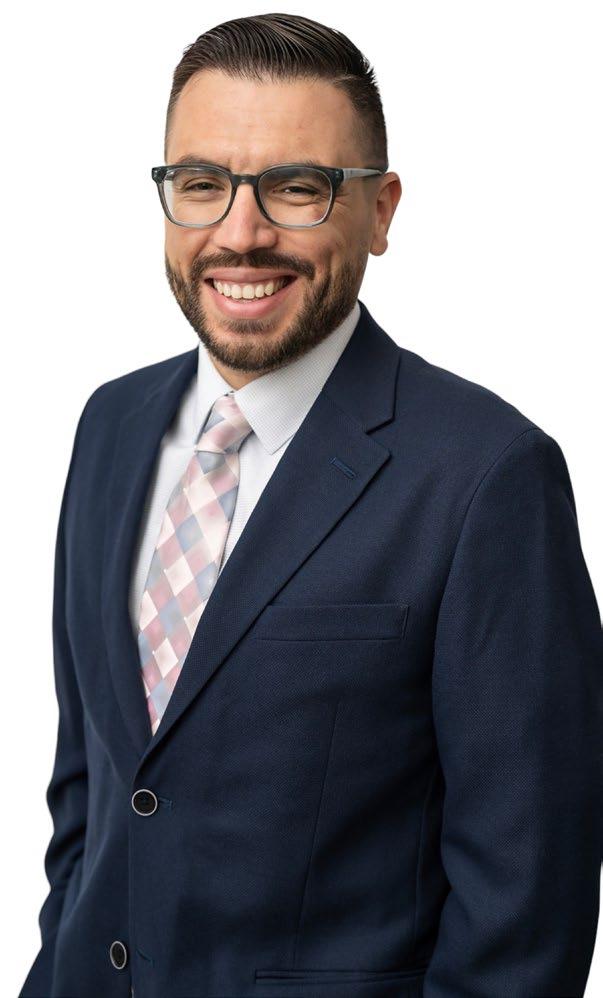
Dropbox promoted Fernandez to head of supply chain in March 2022. He orchestrates its global manufacturing efforts and lowers the supply chain risk abroad, leading a team of more than twenty employees while managing its supply chain partnerships.
“Ultimately, what we’re really set on is making sure that our supply chain is delivering . . . for the hardware in our data centers that eventually are needed for our customers to be able to retrieve anything they store on Dropbox,” Fernandez explains.
Fernandez lays down the framework for the Dropbox cloud to receive
everything it relies on to store customer data, which requires him to navigate relationships with suppliers. During his time at Dropbox, he spearheaded the growth to more vendor partnerships to source the hardware and services needed to support Dropbox’s Cloud Infrastructure so that Dropbox did not have to rely on a single supplier.
“You have to actually foster relationships with those partners at executive levels to make sure that you are not just top of mind, but that you’re also providing value in exchange for the help that you provide each other,” Fernandez says.
Once COVID-19 hit the US and caused shortages, Fernandez proved he was playing chess, not checkers. By positioning Dropbox to leverage its new suppliers and vendors, the company was able to overcome supply chain woes during the pandemic. He provided Dropbox’s manufacturing facilities in Asia with more sources of supply and transportation solutions to deliver hardware to the US.
However, Fernandez comments on how hiring the right job candidates proved to be
just as effective. “Building that team with that [supply chain] passion altogether has also been, I would say, [a] multiyear journey at Dropbox,” Fernandez says. “It’s taken years, but I’m satisfied that we’re where we are today and [about] where we’re going.”
Of course, COVID also challenged managers and executives, Fernandez included, to grow as leaders. Like many decision makers, Fernandez deployed a collaborative leadership approach that catered to the needs of his team. Yet despite spending the previous decade as a supply chain manager at household brands, he sells himself short.
“I would say at the beginning of COVID, I would still probably label myself a little bit of a newer manager and people leader,” Fernandez says. “There’s a transition and evolution that you have to go through, [in] which you go from [an] individual contributor and more execution-oriented to more of an enabler of your team. I was definitely on that journey, but I think it [COVID] accelerated that.”
Whether or not you consider Fernandez humble for passing up a victory lap, he lets
“You have to actually foster relationships with those partners at executive levels to make sure that you are not just top of mind, but that you’re also providing value in exchange for the help that you provide each other.”

Hybrid work is here. It’s there. It’s everywhere. But for everyone to be able to work from everywhere, there has to be someone, somewhere working to make sure everything is safe, secure, and consistent. So go ahead, log in from anywhere assured that someone is there making hybrid work, work for all.
cisco.com/go/hybridwork

his actions do the talking. He opens doors for Hispanic and Latino talent to land opportunities in tech.
“Essentially, all the Latino organizations [and] all the business organizations, what we try to do is bring to attention those open requisitions [for] those jobs available at Dropbox to those organizations,” Fernandez says. “Then of course, within my inner circle, that’s probably where I do most of the work nowadays, just because I find it more effective to highlight those opportunities that we have in Dropbox to my network of Latino MBAs or Latino business folks that I’m familiar with.”
On top of going to bat for Hispanic and Latinx candidates in front of Dropbox hiring managers, Fernandez mentors candidates to boost their career opportunities. But it’s the barriers beyond their résumé that deserve attention: Only 1.3 percent of executives at large companies in Silicon Valley are Latinx. Fernandez acknowledges it was worse before COVID across the industry.
“In the past, probably pre-COVID, some of the bigger challenges were the talent pool,” Fernandez says. “Is the talent pool in the Bay Area? Because it has [had] to be local.”
Meanwhile, after Dropbox moved to a virtual first working model in 2021, it has recruited more talent beyond the Bay Area. And Fernandez judges that this decision is bringing more opportunities to Latinx candidates across the industry.
 Congratulations Refugio Fernandez and Dropbox for the well-deserved recognition. The knowledge that Refugio and his team bring positions Dropbox for continued success as they enable critical network transformation to support their increasing customer base. Cisco is proud to support Dropbox’s mission to empower remote work and collaboration globally.
Congratulations Refugio Fernandez and Dropbox for the well-deserved recognition. The knowledge that Refugio and his team bring positions Dropbox for continued success as they enable critical network transformation to support their increasing customer base. Cisco is proud to support Dropbox’s mission to empower remote work and collaboration globally.
With an eye to his community, Raoul Cantero has blazed a trail for diverse lawyers at White & Case and beyond
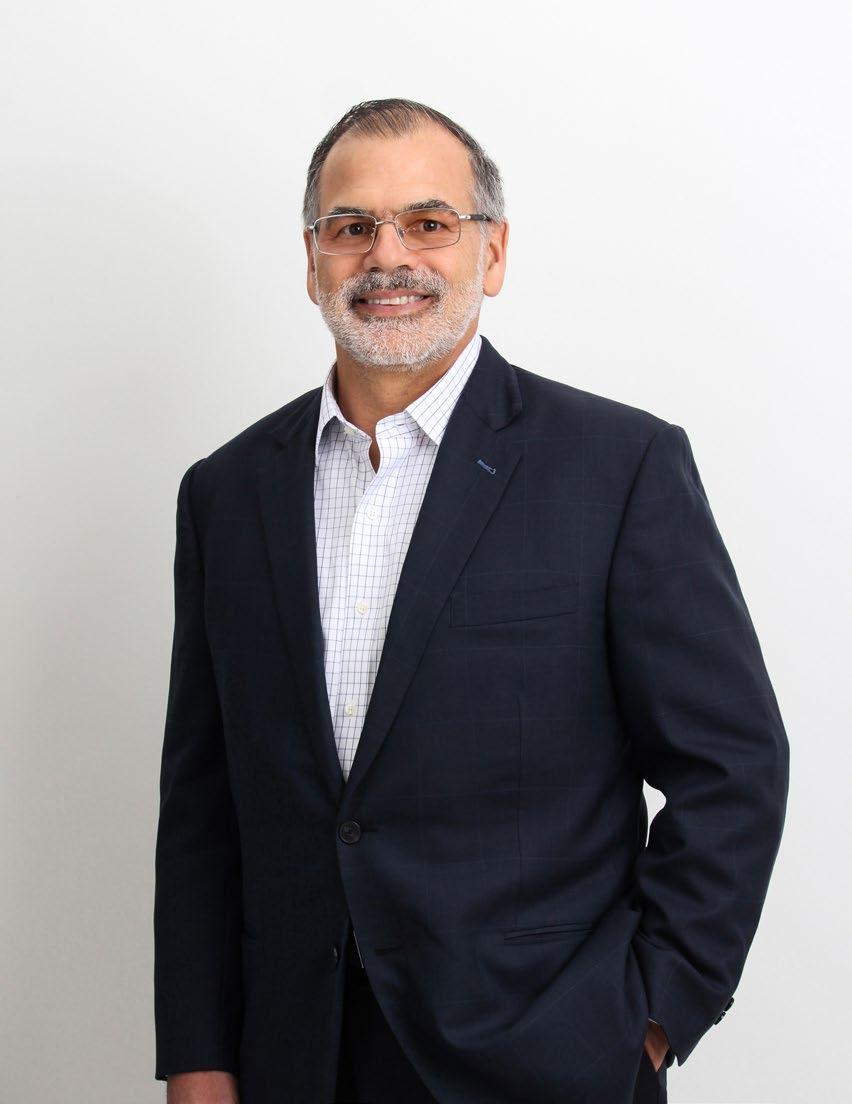
BEFORE RAOUL CANTERO BEGAN breaking barriers, he was just another high school senior trying to get by. His parents had been divorced since he could remember. For years, he lived with his mother during the weekdays and with his father on weekends. But when he started dating his then-girlfriend, he discovered light at the end of the tunnel.
“Her family brought me a lot of stability, and she did,” Cantero says. “We got married after my first year in law school. She’s kept me very grounded. She’s responsible, really, for my faith. So probably my faith and my wife have more to do than anything else with where I am today and who I am.”
Cantero attended Florida State University and his girlfriend attended the University of Florida, two hours away. After years of a long-distance relationship, they were married after his first year at Harvard Law School. They celebrated forty years this June.
After law school, Cantero served as a law clerk to a federal judge before receiving a Fulbright scholarship to Panama to pursue creative writing. He then spent fourteen years at law firm Adorno & Yoss in Miami. When he began at the firm, he was its thirteenth lawyer. By the time he left, there were 250. In
2002, Governor Jeb Bush appointed him to the Florida Supreme Court. He became the first justice of Hispanic descent.
“It was amazing,” Cantero says. “I was only forty-one at the time, and to be appointed to the [Florida] Supreme Court was a very difficult process. And it was a big honor.”
While Cantero sat on the Florida Supreme Court, he heard hundreds of appeals and authored over a hundred opinions. He also chaired its Commission on Professionalism and spoke about the standards of conduct that licensed lawyers needed to follow across the state.
“We wanted to make sure that the standards of professionalism were being [met by] the new law school graduates, the new members of the bar. So I gave a lot of speeches about that around the state,” he says.
Even as Cantero was blazing a trail for Hispanic legal talent, his wife and kids
struggled adjusting to life in Tallahassee, Florida, where less than 4 percent of the population was Hispanic or Latino. His children experienced racism and xenophobia in school. When his daughter developed a tumor that went undiagnosed for months, they realized how much they missed the support of their family in Miami.
“My kids went through a lot up there,” Cantero says. “They felt a lot of discrimination. It wasn’t the same for me because I was on the court, so I was kind of insulated from that. But they were called names. They were told to go back to Cuba, to get on their raft, and worse.”
Plenty of people talk about prioritizing family over career ambitions, but Cantero followed through. In 2008, he moved his family back home to Miami and joined the law firm White & Case. Since his arrival, he’s represented clients in two hundred
appeals and has participated in nearly a hundred oral arguments.
Cantero is now the executive partner of the firm’s Miami office. His proudest work was during his five-year chapter as chair of the firm’s Global Diversity Committee. During his tenure, the firm ranked number one in American Lawyer’s Diversity Scorecard and has now been ranked in the top ten for fifteen consecutive years. He and the members of the Diversity Committee reimagined how White & Case recruits minority lawyers.
“We’re not recruiting anyone just because they’re a minority, but we realize that, for many reasons, the best law school recruits are not always found in the top law schools,” Cantero says.
Implementing a new recruiting strategy to search beyond the gates of Harvard, Yale, and Stanford for diverse legal talent, Cantero and his teams branched out to seek the top students at public law schools.
“Sometimes you don’t find lawyers of different ethnic groups in the obvious places. Especially if they’re coming from low-income or underprivileged backgrounds, you may not find them in an Ivy League school,” Cantero says. “They may have not been able
“We realize that, for many reasons, the best law school recruits are not always found in the top law schools.”
to afford it, or they’ve had to stay in their home community with family. So we started trying to recruit the best law students that are also from outside the top twenty-five schools, where we think we can find gems.”
This formula has proved successful. Cantero shared as an example a summer associate who joined the Miami office from Florida International University, a Miami-based public university located near where Cantero grew up. In the most recent rankings, FIU ranked 98th among US law schools, and more than two-thirds of the students at FIU are Hispanic.
whitecase.com/diversity
“She worked out very well,” Cantero says. Under Cantero’s leadership, White & Case also joined the SEO Law Fellowship Program, which helps historically underrepresented law students thrive in law school and in corporate law firms. Through the program, SEO fellows complete extensive academic training and professional development, work as a summer associate at the firm before starting law school, and receive first-year academic support to ensure their success.
Meanwhile, one thing is clear: Cantero’s loyalty to his familia and comunidad is unwavering.
Our diverse community of legal and professional staff at White & Case are a source of strength, vital to our ability to represent and advise clients across the world.
Mario Cabrera didn’t want to become someone else to get ahead, and he didn’t have to at Boehringer
Ingelheim Mario Cabrera
Head of Marketing-US
Pet Business
Boehringer Ingelheim
Mario Cabrera
Head of Marketing-US
Pet Business
Boehringer Ingelheim
MARIO CABRERA FOUND HIMSELF AT a crossroads in which he didn’t want to be. He was a rising marketing director at an inflection point in his career, but when he looked around, he didn’t see many people like him being promoted. And he was getting some terrible advice on why that was happening.
While at an all-hands meeting that was becoming increasingly jam-packed, Cabrera stood up to let a VP who had arrived late sit down. It was the appropriate thing to do. It was the humble thing to do. And Cabrera was told repeatedly that it was the wrong thing to do.
“I’m from Guatemala, and the values I was raised with immediately told me to respect my elders and my superiors,” Cabrera explains. After getting invited to a leadership training sponsored by the National Hispanic Corporate Council (NHCC), Cabrera shared his feelings and proclaimed that if it was going to take him being pointlessly cruel to get ahead, he didn’t want to.
A decade later, as Cabrera sits as head of marketing for US Pet Business at Boehringer Ingelheim, he’s grateful for the mentorship he received from likeminded Latinos, people who understood the strange and competitive environment that may seem foreign to Latin Americans for so many good reasons.
It’s why he now sits on the board of directors for the NHCC, the place where he learned that he didn’t have to change to rise in his field. He didn’t have to become someone he didn’t want to be. He simply needed to find the right home for his career.
A year later, a job opened at Merck Animal Health that Cabrera thought he would be perfect for. As luck would have it, one of the mentors from an NHCC training, David Gonzalez, had moved there as well, and was able to help Cabrera score an interview just days later.
“The type of networks that we as Hispanics can easily build are so important,”
Cabrera explains. “This is someone I met and who served as a great example. At some point, I’m going to be able to repay that favor to someone else.” The job set up Cabrera perfectly for the role at Boehringer Ingelheim, where he has been the head of US Pet Marketing since 2019. There, he has been promoted while being himself.
The animal health business is not one that Latinos have instinctively flocked to. But at Boehringer Ingelheim, Cabrera says, the work the company has done to create new pipelines for talent is paying incredible dividends.
“It’s so easy for me to just open up to my network when looking to bring in diverse marketers,” Cabrera says. “We’re not just looking to the same Ivy League schools and the same firms to source talent. This has nothing to do with activism. It’s about reflecting the customers that we serve.”
It may not be activism, but there is intention at play. For example, for a recent television ad, Cabrera sought out people of color, because he knows it’s an industry that needs more representation.
There’s a human element that Cabrera is also looking to impact. “We are extremely proud of our work with Mario and his team at Boehringer Ingelheim Animal Health,” says Magali Sartain, SVP and managing partner at Wunderman Thompson. “Mario is passionate about supporting veterinarians and pet owners in the Hispanic community so the pets receive the quality care they need.”
Through his involvement in Boehringer Ingelheim’s Latinx BRG, Cabrera has been able to become more educated about the brutal cost of counterfeit pharmaceuticals as it pertains to people from poor and underserved communities.
“The values they were raised with are what make them who they are, and they should be celebrated.”


We are in the inspiration business. Through creativity, data, science, and technology, we inspire more meaningful connections between people and brands to change behavior and ultimately improve health outcomes.
Health
wundermanthompson.com









Desperation can breed a willingness to take a gamble on medications that may not be prescribed or sold at reputable outlets, and Cabrera offered up one awful example of the results.
“I learned about a young girl that died because she was treated with counterfeit drugs that her family didn’t know weren’t real,” Cabrera says. “And so my goal is to help my community understand that there are safe ways to access medication. This is a very prevalent issue, and I just want to help Latinos and other underserved communities avoid this kind of heartbreak.”
Again, this is where Cabrera’s network can be key. Through his connection to the NHCC board, he can collaborate with executives from leading companies to help source solutions to a very complex problem.
Sitting on the board of the NHCC is a full-circle moment for Cabrera. As the Latino population of the United States continues to rise, Cabrera’s role as an ally, advocate, and source of wisdom for rising talent is only going to increase. It’s an incredible leap forward for the son of an Air Force pilot from humble beginnings and a homemaker who gave up graduating from high school to take care of her family.
“I thank God that my parents brought me to the US to be educated, and for the mentors who have helped me along the way,” the head of marketing says. “I just want to continue to give back to others however I can, and help others embrace who they are. The values that they were raised with are what make them who they are, and they should be celebrated.”
“The type of networks that we as Hispanics can easily build are so important.”
THE YEAR 2022 WAS A GOOD ONE FOR real estate company JLL: it was named one of Newsweek’s “Most Responsible Companies of 2022,” Ethisphere’s “World’s Most Ethical Companies” (for the fifteenth straight year), and the Wall Street Journal’s “Best-Managed Companies of 2022.” It’s clear JLL continually finds new ways to positively impact the world inhabited by its 98,000 employees.
In December 2022, JLL Capital Markets announced that it had helped secure $16.33 million for a Santa Rosa, California affordable housing project located at the Cannery at Railroad Square. The project is the first Freddie Mac non-LIHTC (low-incomehousing tax credit) loan completed in partnership with the state of California’s Housing Accelerator Funds.
The 129-unit build, slated for completion in 2024, is 100 percent affordable housing focused on transit-oriented housing units, which are desperately needed. Santa Rosa lost
a significant amount of housing in the 2017 Tubbs Fire, a wildfire that, at the time, was the most destructive in California history. It destroyed more than 4,643 structures, more than half of which were Santa Rosa homes. The loss accounted for 5 percent of total housing in Santa Rosa and cost the city $1.2 billion.
The Cannery at Railroad Square is located next to both dining and shopping outlets and boasts train access to forty-five miles of railway across the Sonoma-Marin area.
Anson Snyder, senior director at JLL Capital Markets, spoke to both the partnership with Freddie Mac and JLL’s commitment to the project in a press release.
“Freddie Mac is an excellent partner. With interest rates and construction costs rising, Freddie Mac offered loan terms and pricing that make the transaction feasible,” Snyder said. “The Cannery at Railroad Square is an affordable housing community that JLL is proud to be a part of.”
These are the sorts of projects that Manuel Vazquez, VP and team lead of work dynamics at JLL, loves most. He has nearly thirty years of expertise in facilities, construction, and project management, and at this point in his career, he’s focused on working on behalf of communities that have been underrepresented for far too long.
Since joining JLL three years ago, Vazquez has rebuilt his team, mentoring at every opportunity to create future leaders. He’s working to hire more local contractors and those from underrepresented communities, employing women- and minority-owned general contractors whenever possible. It’s a small but important component of Vazquez’s
broader hope to create more sustainable, meaningful, and empowering work for his team and vendors.



Along with creating spaces across the world, JLL has also contributed to environmental efforts in Chicago. The organization signed up volunteers for the Chicago Parks Foundation, lending employees to help clean up parks across Chicago.
“JLL encourages employees to give back to the communities where they work and live,” Caitlin Lutz, a project manager at JLL, told the Chicago Parks Foundation. “JLL has headquarters in Chicago and is committed to investing in Chicago. Chicago parks have helped us all get through the COVID pandemic.”
e Excel Group is proud to be a JLL Partner on the Construction Adventure.
International businesses present unique challenges— and opportunities—for corporate citizenship in multiple countries. The executives featured here thrive in navigating cultural shifts worldwide.
182. Joe Mella, Goldman Sachs 188. Angelica Rodriguez, Spirit Airlines 192. Maurice Perkins, Transamerica 195. Anthony Redondo, Blackhawk Network 200. Rosa V. Estrella, Astellas Pharma 206. Luis Ceballos, PwC BY ZACH BALIVAJoe Mella has learned many lessons over his nearly four-decade tenure with Goldman Sachs. The biggest? Courage, commitment, and an adventurous spirit bring results.

AFTER MORE THAN THIRTY-FIVE YEARS at Goldman Sachs, Joe Mella still has the sense of adventure that originally brought him to the well-known financial services firm.
Logging several decades at one employer did not seem possible to a young Mella, back then an eager student with an unending thirst for forward movement. Mella studied engineering at Rutgers University and took an internship at Johnson & Johnson. But he filled the summer months mowing lawns and washing dishes. He worked as a soda jerk, landscaped cemeteries, and even sold vacuums door to door.
Most of the jobs were just a means to an end and a way to earn some extra pocket cash, but one temporary job changed Mella’s life forever. He took a gig in the back-office operation at a bank. Watching the finance pros conduct business and seeing the speed of activity dazzled Mella. He learned a bit about Wall Street and, suddenly, a whole new path opened before him. Mella realized
he wanted to move away from engineering and toward finance.
Leaving what he knew for something unknown represented a risk, but Mella was willing to take the leap. He accepted a job in the controller’s department at a growing private company with about five thousand employees. The year was 1987 and the company was Goldman Sachs. Today, Mella’s risk has paid off. He’s enjoyed a long career and is a vice president in the corporate and workplace solutions division, focused on strategic outsourcing opportunities.
Mella entered the Goldman Sachs ecosystem around the time of Black Monday. October 19, 1987 saw the first modern worldwide financial meltdown after the Dow Jones Industrial Average plummeted by more than 20 percent in just one trading session. “There was a lot going on when I first came to Goldman, and I had the good fortune to be able to observe how some of the leading thinkers of the time responded to global
events,” Mella explains. As Goldman Sachs grew, Mella—always the adventurer—took on more responsibilities at the firm and found himself developing skills in many different niche areas.
After a decade spent in various roles, leaders at the investment bank asked Mella to move across the Atlantic to London, where he led several international expense management departments. What was supposed to be a twelve-month assignment lasted for four years. Leading a European team as an American posed several challenges for Mella to navigate, but the experience gave him new leadership tools. “Whenever you accept an unexpected assignment and take on something new, you acquire expertise you can later leverage in meaningful ways,” he says.
After roles in the finance, operations, and technology divisions, as well as working in human resources as glob-

al head of recruiting, Mella became chief of staff to the controller and chief administrative officer for the finance and risk divisions. Now, he is leading strategic outsourcing for the firm. The strategic sourcing department finds and creates value, improves leverage in strategic areas, and identifies commercial advantages for Goldman Sachs. The bank has approximately $2.4 trillion assets under supervision and about 49,000 global employees.
While company loyalty was once common, it’s less popular today. Mella, however, says he’s had no reason to venture outside of his long-time employer. “The firm has provided a stable foundation that I’ve developed in. It’s flat and united. Leaders are approachable at all levels, and there is always something new to do, learn, and experience,” he says. When Mella lived in London, he led teams in Germany,
Whenever you accept an unexpected assignment and take on something new, you acquire expertise you can later leverage in meaningful ways.”
At Deloitte, we believe it is important to celebrate outstanding leaders in our communities who make a difference. Congratulations to Joe Mella of Goldman Sachs on being recognized for his outstanding leadership and business achievements.
In addition to being a leader at Goldman Sachs, Joe Mella is a devoted husband, dedicated father, passionate board member, and tireless volunteer who lends his talents to causes that elevate Latinos. Balancing his many commitments and staying effective is never easy, but Mella has developed best practices that help him succeed:
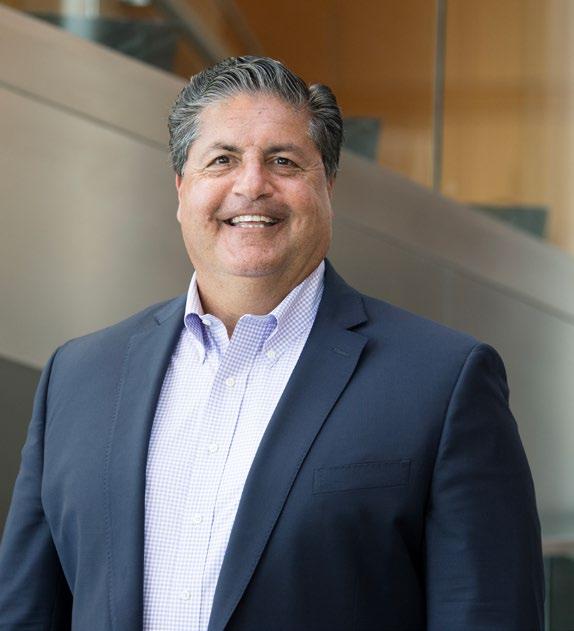
• Be true to yourself. Enjoy what you’re doing and who you’re with.
• Delegate. Collaborate and allow others to grow.
• Be nice to everyone. Lift while you rise. Be available.
• Network, but be sincere. You never know who may help you or whom you may be able to help.
• Commit. Add meetings to your schedule and don’t change them.
• Be present. Leadership comes down to presence.
• Be active. Don’t just join a board, be active on a board.
• Practice gratitude . If you have a supportive family, tell them you appreciate them.
Italy, France, and Switzerland. He’s also been to China, Japan, Africa, India, Singapore, and elsewhere.
Mella has walked away with more than a worn-out passport; he also has amassed experience that can help other people and groups chart their own courses. The leader is on several boards including St. John’s University, the Association of Latino Professionals For America, and the Hispanic Association of Colleges and Universities. He also served on the board for the US Hispanic Chamber of
Commerce for six years and was an advisory board member at the New York Times and Pace University.
In his role, Mella finds commercial advantages to do things with improved value by eliminating costs or freeing up resources in new ways. The creative work requires deep internal relationships and legacy knowledge of the bank, making Mella the perfect person for the job. He’s harnessing his long career history to prioritize work and create the greatest value for the firm going forward.
“KPMG proudly joins Hispanic Executive in recognizing Joe as a talented, highly regarded professional. Joe is hard-working and enthusiastic and is an impactful mentor and board member to the organizations he supports. We value our relationship with Joe and look forward to continued partnership.”—Jitendra Sharma, KPMG Global
Lead Partner
“I extend my congratulations to Joe Mella for the well-deserved recognition as an outstanding leader at Goldman Sachs. It is a pleasure working with Joe and his team at Goldman.”—Sam Lowenthal, Deloitte Lead Client Service Partner

With fourteen years under her belt at Spirit Airlines, Angelica Rodriguez seeks to inspire and guide the next generation of Puerto Ricans
BY BILLY YOST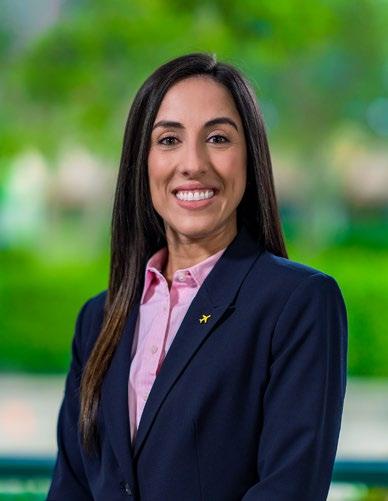
IN MARCH 2009, ANGELICA RODRIGUEZ came to a small, twenty-eight-airplane airline as a senior financial analyst. That airline, like Rodriguez, has done quite well in the intervening years.
Spirit Airlines is now a $4 billion business with nearly two hundred planes, ninety-one destinations, and its own spot on the New York Stock Exchange. Rodriguez, nearing her fourteenth year, has been promoted four times to her current role as director of revenue accounting and the 2023 leader of Spirit’s Latinx Council Group.
It’s easy to see Rodriguez’s endurance and success with Spirit as just another American dream, one that even includes casual weekend flights with her pilot husband to far-off and exotic locales. Rodriguez is charming, gregarious, and incredibly thankful for where she is in her life.
But it wasn’t always so easy or perfect, and the director’s story and dedication to positively influence the future of Latino leadership is something to be recognized and celebrated.
Rodriguez grew up in Toa Alta, Puerto Rico, a small city thirty-four minutes to the west of the capital of San Juan. With two siblings, including a twin sister, Rodriguez grew up with a tight family budget and two working parents. And no matter how late Rodriguez or her family returned home from San Juan, her mother was always prepared to cook a full family dinner.
“My parents were my inspiration,” Rodriguez says, “and my mother was my role model. She drove us everywhere we needed to be while working full time. I wanted to be like her, and staying home just wasn’t an option for me.”
In her later years of high school, Rodriguez showed interest in pursuing a degree in business administration with the goal of opening a bed and breakfast in Puerto Rico. But after being accepted into an internship in Florida, Rodri-
guez had her eyes opened to a new culture in the mainland. It was a wonderful experience but along the way she encountered many challenges.
“I still have a fear of public speaking because I used to be ridiculed for my accent,” the director says. “After the internship, I went back to Puerto Rico to finish college knowing that many more opportunities awaited in the States. I knew I needed to try again.” After finishing her college degree in accounting and becoming a certified public accountant (CPA), Rodriguez accepted an offer with the federal government in Florida.
It’s important to note that Rodriguez was making every single move entirely on her own. She counted every penny and
leaned on her credit card more than she was comfortable with, but she found her way.
As Spirit has grown, so have Rodriguez’s roles and responsibilities. After coleading the Spirit Latinx Council for the past two years, she is taking on the leadership role for 2023.
“I’m really looking forward to [2023] because the council has matured,” the director says. “Our first year was more about listening. But now we’re able to take action on the issues that matter to our team members like participating in community and charitable events and engaging in networking and career development.”
In 2021, Rodriguez was invited to travel to Puerto Rico with Spirit’s CEO Ted Christie to celebrate the twentieth anniversary of the airline flying to San Juan’s Luis Muñoz Marín International Airport. It was an incredible moment for Rodriguez to be back in the place where she grew up.
At a get-together with Spirit team members in San Juan, the director had the opportunity to hear the stories of young employees weathering Hurricane Maria. Rodriguez may not have been there at the time but understands the hardships as she couldn’t communicate with her own mother for five days.
“As I heard these stories it reminded me of my own childhood, when I had to study by a candle or flashlight after hurricanes shut down power for weeks. I sort of broke down when it was my turn to talk, and I just couldn’t,” Rodriguez says.
Rodriguez was so filled with pride by these stories and what the team members, like her, had overcome to get to where they are today that she was left speechless. Both the CEO and everyone she was speaking to understood. It’s a moment the director will never forget.
“Elavon and U.S. Bank have a strong relationship with Spirit Airlines. We have
a better appreciation for Angelica Rodriguez’s story, but we are not at all surprised by her success,” says James Kirkeide, vice president for global airline acquiring at Elavon/U.S. Bank. “Like Spirit, we put a premium on diversity, equity, and inclusion. We will continue to be champions for Angelica and others who seek rewarding careers in high places.”
Rodriguez admits she would love to see these eager team members grow professionally without leaving their island, but she understands the call of opportunity, one she herself answered.
Rodriguez’s story can be summarized in a quote from Roman philosopher Seneca: “Luck is what happens when preparation meets opportunity.” She was able to seize the opportunities presented to her thanks to her academic preparation and dedication to her career.
As I heard these stories it reminded me of my own childhood, when I had to study by a candle or flashlight after hurricanes shut down power for weeks. I sort of broke down when it was my turn to talk, and I just couldn’t.”

Maurice Perkins works to ensure that all voices are heard at Transamerica—both in his day-to-day global work and in spearheading the creation of the company’s Hispanic employee resource group

MAURICE PERKINS HAS REASON TO BE proud of his career. The first-generation Cuban-American worked on behalf of the George W. Bush presidential campaign as a foreign policy expert for the Western Hemisphere. He then went to work on the Foreign Relations Committee and the Banking Committee, both for the US Senate. He’s lobbied for the interests of the US life insurance, retirement, and asset management industries at the highest levels of government.
Since 2017, Perkins has headed global government and policy affairs for Transamerica and its parent company, Aegon, and he has added Transamerica’s communications and brand teams to his corporate leadership role. As the company’s first chief corporate affairs officer, Perkins is proud that the company is pushing for more representation for underrepresented communities.
“Our Hispanic ERG, HOLA, is a great example of us tuning into our diverse employee base, and our colleagues stepping up to do something as a force for good,” Perkins says.
“HOLA is highlighting the common bonds Hispanics have and how we can use that to influence our talent acquisition, retention, and recruiting processes.”
Perkins says Transamerica now boasts over a dozen different employee resource groups (ERGs) across the organization, from Baltimore to Cedar Rapids to Denver. Transamerica’s north star, “Live Your Best Life,” can only be achieved if employees feel seen and heard, and Perkins says he’s proud of how the company has evolved over the course of his tenure.
“On our first call for our HOLA ERG, there was so much energy and enthusiasm and a collective question about what took so long,” Perkins recalls. “There has been so much great momentum that we didn’t want to lose, even with the onset of the pandemic, and we’re seeing some incredible things happening right now.”
HOLA is in the process of connecting with Hispanic leaders, celebrities, and other people of influence to speak at ERG events.
While Perkins spearheaded the project, he’s quick to give credit to HOLA leaders Brandi Cruz (lead management specialist) and George Vega (chief technology officer). Perkins notes that they have demonstrated tremendous leadership, guidance, and enthusiasm for HOLA—and it shows in how they talk about it.
“First, I love the brand,” Vega explains. “What better way to greet, invite, and involve our colleagues than with a simple hello/hola? Working with Maurice and the rest of the ERG leadership team to retain, attract, and network across our organization is exciting. HOLA is the newest ERG group at Transamerica, so effectively we are a startup. Growing organically and shaping this network and focus is exciting.” Cruz concurs.
“To be part of the group of leaders to drive the build of HOLA has been a unique opportunity to help increase awareness of the Hispanic culture and value each of us present as an individual, employee and customer,”
Cruz says. “I can’t wait to see the impact our ERG will have in supporting and driving the advancement of the Hispanic community.”
Perkins’s own Latino roots run deep. Spanish was his first language and he remembers being picked on in preschool for not yet having mastered English. His mother and father were both born in Havana, and their families fled Cuba after the Communist Revolution in 1959. Perkins’s father was an airline pilot, and so the future executive grew up traveling throughout South and Central America, including Argentina, Chile, Brazil, Ecuador, Peru, Costa Rica, Panama, the Caribbean, and Mexico.
“While I would work a great deal on US-Latin America policy and trade issues when I got older, I had already physically traveled to all of these places growing up,” Perkins explains. “I was endeared to their cultures, and I experienced the best that these places had to offer, not just strictly from a Miami-Cuban perspective.”
His globetrotting extends beyond the Americas: Perkins lived in Paris, France, for two years in high school. He also moved to the Netherlands during the summer of 2018 with his family shortly after coming to Transamerica, which is owned by multinational life insurance company Aegon, headquartered in the Hague, Netherlands. Although he’s now based in Washington, DC, he says his time in Europe made managing teams located on the continent far easier when it comes to understanding cultural and regulatory differences.
For those looking to lead global teams, Perkins offers sound advice—which he himself has received.
“If you want to be successful in a global role, you really have to rely on the strength of the teams in your country units,” Perkins advises. “It’s as simple as that. Help consolidate everything you need to know with regard to different regulatory environments.”
It’s easy to understand why Transamerica and Aegon wanted Perkins. He’s worked
closely on policy and regulatory issues with the US Congress, US Executive Branch, and multilateral financial institutions like the World Bank, International Monetary Fund, and Inter-American Development Bank (whose members are comprised almost entirely of Latin American countries). He’s worked extensively with several world governments, particularly in the Americas and Europe. After working on behalf of the insurance and retirement industry for twelve years at the American Council of Life Insurers, Perkins saw fit to get a new perspective on the business side of insurers.
Perkins continues to share the patriotism that brought his parents here. “The United States has been incredibly welcoming to my family and my parents’ generation,” Perkins says. “I’m eternally grateful to my parents for allowing me this opportunity, and to grow up in a place that affords anybody the opportunity to work hard and succeed.”
If you want to be successful in a global role, you really have to rely on the strength of the teams in your individual country units.”
For the past twelve years, Anthony Redondo has aided Blackhawk Network’s expansions. Now, he emphasizes trust in leading his teams to do the same.

ANTHONY REDONDO HAS THE HEART
of a hustler. Growing up in New Jersey, he watched his dad work odd jobs that were open to someone who didn’t hold a high school diploma. His dad studied for and earned his GED while Redondo was in high school, and he went on to pass the boilers exam and work in the school district for twenty-five years.
Redondo was inspired by his father’s work ethic, but from the age of seven, he wanted to do something different in his life: be an accountant.
After earning his bachelor’s degree in accounting, Redondo built his expertise at PricewaterhouseCoopers, Tiffany & Co., and Protiviti before joining Blackhawk Network in 2010.
The vice president of global accounting operations and treasury spoke with Hispanic Executive about why he’s stayed at Blackhawk for more than a decade, the organization’s evolving global operations, and the importance he places on trust and lifelong learning.
What has kept you with Blackhawk for twelve years? Can you highlight some of the growth you’ve experienced over that time and what keeps you motivated? Blackhawk has always challenged me, and I am always building my résumé. I was hired to start the internal audit department for a subsidiary of a large public company that was in a pre-IPO stage. I built the team and in 2013, Blackhawk went public. I was now a chief audit executive for a public company.
While public, we expanded globally through organic growth and acquisitions. In 2018, we were acquired by a private equity firm and were taken private. After the acquisition, I was able to expand my role to help the CFO’s organization by taking on some high-visibility projects.
Fast-forward to the beginning of 2022, and I have been challenged again and asked to oversee settlement, accounts receivable, accounts payable, treasury, insurance, and payroll. Additionally, I have also taken on
the task of managing global real estate and working with executive management on strategic property management.
Could you talk about some of the current initiatives you’ve focused on, like helping the organization truly become more globalized?
As a company that continues to expand globally through organic growth and acquisitions, it is critical to have processes and standards. It is sometimes challenging to get everybody to follow a standard because there are different systems, laws, and other unforeseen challenges. If you do not make it a priority to globalize, it will never be done.

There are a few things that we have done to support globalization, and it all started with the change mindset and appointment of global leaders, followed by the implementation of systems and tools to support a global structure. Blackhawk’s global expansion as a leader in digital payments, rewards, and commerce has been an incredible growth story that I am proud to be a part of.
What is your approach to helping people feel like they are a part of something bigger?
I have always been a people person, and I have always liked talking with people, organizing events, and helping people develop. In general, one challenge that companies have is that they do things to give the illusion of engagement, such as asking employ-
ees for feedback or conducting questionnaires, but they do not act on the feedback.
If companies do not follow through and implement change, employees will stop giving feedback, stop being engaged, and eventually, they will leave. At Blackhawk, we have intentionally cultivated and continue to nurture a culture of listening as well as recognition.
It is so critical to know your employees, not just by name or face, but know something about them. People need to know you see them and care for them.
What kind of a leader are you? What’s important to you when it comes to leading a team?
I like to think of my leadership style as supportive, straightforward, and challeng-
ing, yet compassionate. I expect a lot from people. I know we have smart talent, and I know we can do amazing things as a team and as a company. I give people the freedom and authority to make changes and drive improvements that they feel are needed. I believe that every person can and should make an impact.

The most important thing when leading a team is trust. You need to trust the team, but more importantly, the team needs to trust you. Trust is not an easy thing to get. You do not get trust by being promoted and being the boss.
A boss is very different than a leader. Anybody can be a boss. Gaining trust does not come overnight and usually comes through proving yourself again and


again but also by continuing to support the team.
Do you have any advice for someone early in their career who might see your story and hope to emulate your journey? Be hungry, never stop learning, and dream big. It will not be an easy or short road, but it will be rewarding. There will be days that are hard and there will be days that are easier. Don’t give up. Know what you want and go get it.
Surround yourself with good and smart people. You will not get where you want to be by yourself. You will need great professional and personal relationships to succeed. Find a mentor, a confidant, a soulmate— you will need them all!
“
If companies do not follow through and implement change, employees will stop giving feedback, stop being engaged, and eventually, they will leave.”
For many years, Rosa V. Estrella advanced professionally while learning the importance of her Latin roots along the way. Now that she’s fully embraced her latinidad, she’s accomplishing more than ever.
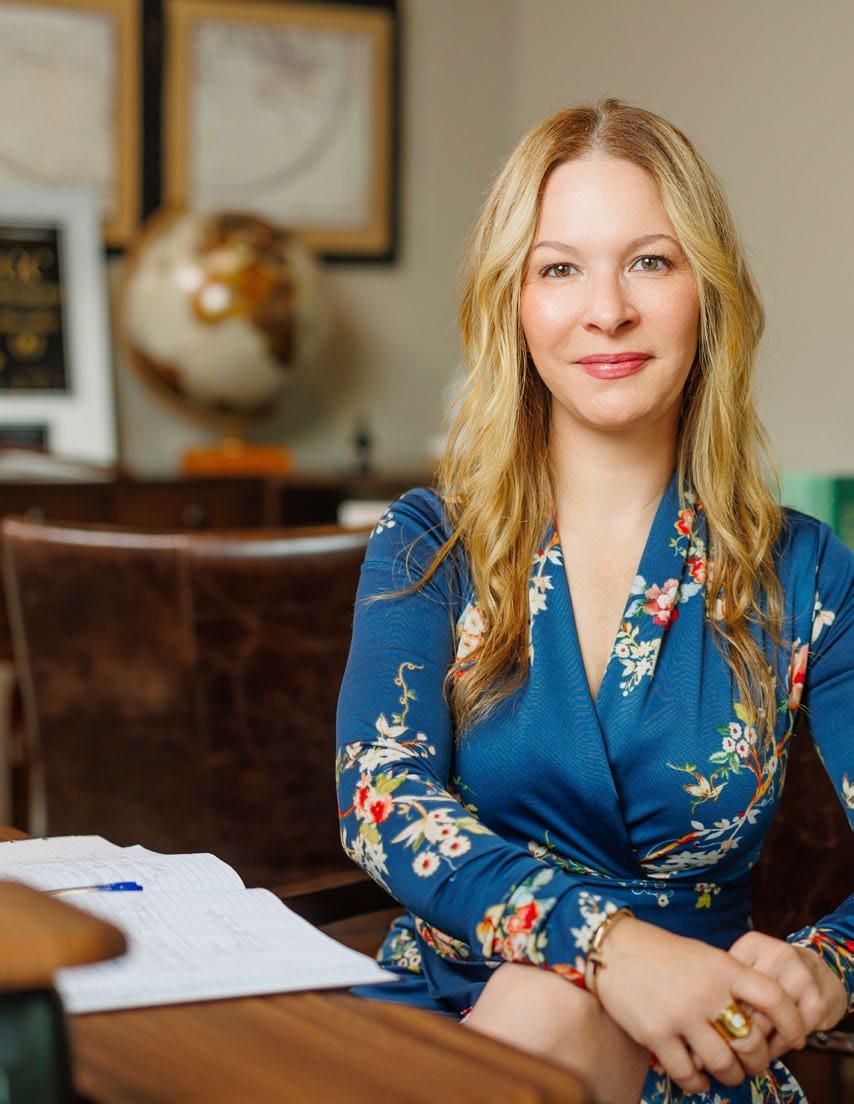
IN SOME WAYS, ROSA V. ESTRELLA HAS LIVED the Dominican American dream. She was born in La República . She moved to New York as a child and grew up in the Heights (yes, those Heights), Santiago, and the Bronx. And she’s worked her way up to the role of deputy general counsel and legal commercial lead for international markets at Astellas Pharma.
However, when she left for the University of Rochester, she shied away from fully sharing her roots. “I was probably one of the first Latinos many of my college friends knew,” Estrella says. “Even though I didn’t realize it, I don’t think I was really my true authentic self then, as far as my background.”
Of course, New York is not exactly La Romana. But in retrospect, Estrella believes that downplaying her latinidad to fit in with her new peers in school prevented her from taking pride in who she is. Still, when she began her career in corporate America, Estrella sometimes took the same tack. Why? Because she feared that claiming her identity would stunt her career growth or pigeonhole her into certain career tracks.
Over the years, Estrella rose through the ranks of legal departments at major pharmaceutical companies. She served as a senior legal counsel for Organon International supporting its business development team and Latin America operations.

Thereafter she took a job with Eisai, where she was promoted to assistant general counsel, expanding her breadth of expertise to include global manufacturing, antibribery, antitrust, and corporate governance matters.
Estrella wanted to challenge herself in a leadership role, so in 2016, she joined Astellas Pharma after being offered an opportunity to lead its Latin America legal team. Her next goal was to expand her geographical scope— which she spoke into existence—shortly adding the US. In her current role, she now runs the company’s legal teams in the International Commercial Division, covering over 132 countries across Latin America, the Middle East, Turkey, Russia, and Asia Pacific.
Despite spending years supporting Latin American clients, Estrella was still unconsciously filtering herself. That changed significantly since joining Astellas and being part of the Hispanic National Bar Association (HNBA) PODER25—a talent pipeline initiative to increase the number of Hispanic attorneys occupying senior positions within corporate legal departments.
“Being my authentic self has definitely been boosted by being part of PODER25 and Astellas,” Estrella comments, noting that the program and her company have supported her growth. “Realizing that my Hispanic heritage, my Latino-ness, is a superpower and feeling confident using that superpower in my work environment allows
me to bring my best self to work and make more valuable contributions.”
Estrella now lends her expertise to PODER25 Nexters, not only advising them on how to move ahead in their careers but also providing tools and resources to help them do so. She also leads the Astellas Hispanic Employee Impact Group, focusing on career advancement, lifting Latino youths, and finding opportunities to enhance the Hispanic patient experience. Meanwhile, Estrella is accomplishing more than ever at Astellas. She helped develop and launch Astellas’ first Legal Ambassador program, a fifteen-month rotational development program for its junior and mid-level lawyers, including a leadership curriculum developed in collaboration with Duke University designed to promote a strategic and risk-balanced mindset within the legal team.
“It’s a really comprehensive program,” Estrella says. “[I’m] really proud of it because
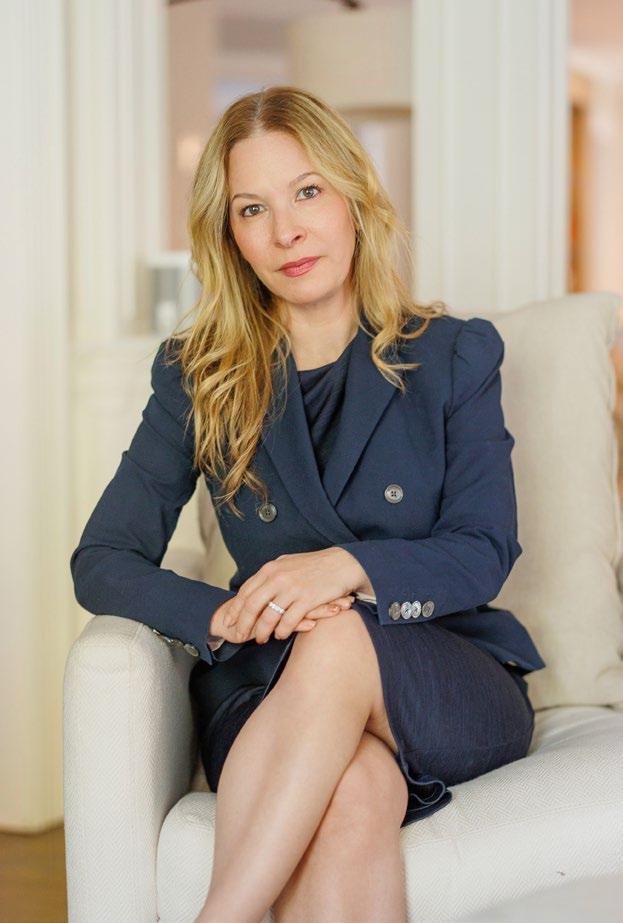
“Realizing that my Hispanic heritage, my Latino-ness, is a superpower and feeling confident using that superpower in my work environment allows me to bring my best self to work and make more valuable contributions.

it’s putting our money where our mouth is and really investing in developing our team. I can’t wait to see the feedback and hope we continue to enhance it year after year.”
In addition, Estrella’s region includes Russia; she works closely with a team of experts, to the extent permissible under applicable sanctions, to ensure the company abides by sanctions imposed by various countries while it delivers lifesaving medicines to patients in the region.

“It’s a huge responsibility for the legal department and the organization, and it’s something that we take very seriously,” Rosa says. “It involves human lives in every way. Similar to many other organizations around the world, that has been a very important matter for us this year.”
While Estrella’s responsibilities are considerable, she strives to be hands-off in her leadership—trusting her teams and mentees (as well as herself) to find the right solution for the problem at hand. After all, it was only after she learned to trust herself that she became who she is today: a successful professional who embraces all parts of her identity.
“It took some time to mature into it [Latinidad] professionally and feel comfortable in my own skin, own it, and love it,” Estrella says. “I am better to everyone for being truly who I am, bringing my full Latina self. I don’t worry myself so much about ‘Is this going to kick me back professionally?’ which is something that in the past used to play in the back of my mind a lot more.”
Jones Day: “Rosa is an excellent lawyer and we are proud of our work together. She has sound judgment, adapts quickly to new challenges, and leads by example. We congratulate Rosa on this well-deserved recognition and look forward to our continued partnership with her and her colleagues at Astellas. Way to go, Rosa!”—Jeremy Cole, PartnerJones Day proudly recognizes our friend and client Rosa Estrella. We applaud her dedication to empowering others through her work at Astellas and within the Latino community.
Luis Ceballos may hold three law degrees, but it’s his integrity that brings the most value to PwC

WHILE GROWING UP IN ARMENIA, Colombia, a mountain town nestled 4,856 feet above sea level in Eje Cafetero (the Colombian Coffee Triangle), Luis Ceballos looked up to a role model that topped all others. His father, who dedicated part of his career to practicing law, always offered consejitos (little pieces of advice) that Ceballos followed to a tee. His father reminded him to do the right thing and make the most of each opportunity.
“One of the biggest lessons that I learned from him was just don’t take anything for granted and always act with integrity,” Ceballos says. “Just be hungry, humble, and fight for each opportunity and try to do the best every time.”
Fast-forward to the present, and Ceballos still honors his father’s legacy. Not only did he become a corporate lawyer but he also joined PwC as its legal lead procurement director in 2022. He brings nearly two decades of in-house experience and legal expertise to the consulting and accounting firm, where he manages a group of licensed attorneys.
“Of course, even in my experience, I would be pretty much framed as a pharma attorney, but I think I’ve been in different industries,” Ceballos says. “My unique background, being from Colombia, and my legal training as a Colombian and US attorney made me an attorney who can work in different industries.”
On top of starting his career as a legal counsel at Inmobiliaria e Inversiones Los Andes in Bogota, Colombia, Ceballos earned law degrees from Universidad del Rosario (LLB), Washington University in St. Louis (JD), and Duke University (LLM). He landed his first US-based opportunity as a corporate legal counsel with Centurion Cargo Airlines in 2012. Then he arrived at Bristol Myers Squibb (BMS) in 2014 as a secondee attorney working with Axiom Law. Within two years of supporting BMS markets in Latin America, he joined BMS to support the global product development and supply (GPS) business unit and shortly after got promoted to chief legal counsel
for its global supply chain and facilities and engineering teams.

Ceballos discovered his knack for leadership while leading and working with teams of corporate attorneys. Whether he supported the pharmaceutical firm in some aspects of its mergers and acquisitions or directly supported its global response to COVID, they counted on him to negotiate when the stakes were high. Just consider how he left his mark on BMS’ manufacturing division by ensuring its lifesaving medicines were properly manufactured and reached patients on time even in the midst of the pandemic.
“As a member of the law department, along with my colleagues, we were able to support the business not only as legal but also as business partners to maintain supply chain and manufacturing continuity,” Cebal-
los says. “As part of [the team] supporting the manufacturing division, I was able to work on the divestiture of some of our manufacturing sites and the necessary supply agreements to guarantee that our products continued to be manufactured on these sites, temporarily, while we were able to transfer our products to another BMS site or to contract manufacturing organizations.”
Still, even if Ceballos thrives in his career, he knows what it’s like to navigate workplaces where Latino talent is underrepresented. He would love to see more employers and universities promote diversity and inclusion by hiring more early-career Latinos.
“I think it starts from giving opportunities for people getting into college admissions,” Ceballos says. “Just continue trying to give the opportunity to more diverse candidates who are qualified.”
Ceballos also explains why businesses stand to win if they hire diverse talent.
“There are several analyses and studies that conclude that the most diverse corporations are the ones that tend to succeed the most, because you get ideas from people with diverse backgrounds,” Ceballos says. “It’s just getting all the best [talent] from a diverse team (not limited to gender, racial, or ethnic diversity—



diversity has multiple forms). That’s what they need to do.”
When push comes to shove, Ceballos just gets it: diverse companies operate with 2.5 times higher cash flow per employee. However, no matter how far Ceballos is from Colombia, he takes pride in his Latinidad. Like many Latinos who move to the US and start a family, he embraces the challenge of preserving his culture for generations to come. He and his wife speak Spanish at home for their kids. And they encourage them to celebrate who they are.
“I’m trying to teach them, of course, my culture and our culture,” Ceballos says. “Even though my wife is Spanish, we have a mixture of Spanish with Colombian culture.”
Oh, and by that? He means their entire identity:
“They’re part Latino and part Spanish with Chinese blood,” Ceballos says of his children. “So that’s the mix; they need to be very proud of that. They need to show it, and when you’re confident and proud of who you are and where you come from, people from other backgrounds and cultures accept it and that’s, in my opinion, really cool.”
“My unique background, being from Colombia, and my legal training as a Colombian and US attorney made me an attorney who can work in different industries.”


